
May 7, 2016 | Non categorizzato
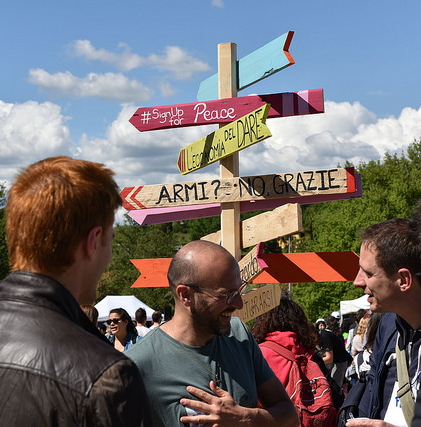 “Where was I?” was the refrain of the song inspired by the migration tragedy, and sung by the Gen Verde on the stage of the May 1 event of Loppiano (Florence). The question resounded strongly among the 1,200 participants of the feast day, but it also pertained to commitment to suffering humanity, for example in Aleppo, with the escalation of bombs and deaths which have beset the city for the last 10 days, and likewise for the populations devastated by the earthquake in Ecuador, who asked to live and return to their normal lives. It is a commitment also of the multitude of associations and initiatives operating on the front of integration in Italy. “The aim of this day – explained the Youth for a United World – is to highlight the flow of initiatives undertaken throughout Italy, in the name of reception, lawfulness, politics lived as a service, and care for the environment, which in one word means: fraternity.” “Ever since the bombings started again, a chain of solidarity has begun among the people – Tarek of Aleppo, Syria, recounted. This reveals the quality of my people, who do not give up, but whose dignity is wounded. We say, stop the war, and ask with faith for the gift of peace.» Lubna instead explains: «In Jordan there are three million refugees, half of which are Syrians. They arrive with despair in their eyes, and the absence of hope. We try to share the life of fear they have faced, by giving them love and a sense of family.» Wa’el Suleiman, Director of Caritas in Jordan, addressed the people with a heartfelt appeal in a video shoot: «Work with us to stop the war, come to the Middle East and help us rebuild our countries, so that the people do not have to escape, and emigrate. We want to live in our lands.” Nahomy and Maria are both Ecuadorians, They recounted the extraordinary strength of their people: “The pain of those who had lost all their belongings, became the suffering of all. The inmates of a prison started to build wooden coffins, people of different political ideologies teamed up together, the cooks became heroes by preparing a warm meal for everyone, and the poor shared the little they had.” A festive atmosphere and lots of music accompanied the stories of the youth who have decided to actively take part in the building of a different world. “«I am weary of clashes, and diatribes in politics and also in daily life – a boy wrote on the great “wall” on which each could leave behind that part of himself that hinders the flow of fraternity – the only things I take interest in and for which I want to live are those things that unite and not those that divide us.”
“Where was I?” was the refrain of the song inspired by the migration tragedy, and sung by the Gen Verde on the stage of the May 1 event of Loppiano (Florence). The question resounded strongly among the 1,200 participants of the feast day, but it also pertained to commitment to suffering humanity, for example in Aleppo, with the escalation of bombs and deaths which have beset the city for the last 10 days, and likewise for the populations devastated by the earthquake in Ecuador, who asked to live and return to their normal lives. It is a commitment also of the multitude of associations and initiatives operating on the front of integration in Italy. “The aim of this day – explained the Youth for a United World – is to highlight the flow of initiatives undertaken throughout Italy, in the name of reception, lawfulness, politics lived as a service, and care for the environment, which in one word means: fraternity.” “Ever since the bombings started again, a chain of solidarity has begun among the people – Tarek of Aleppo, Syria, recounted. This reveals the quality of my people, who do not give up, but whose dignity is wounded. We say, stop the war, and ask with faith for the gift of peace.» Lubna instead explains: «In Jordan there are three million refugees, half of which are Syrians. They arrive with despair in their eyes, and the absence of hope. We try to share the life of fear they have faced, by giving them love and a sense of family.» Wa’el Suleiman, Director of Caritas in Jordan, addressed the people with a heartfelt appeal in a video shoot: «Work with us to stop the war, come to the Middle East and help us rebuild our countries, so that the people do not have to escape, and emigrate. We want to live in our lands.” Nahomy and Maria are both Ecuadorians, They recounted the extraordinary strength of their people: “The pain of those who had lost all their belongings, became the suffering of all. The inmates of a prison started to build wooden coffins, people of different political ideologies teamed up together, the cooks became heroes by preparing a warm meal for everyone, and the poor shared the little they had.” A festive atmosphere and lots of music accompanied the stories of the youth who have decided to actively take part in the building of a different world. “«I am weary of clashes, and diatribes in politics and also in daily life – a boy wrote on the great “wall” on which each could leave behind that part of himself that hinders the flow of fraternity – the only things I take interest in and for which I want to live are those things that unite and not those that divide us.” 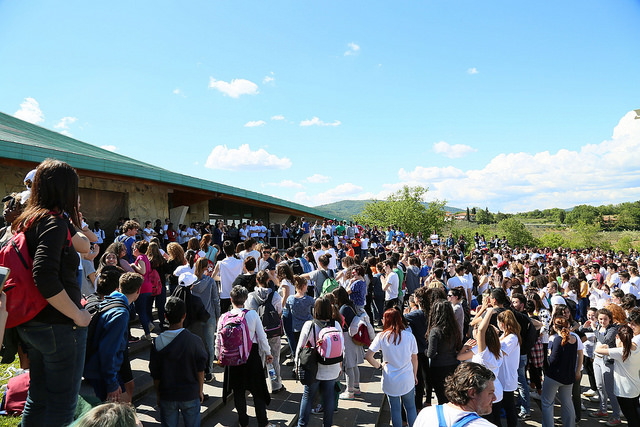 Cristina Guarda, 25, a councilor of the Venice Region, talked about the reasons that drove her to ‘go out there’: “I have always been convinced that politics is what we build when we place ourselves at the service of others. I felt that it was time to get involved.” A phrase of Chiara Lubich introduced the round table that ended the morning. “If you want to transform a city, start by uniting with those who share your ideals. Together, look for the poor, the abandoned, orphans, prisoners, those who are marginalized, and give, always give: a comforting word, a smile, your time, your goods….”. Then came an overview of a variety of ideas-projects of the Youth for a United World in Italy: in Turin, in a small dormitory; in Florence, with a group of prisoners in the Gozzini Jail; in Syracuse, with the Summer Campus that will take place next summer, and which foresees support and recreational activities with problematic children and adolescents; in Naples and Caserta, the project, “Fraternity Workshops,” which has involved hundreds of kids from the peripheries at risk. The afternoon program proceeded with the Expo of the United World Project on disarmaments, the environment, economy of communion, art, culture with the Sophia University Institute, Slotmob, against gambling, intercultural and interreligious dialogue, etc. The day ended with the “FlowRun”: a run in several stages which culminates in an explosion of joy, music and colours, as if to demonstrate that enthusiasm and joy are essential for anyone who wants to attract others in the adventure of a world that is “for” and not “against” something. Source: Focolare-Loppiano nformation Service Photos on Flickr:
Cristina Guarda, 25, a councilor of the Venice Region, talked about the reasons that drove her to ‘go out there’: “I have always been convinced that politics is what we build when we place ourselves at the service of others. I felt that it was time to get involved.” A phrase of Chiara Lubich introduced the round table that ended the morning. “If you want to transform a city, start by uniting with those who share your ideals. Together, look for the poor, the abandoned, orphans, prisoners, those who are marginalized, and give, always give: a comforting word, a smile, your time, your goods….”. Then came an overview of a variety of ideas-projects of the Youth for a United World in Italy: in Turin, in a small dormitory; in Florence, with a group of prisoners in the Gozzini Jail; in Syracuse, with the Summer Campus that will take place next summer, and which foresees support and recreational activities with problematic children and adolescents; in Naples and Caserta, the project, “Fraternity Workshops,” which has involved hundreds of kids from the peripheries at risk. The afternoon program proceeded with the Expo of the United World Project on disarmaments, the environment, economy of communion, art, culture with the Sophia University Institute, Slotmob, against gambling, intercultural and interreligious dialogue, etc. The day ended with the “FlowRun”: a run in several stages which culminates in an explosion of joy, music and colours, as if to demonstrate that enthusiasm and joy are essential for anyone who wants to attract others in the adventure of a world that is “for” and not “against” something. Source: Focolare-Loppiano nformation Service Photos on Flickr: 
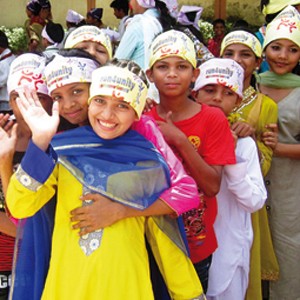
May 6, 2016 | Focolare Worldwide
 Lilia and Paul from Aleppo speak out in the name of their Syrian peers. Their message to the Youth for Unity of Argentina immediately went global: “Thanks, we feel your love and that you share our pain even if you are far. We, the Youth for Unity of Syria, live in three cities: Damascus, Aleppo, and Kfarbo (near Hama). There are 125 of us; 25 are here in Aleppo. There were more of us before, but due to the situation, many friends had to migrate.” It’s the story of Marian, who left for Belgium. She didn’t want to go since all her friends remained in Syria, but had to join her family. «A very important moment for us is the Time Out at 12 noon. We try to pray not only among us, but also with our relatives and friends. One of us proposed this action to a Muslim friend, and so now, at 12, each one prays in his heart, according to his religion. We want to propose it also to all of you, so that peace can be achieved not only in Syria but throughout the world. We love you all!” In Lebanon the United World Week started with the protection of the environment, with an ecological action to clean the beaches, together with #Recycle Lebanon and the Scouts. The theme is strongly felt by the Lebanese Youth for a United World who had already started to act to concretely take care of their own country, starting from the capital of Beirut. They then continued with a film-forum and concluded with a weekend dedicated to the city’s homeless. https://vimeo.com/148202815 In Taiwan, the Run4Unity was held in the north (Taipei), and south (Kaohsiung). In Taipei, also the Vice-President participated. In Southeast Asia they are preparing for an event for young people coming from many countries: Thailand, Korea, Bolivia, Myanmar, Laos, Cambodia, Malaysia, Indonesia and Singapore. At the end of the month there will be a sportive event for teenagers, in the name of Run4Unity. Likewise the run will take place in Manila and Cebu, in the Philippines.
Lilia and Paul from Aleppo speak out in the name of their Syrian peers. Their message to the Youth for Unity of Argentina immediately went global: “Thanks, we feel your love and that you share our pain even if you are far. We, the Youth for Unity of Syria, live in three cities: Damascus, Aleppo, and Kfarbo (near Hama). There are 125 of us; 25 are here in Aleppo. There were more of us before, but due to the situation, many friends had to migrate.” It’s the story of Marian, who left for Belgium. She didn’t want to go since all her friends remained in Syria, but had to join her family. «A very important moment for us is the Time Out at 12 noon. We try to pray not only among us, but also with our relatives and friends. One of us proposed this action to a Muslim friend, and so now, at 12, each one prays in his heart, according to his religion. We want to propose it also to all of you, so that peace can be achieved not only in Syria but throughout the world. We love you all!” In Lebanon the United World Week started with the protection of the environment, with an ecological action to clean the beaches, together with #Recycle Lebanon and the Scouts. The theme is strongly felt by the Lebanese Youth for a United World who had already started to act to concretely take care of their own country, starting from the capital of Beirut. They then continued with a film-forum and concluded with a weekend dedicated to the city’s homeless. https://vimeo.com/148202815 In Taiwan, the Run4Unity was held in the north (Taipei), and south (Kaohsiung). In Taipei, also the Vice-President participated. In Southeast Asia they are preparing for an event for young people coming from many countries: Thailand, Korea, Bolivia, Myanmar, Laos, Cambodia, Malaysia, Indonesia and Singapore. At the end of the month there will be a sportive event for teenagers, in the name of Run4Unity. Likewise the run will take place in Manila and Cebu, in the Philippines.  Many events were held in India which was the hotspot of United World Week in 2015: in Bangalore an International Food Festival was held with over 500 youths, aimed at uniting cultures through food, and also to finance the med-care of Solomon Ellis, a boy who was seriously injured in an accident. In Mumbai, at the YMCA Chembur, a district of the metropolis, there was a mural competition inspired by the theme of peace. Furthermore Run4Unity with games and a short marathon will soon take place. In New Delhi instead, at the Fr Agnel Bal Bhavan in Greater Noida, 300 orphaned children will be involved in various games and sports events to diffuse the Golden Rule .The children, aged between 5 and 17 and from various parts of India and Nepal, belong to diverse religions: Hindus, Christians Muslims and Sikhs. Moreover a Run4Unity link-up with Mexico is programmed for 8 May, since the Mexican sports event held in a symbolic place will conclude precisely in the “Gandhi Park.” In Lahore, Pakistan, activities were held in a school run by the sisters of Mother Theresa: there were 120 children involved by a group of girls who wished to bring them a bit of joy. One of them wrote: “At the start, it was hard to establish a relationship with these children, but in the end, they enjoyed it so much that they no longer wanted to leave. I have changed a lot.” Lastly, preparations are underway in Medan (Indonesia) for a peace concert next 14 May, the funds of which will be allocated to a Country at war. They have been working for months now to gather funds to cover the organizational expenses, by selling fruit juice, singing in restaurants, and looking for sponsors. Through songs and testimonials the youths will share their proposals to become builders of peace in daily life. Maria Chiara De Lorenzo
Many events were held in India which was the hotspot of United World Week in 2015: in Bangalore an International Food Festival was held with over 500 youths, aimed at uniting cultures through food, and also to finance the med-care of Solomon Ellis, a boy who was seriously injured in an accident. In Mumbai, at the YMCA Chembur, a district of the metropolis, there was a mural competition inspired by the theme of peace. Furthermore Run4Unity with games and a short marathon will soon take place. In New Delhi instead, at the Fr Agnel Bal Bhavan in Greater Noida, 300 orphaned children will be involved in various games and sports events to diffuse the Golden Rule .The children, aged between 5 and 17 and from various parts of India and Nepal, belong to diverse religions: Hindus, Christians Muslims and Sikhs. Moreover a Run4Unity link-up with Mexico is programmed for 8 May, since the Mexican sports event held in a symbolic place will conclude precisely in the “Gandhi Park.” In Lahore, Pakistan, activities were held in a school run by the sisters of Mother Theresa: there were 120 children involved by a group of girls who wished to bring them a bit of joy. One of them wrote: “At the start, it was hard to establish a relationship with these children, but in the end, they enjoyed it so much that they no longer wanted to leave. I have changed a lot.” Lastly, preparations are underway in Medan (Indonesia) for a peace concert next 14 May, the funds of which will be allocated to a Country at war. They have been working for months now to gather funds to cover the organizational expenses, by selling fruit juice, singing in restaurants, and looking for sponsors. Through songs and testimonials the youths will share their proposals to become builders of peace in daily life. Maria Chiara De Lorenzo

May 5, 2016 | Focolare Worldwide

Source: stocksnap.io
A.M.N.
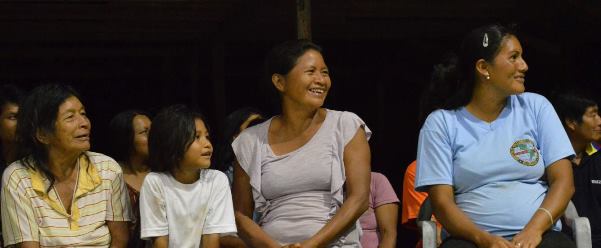
May 4, 2016 | Focolare Worldwide
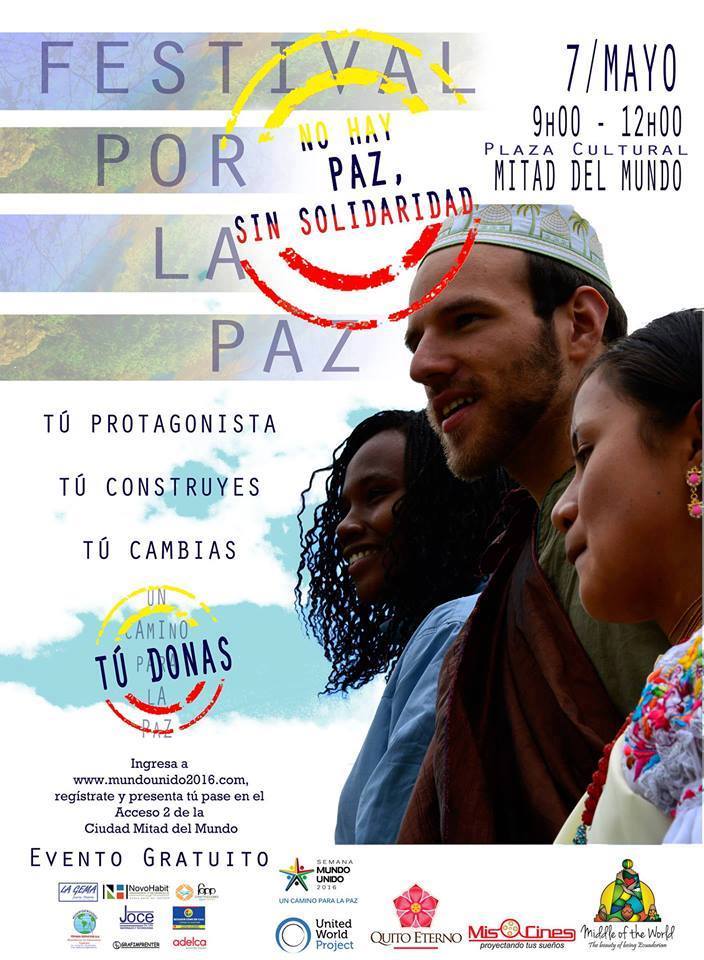 When Ecuador was chosen as the central seat of the 2016 United World Week (SMU), nobody would have imagined that on 16 April, the South American country would suffer one of the decade’s most deadly earthquakes: 660 victims, 4,600 injured, and 22,000 evacuees. «Those were really terrible moments – recalls Herminia, a member of the Ecuador United World Movement. As of now thousands of families are homeless, but the solidarity of the entire world has been really touching and made us feel that we were not alone!” In this context of humanitarian emergency, the actions of the United World undertook a new direction: “We decided to forego the Peace Festival (set for Saturday, 7 May), but decided together to continue being a source of light, and an answer to those who are suffering. Many feel the frustration of being unable to do anything, so we will give them the chance to help,” wrote the youth of the Focolare who decided to double their efforts: “They had chosen to highlight fraternity, and this is what our people are testifying to. We would like to do our best to make this our lifestyle not only during emergencies, but for always.” The Peace Festival of 7 May in Quito is entitled “solidarity is a path to peace”: a sharing of artistic experiences, and also a gathering of funds for the reconstruction. «We want to transmit to our people the message that we have only one life and must live it well.» On the Ecuador Youth for a United World’s Facebook page (fb.com/JMUEcuador) you can post a video greeting that testifies fraternity, and be a symbol of hope. The event is now well underway, with the participation of 300 young people from South America and 60 from other nations: from Italy to Korea, and from Burundi to the Philippines. The experience targeted is not a touristic journey but that of a deepening of “relationships” with oneself, the others, nature, and God, and an occasion to meet from their roots, the many cultures that make up Ecuador today. It is an immersion into the Pre-Columbian history of Quito and the community of the Andes, to prepare the youths present to start the travelling school, with the help of the Kitukara people (children of the upright sun), one of the oldest indigenous communities of Ecuador officially recognised in 2003, to which 9,000 families currently belong. “The core of our tradition is respect for Mother Earth,» Sami explains, along with the strong sense of the community: «when people arrive, they are welcomed as part of our family, because in accepting the others, we accept our own selves.” The two routes of the trip consist in travelling 1,200 km (from 1 to 6 May). Each stopover will unveil an asset, a feature, and a particular gift. From the Sierra along the Coast: in Esmeraldas, with the ancestral community of Chachis, the origin of the music and dance of the Afroesmeraldeño people; in Otavalo with the communities of Agato and Gualapuro, the discovery of the art of giving according to their ancient life philosophy.
When Ecuador was chosen as the central seat of the 2016 United World Week (SMU), nobody would have imagined that on 16 April, the South American country would suffer one of the decade’s most deadly earthquakes: 660 victims, 4,600 injured, and 22,000 evacuees. «Those were really terrible moments – recalls Herminia, a member of the Ecuador United World Movement. As of now thousands of families are homeless, but the solidarity of the entire world has been really touching and made us feel that we were not alone!” In this context of humanitarian emergency, the actions of the United World undertook a new direction: “We decided to forego the Peace Festival (set for Saturday, 7 May), but decided together to continue being a source of light, and an answer to those who are suffering. Many feel the frustration of being unable to do anything, so we will give them the chance to help,” wrote the youth of the Focolare who decided to double their efforts: “They had chosen to highlight fraternity, and this is what our people are testifying to. We would like to do our best to make this our lifestyle not only during emergencies, but for always.” The Peace Festival of 7 May in Quito is entitled “solidarity is a path to peace”: a sharing of artistic experiences, and also a gathering of funds for the reconstruction. «We want to transmit to our people the message that we have only one life and must live it well.» On the Ecuador Youth for a United World’s Facebook page (fb.com/JMUEcuador) you can post a video greeting that testifies fraternity, and be a symbol of hope. The event is now well underway, with the participation of 300 young people from South America and 60 from other nations: from Italy to Korea, and from Burundi to the Philippines. The experience targeted is not a touristic journey but that of a deepening of “relationships” with oneself, the others, nature, and God, and an occasion to meet from their roots, the many cultures that make up Ecuador today. It is an immersion into the Pre-Columbian history of Quito and the community of the Andes, to prepare the youths present to start the travelling school, with the help of the Kitukara people (children of the upright sun), one of the oldest indigenous communities of Ecuador officially recognised in 2003, to which 9,000 families currently belong. “The core of our tradition is respect for Mother Earth,» Sami explains, along with the strong sense of the community: «when people arrive, they are welcomed as part of our family, because in accepting the others, we accept our own selves.” The two routes of the trip consist in travelling 1,200 km (from 1 to 6 May). Each stopover will unveil an asset, a feature, and a particular gift. From the Sierra along the Coast: in Esmeraldas, with the ancestral community of Chachis, the origin of the music and dance of the Afroesmeraldeño people; in Otavalo with the communities of Agato and Gualapuro, the discovery of the art of giving according to their ancient life philosophy.  From the Sierra, to the Orient, up to the Amazons: in Puyo, first stage of this trip, the indigenous Shiwacocha community waited for the youth for hours, and welcomed them with dances, songs and… giving to each one a Kichwa name. This was a highly cultural encounter: from now on the community will celebrate every time the new name is solemnly pronounced. The youth learned the great sense of responsibility towards creation, and attention given to listening to the other. The trip will proceed with Tungurahua, where the youth leaders of the Kisapincha people will illustrate the value of the teamwork of the “MINGAS,” and teach how to communicate with nature. Then at Bolivar at the Salt pans of Guardanda, the youth will testify to the fruit of work and cooperation between different groups, inspired by an economic model of development that is more respectful of nature and the producers. Six days of a genuine exchange of gifts between cultures: the experience will be described during the Peace Festival on 7 May, to bear witness to the wealth of life in harmony between different cultures.
From the Sierra, to the Orient, up to the Amazons: in Puyo, first stage of this trip, the indigenous Shiwacocha community waited for the youth for hours, and welcomed them with dances, songs and… giving to each one a Kichwa name. This was a highly cultural encounter: from now on the community will celebrate every time the new name is solemnly pronounced. The youth learned the great sense of responsibility towards creation, and attention given to listening to the other. The trip will proceed with Tungurahua, where the youth leaders of the Kisapincha people will illustrate the value of the teamwork of the “MINGAS,” and teach how to communicate with nature. Then at Bolivar at the Salt pans of Guardanda, the youth will testify to the fruit of work and cooperation between different groups, inspired by an economic model of development that is more respectful of nature and the producers. Six days of a genuine exchange of gifts between cultures: the experience will be described during the Peace Festival on 7 May, to bear witness to the wealth of life in harmony between different cultures.
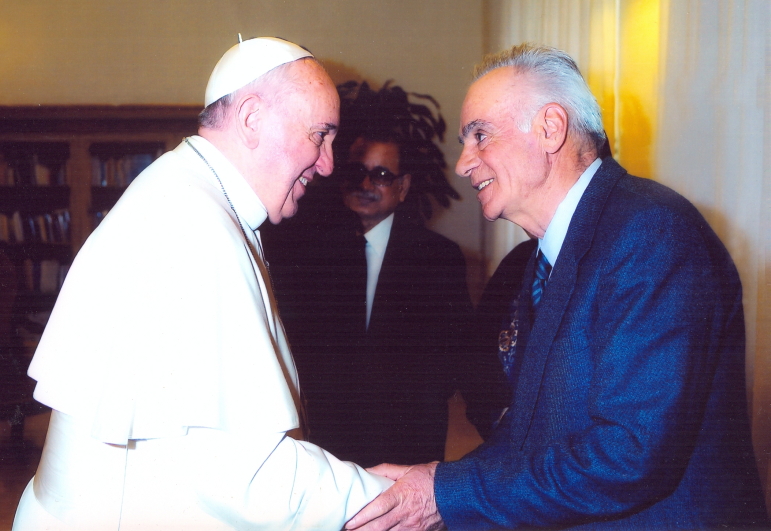
May 3, 2016 | Focolare Worldwide
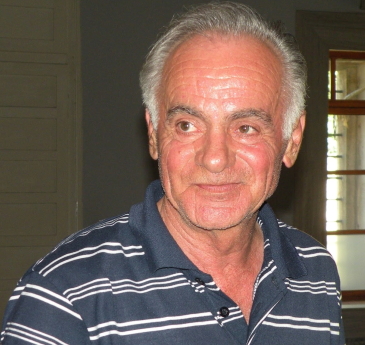 “A man of great moral stature and exceptional culture: it was a pleasure to have known him!” Countless comments like this have been arriving from around the world ever since his death, from people expressing gratitude and testifying that every encounter with Azir was a “moment of God”. A native of Kosovo, a teacher, husband and father of three children, Azir Selmani (May 9, 1947 – April 17, 2016) was the first Muslim to embrace the Focolare Movement in Skopje, Macedonia where he had gone to live because of political reasons. Azir himself recounts: “In 1990 I had a class full of Muslims, only one student was Catholic and I felt like I had to protect him. To show their gratitude his parents invited me to be their guests the Mariapolis in Slovenia. Among those people I began to ask, who are these people? I tried to open my heart a little more, and love slowly changed me. On the last day [of the Mariapolis] I mustered up the courage to stand in front of a hall filled with 300 people and admit that through them I had encountered love, the One God, the All-Powerful! In God’s light I saw all the failures of my past. I was sorry for all those generations of students to whom I had explained that the greatest power in the world was the atomic power; whereas, now I was convinced that the greatest power is love. Little by little a new life began to open before me. I began to read the Koran and to know God. I tried to convey my experience to colleagues and friends, and quite soon there were twenty of us Muslims who wanted to follow the Movement.” Azir opened his home for for Focolare gatherings and was always open to dialogue and sharing his testimony. He would always offer to translate Chiara Lubich’s writings for the Albanians. Touched by the witness of Azir and his wife, Bejije, couples who were having relationship problems would turn to them and Azir and his wife would accompany them along the path of reconciliation with gentleness and wisdom.
“A man of great moral stature and exceptional culture: it was a pleasure to have known him!” Countless comments like this have been arriving from around the world ever since his death, from people expressing gratitude and testifying that every encounter with Azir was a “moment of God”. A native of Kosovo, a teacher, husband and father of three children, Azir Selmani (May 9, 1947 – April 17, 2016) was the first Muslim to embrace the Focolare Movement in Skopje, Macedonia where he had gone to live because of political reasons. Azir himself recounts: “In 1990 I had a class full of Muslims, only one student was Catholic and I felt like I had to protect him. To show their gratitude his parents invited me to be their guests the Mariapolis in Slovenia. Among those people I began to ask, who are these people? I tried to open my heart a little more, and love slowly changed me. On the last day [of the Mariapolis] I mustered up the courage to stand in front of a hall filled with 300 people and admit that through them I had encountered love, the One God, the All-Powerful! In God’s light I saw all the failures of my past. I was sorry for all those generations of students to whom I had explained that the greatest power in the world was the atomic power; whereas, now I was convinced that the greatest power is love. Little by little a new life began to open before me. I began to read the Koran and to know God. I tried to convey my experience to colleagues and friends, and quite soon there were twenty of us Muslims who wanted to follow the Movement.” Azir opened his home for for Focolare gatherings and was always open to dialogue and sharing his testimony. He would always offer to translate Chiara Lubich’s writings for the Albanians. Touched by the witness of Azir and his wife, Bejije, couples who were having relationship problems would turn to them and Azir and his wife would accompany them along the path of reconciliation with gentleness and wisdom.  Azir and Behije took part in several Focolare interreligious gatherings both locally in their own country and also at the international level. Through these meetings Azir formed relationships of unity and friendship with people from around the world. He met Chiara personally in Rome, and shared his deepest sentiments with her. His letters always began with the words: “Dearest Mamma, freely and joyfully I write to you . . . I can never thank you enough. . . In one of those letters he confides to her: “during last Ramadan I did a close reading of the Koran and the Gospel. I’m more and more convinced that Islam and Christianity hide a common treasure that still needs to be discovered through our goodwill and our love.” In 2007 he responded immediately to the invitation from Chiara to make a pact of mutual love with her and with all the Muslims of the Movement, “so that we can be able to experience,” as Lubich wished they would, “God present amongst us. It is God who will bring us along the path of unity.” Seeing the effects of the courageous and enriching communion that is practiced in the Movement, Azir testifies: “I can say that Chiara’s dream is becoming a reality.” He never contented himself with mediocrity and diversity never frightened him. On the contrary, he always wanted to face it, convinced that he would find seeds of the Truth everywhere. At one 2014 symposium in Rome, Azir managed to greet Pope Francis personally: “My dream in life just came true!” he happily remarked. For the last six months of his life Azir battled the illness and never wavered in living for unity. And living up to his exquisite sensitivity to others, he never once refused a visitor and every visit turned out to be a most sacred moment. He was a true seeker of Freedom, the Essential, the Eternal, the Truth, and his words on these universal values will remain forever in the hearts of his listeners. This “master of dialogue”, of deep insight and broad horizons, with the soul of a poet has left us many letters, writings, poems about mercy, Mary of Nazareth in Islam and about Islam’s contact points with Christianity.
Azir and Behije took part in several Focolare interreligious gatherings both locally in their own country and also at the international level. Through these meetings Azir formed relationships of unity and friendship with people from around the world. He met Chiara personally in Rome, and shared his deepest sentiments with her. His letters always began with the words: “Dearest Mamma, freely and joyfully I write to you . . . I can never thank you enough. . . In one of those letters he confides to her: “during last Ramadan I did a close reading of the Koran and the Gospel. I’m more and more convinced that Islam and Christianity hide a common treasure that still needs to be discovered through our goodwill and our love.” In 2007 he responded immediately to the invitation from Chiara to make a pact of mutual love with her and with all the Muslims of the Movement, “so that we can be able to experience,” as Lubich wished they would, “God present amongst us. It is God who will bring us along the path of unity.” Seeing the effects of the courageous and enriching communion that is practiced in the Movement, Azir testifies: “I can say that Chiara’s dream is becoming a reality.” He never contented himself with mediocrity and diversity never frightened him. On the contrary, he always wanted to face it, convinced that he would find seeds of the Truth everywhere. At one 2014 symposium in Rome, Azir managed to greet Pope Francis personally: “My dream in life just came true!” he happily remarked. For the last six months of his life Azir battled the illness and never wavered in living for unity. And living up to his exquisite sensitivity to others, he never once refused a visitor and every visit turned out to be a most sacred moment. He was a true seeker of Freedom, the Essential, the Eternal, the Truth, and his words on these universal values will remain forever in the hearts of his listeners. This “master of dialogue”, of deep insight and broad horizons, with the soul of a poet has left us many letters, writings, poems about mercy, Mary of Nazareth in Islam and about Islam’s contact points with Christianity.
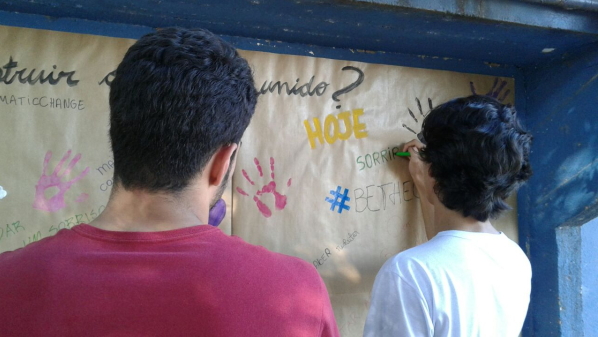
May 2, 2016 | Non categorizzato
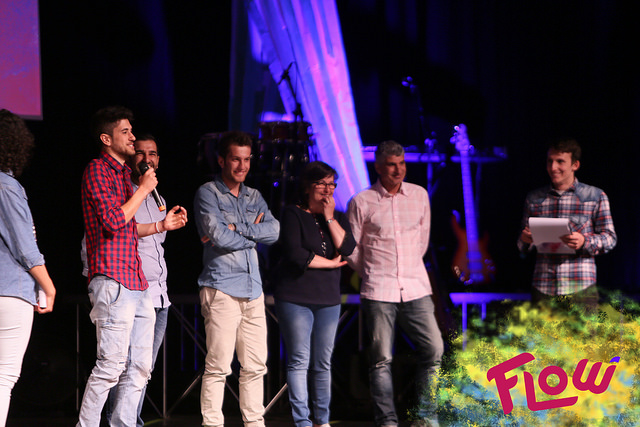 «We have to move on and be a source of light to those who are suffering. Many feel frustrated because they cannot do anything; let us give them the opportunity to help». These words were said by a young girl from Ecuador, a country hit by an earthquake on April 16 and presently living in a humanitarian state of emergency. They indicate the new rota of activities to be held during United World Week 2016. Ecuador is at the centre of this event. United World Week was started by the young members of the Focolare Movement just after the Genfest 1995. It involves the whole Movement. The preparation for the 2016 edition, which focuses its attention on Ecuador and interculturalism, so inherent in countries of the Andean region, has been going on for some time. The aim of this initiative is to give voice to the culture of fraternity which is present in the world and stimulates each person to give of his best. «On May 7, we are organizing a Peace Festival in Quito to express interculturalism. Its title is: ‘Solidarity leads to peace’. Join us and give hope; this is what is needed at the moment and we all can give it». With this appeal, the young people of Ecuador propose a global response to all those who want to offer their support, either through collecting funds or through posting a video message of fraternity and hope on Facebook (fb.com/JMUEcuador). The Peace Festival is just one of the many initiatives launched since the earthquake happened, when many immediately offered the use of their own social networks to spread official emergency information. Run4unity is another event that takes place during United World Week. Teenagers in many parts of the world organize this run from11.00 to 12.00, in different time-zones and with different sport activities. It is concluded by a time-out, a minute of silence or a prayer for peace. Among the landmarks of this event one finds: Mexicali, a Mexican town on the border with USA; here, Run4unity is held along the wall that divides the two countries; Bari, Italy with an activity at the Fornelli Juvenile Penal Institute, and Sopron, a Hungarian town on the border with Austria, where Run4unity forms part of an official sports programme in which young refugees in a refugee camp in Austria also participate (http://www.run4unity.net/2016/en/). United World Week includes also the Living Peace project promoted by El Roward American College in Cairo, Egypt and the Focolare NGO New Humanity. This project which involves a network of secondary schools, with over 50,000 students in 103 countries, aims at instilling a greater commitment to live for peace in different learning environments (http://living-peace.blogspot.it/p/english.html).
«We have to move on and be a source of light to those who are suffering. Many feel frustrated because they cannot do anything; let us give them the opportunity to help». These words were said by a young girl from Ecuador, a country hit by an earthquake on April 16 and presently living in a humanitarian state of emergency. They indicate the new rota of activities to be held during United World Week 2016. Ecuador is at the centre of this event. United World Week was started by the young members of the Focolare Movement just after the Genfest 1995. It involves the whole Movement. The preparation for the 2016 edition, which focuses its attention on Ecuador and interculturalism, so inherent in countries of the Andean region, has been going on for some time. The aim of this initiative is to give voice to the culture of fraternity which is present in the world and stimulates each person to give of his best. «On May 7, we are organizing a Peace Festival in Quito to express interculturalism. Its title is: ‘Solidarity leads to peace’. Join us and give hope; this is what is needed at the moment and we all can give it». With this appeal, the young people of Ecuador propose a global response to all those who want to offer their support, either through collecting funds or through posting a video message of fraternity and hope on Facebook (fb.com/JMUEcuador). The Peace Festival is just one of the many initiatives launched since the earthquake happened, when many immediately offered the use of their own social networks to spread official emergency information. Run4unity is another event that takes place during United World Week. Teenagers in many parts of the world organize this run from11.00 to 12.00, in different time-zones and with different sport activities. It is concluded by a time-out, a minute of silence or a prayer for peace. Among the landmarks of this event one finds: Mexicali, a Mexican town on the border with USA; here, Run4unity is held along the wall that divides the two countries; Bari, Italy with an activity at the Fornelli Juvenile Penal Institute, and Sopron, a Hungarian town on the border with Austria, where Run4unity forms part of an official sports programme in which young refugees in a refugee camp in Austria also participate (http://www.run4unity.net/2016/en/). United World Week includes also the Living Peace project promoted by El Roward American College in Cairo, Egypt and the Focolare NGO New Humanity. This project which involves a network of secondary schools, with over 50,000 students in 103 countries, aims at instilling a greater commitment to live for peace in different learning environments (http://living-peace.blogspot.it/p/english.html).  Loppiano, Italy and Abrigada, Portugal hold their traditional programme for youth on May1. “We are many people living on the same planet, we are brethren. Let us live and work so that this fraternity reigns in politics, in economy, in the social and cultural fields; so that we live in a better world as one family because we are all human beings”. This is the idea that animated the preparation for the Loppiano programme, while Abrigada focused on the idea of peace to demonstrate the highest aspirations of this reality. United World Week embraces the world and local initiatives aim at this goal. Examples of this are the concert for peace at Medan, Indonesia; the visit to a home for the elderly in New Zealand, presently debating the legislation of euthanasia; the Amani Festival in Goma in the Democratic Republic of Congo and the ecumenical workshop wanted by youth and priests of the Catholic, Russian-Orthodox, Armenian, Luteran and Evangelical Churches “to go beyond prejudices”. Very significant is the video message sent from youth in Aleppo, Syria to others in Argentina (fb.com/focolaresconosur). Many of the events may be followed on http://www.unitedworldproject.org/en/ and on fb.com/uwpofficial. Messages, photos and videos may be shared by using hashtag #4peace, thus giving voice to all big and small initiatives that “build bridges of fraternity” every day. Press Release Fotogallery (May Day at Loppiano) https://vimeo.com/164901348 https://vimeo.com/164386629
Loppiano, Italy and Abrigada, Portugal hold their traditional programme for youth on May1. “We are many people living on the same planet, we are brethren. Let us live and work so that this fraternity reigns in politics, in economy, in the social and cultural fields; so that we live in a better world as one family because we are all human beings”. This is the idea that animated the preparation for the Loppiano programme, while Abrigada focused on the idea of peace to demonstrate the highest aspirations of this reality. United World Week embraces the world and local initiatives aim at this goal. Examples of this are the concert for peace at Medan, Indonesia; the visit to a home for the elderly in New Zealand, presently debating the legislation of euthanasia; the Amani Festival in Goma in the Democratic Republic of Congo and the ecumenical workshop wanted by youth and priests of the Catholic, Russian-Orthodox, Armenian, Luteran and Evangelical Churches “to go beyond prejudices”. Very significant is the video message sent from youth in Aleppo, Syria to others in Argentina (fb.com/focolaresconosur). Many of the events may be followed on http://www.unitedworldproject.org/en/ and on fb.com/uwpofficial. Messages, photos and videos may be shared by using hashtag #4peace, thus giving voice to all big and small initiatives that “build bridges of fraternity” every day. Press Release Fotogallery (May Day at Loppiano) https://vimeo.com/164901348 https://vimeo.com/164386629

May 2, 2016 | Non categorizzato
 Melbourne, Australia Latitude: 37° 52’ S Longitude: 145° 08’ E Tom is a tall guy, popular with friends.In 2005 he had to move with his family to a newly built neighbourhood in Melbourne, where recreation activities and venues for recreation were scarce. He could have decided to leave but he tried instead to find a way to do something for his community so that people could have opportunities to come together, share and meet. “There is nothing better than sport to bring people from various generation together? In that neighbourhood there was an empty park. So, I started spreading an idea that had come to my mind: creating a space where people could play soccer. I did not know who would join and there was a risk that I would find myself on my own. But there were many families that shared the same desire and enthusiasm. So, participants soon became so many that we could set up a team and then even a soccer club! Now we have 38 teams with more than 400 children and 40 old people. Every week we meet to play. The park has been renovated and now there are many pitches with their own lighting. But this is not the end of the story, because we also added locker rooms, a kitchen and a canteen. It’s become a real meeting place”. Source: United world project
Melbourne, Australia Latitude: 37° 52’ S Longitude: 145° 08’ E Tom is a tall guy, popular with friends.In 2005 he had to move with his family to a newly built neighbourhood in Melbourne, where recreation activities and venues for recreation were scarce. He could have decided to leave but he tried instead to find a way to do something for his community so that people could have opportunities to come together, share and meet. “There is nothing better than sport to bring people from various generation together? In that neighbourhood there was an empty park. So, I started spreading an idea that had come to my mind: creating a space where people could play soccer. I did not know who would join and there was a risk that I would find myself on my own. But there were many families that shared the same desire and enthusiasm. So, participants soon became so many that we could set up a team and then even a soccer club! Now we have 38 teams with more than 400 children and 40 old people. Every week we meet to play. The park has been renovated and now there are many pitches with their own lighting. But this is not the end of the story, because we also added locker rooms, a kitchen and a canteen. It’s become a real meeting place”. Source: United world project
May 1, 2016 | Non categorizzato
https://vimeo.com/164386629

May 1, 2016 | Non categorizzato
 Work was inflicted on mankind as a discipline, but also as redemption. While work has the immediate effect of providing the daily bread, it also has an ultimate effect that is the acquisition of the Kingdom of God. Therefore it regards theology as much as it does economy; in fact man is the son of God, turned towards God even when he works. If it were merely a matter of economics, the worker would be nothing more than a machine: the dignity of a worker would be reduced to that of a mere tool. Nowadays there is so much talk about the dignity of work that it has become commonplace. But it is not said that the slave mentality is gone, nor that there is a lack of business owners, perhaps baptized, who because they pay a salary do not have the right to humiliate the ones who live on that salary, treating them with contempt and distrust, be they intellectual workers or be they semi-literate domestics. But, work is not only there to grow a salary. Work done with a desire for moral redemption and sharing in the sufferings of Christ, produces holiness. It enters into the economy of things eternal that makes machine builders, farmers, students, professionals, clerks and housewives into constructors of the integral Christ. Saint Ambrose says that every good worker is Christ’s own hand. Christ is at work in society through the hands of his workers. In other words, those who work well construct something that is heavenly on earth. The worker is the human crafter of a divine architecture. And this raises the dignity of the worker and of the work, if the work is carried out according to the spirit of the law of Christ. In this we see the divine at work in society through man, who becomes associated to the prodigy of the Incarnation. If the Incarnation was the miracle of the humanization of the Son of God, it also contains a daily miracle of the divinization of the sons of men who are therefore sons of God. It is a movement that comes from the earth and extends to the encounter with Christ who comes from Heaven. And so the life amidst these tormented streets of the earth is, yes, totally human, but also totally inserted in the divine life. It is totally divine if it is lives in the spirit of the Redemption. This dignity is not limited only to the works of the spirit, but invests the whole person, body and spirit and all that he does. The job, the profession, the office – these melancholic and at times tragic and often boring things are transfigured in a single blow into unexpected Values, into parts of our destiny. They become the means of our redemption. The work was our punishment and, through the humanity of Christ, it becomes our ransom. It is our contribution to the Redemption. You scale the heights of Heaven with the materials of the earth. Nothing is lost: not a bad pay day, not a word that is spoken, not a cup of water given in the name of Christ. The Kingdom of God is largely made up of these simple things. Most do not leave for the missions, enter a hermitage or write theological treatises: but everyone works, everyone serves. Well, if you act according to the spirit of Christ, serving men means serving God. He does not yet come to us surrounded in all his light that would blind us, but in his images, in men, in the work of his hand.” Igino Giordani, La società cristiana (Rome: Citta Nuova, 2010) p. 72-82.
Work was inflicted on mankind as a discipline, but also as redemption. While work has the immediate effect of providing the daily bread, it also has an ultimate effect that is the acquisition of the Kingdom of God. Therefore it regards theology as much as it does economy; in fact man is the son of God, turned towards God even when he works. If it were merely a matter of economics, the worker would be nothing more than a machine: the dignity of a worker would be reduced to that of a mere tool. Nowadays there is so much talk about the dignity of work that it has become commonplace. But it is not said that the slave mentality is gone, nor that there is a lack of business owners, perhaps baptized, who because they pay a salary do not have the right to humiliate the ones who live on that salary, treating them with contempt and distrust, be they intellectual workers or be they semi-literate domestics. But, work is not only there to grow a salary. Work done with a desire for moral redemption and sharing in the sufferings of Christ, produces holiness. It enters into the economy of things eternal that makes machine builders, farmers, students, professionals, clerks and housewives into constructors of the integral Christ. Saint Ambrose says that every good worker is Christ’s own hand. Christ is at work in society through the hands of his workers. In other words, those who work well construct something that is heavenly on earth. The worker is the human crafter of a divine architecture. And this raises the dignity of the worker and of the work, if the work is carried out according to the spirit of the law of Christ. In this we see the divine at work in society through man, who becomes associated to the prodigy of the Incarnation. If the Incarnation was the miracle of the humanization of the Son of God, it also contains a daily miracle of the divinization of the sons of men who are therefore sons of God. It is a movement that comes from the earth and extends to the encounter with Christ who comes from Heaven. And so the life amidst these tormented streets of the earth is, yes, totally human, but also totally inserted in the divine life. It is totally divine if it is lives in the spirit of the Redemption. This dignity is not limited only to the works of the spirit, but invests the whole person, body and spirit and all that he does. The job, the profession, the office – these melancholic and at times tragic and often boring things are transfigured in a single blow into unexpected Values, into parts of our destiny. They become the means of our redemption. The work was our punishment and, through the humanity of Christ, it becomes our ransom. It is our contribution to the Redemption. You scale the heights of Heaven with the materials of the earth. Nothing is lost: not a bad pay day, not a word that is spoken, not a cup of water given in the name of Christ. The Kingdom of God is largely made up of these simple things. Most do not leave for the missions, enter a hermitage or write theological treatises: but everyone works, everyone serves. Well, if you act according to the spirit of Christ, serving men means serving God. He does not yet come to us surrounded in all his light that would blind us, but in his images, in men, in the work of his hand.” Igino Giordani, La società cristiana (Rome: Citta Nuova, 2010) p. 72-82.
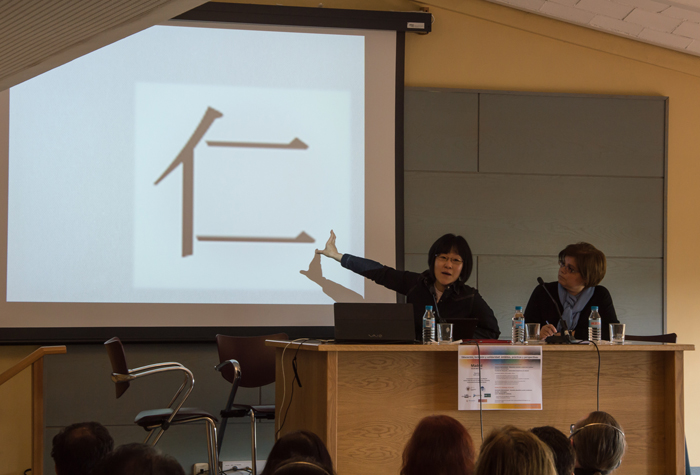
Apr 30, 2016 | Focolare Worldwide
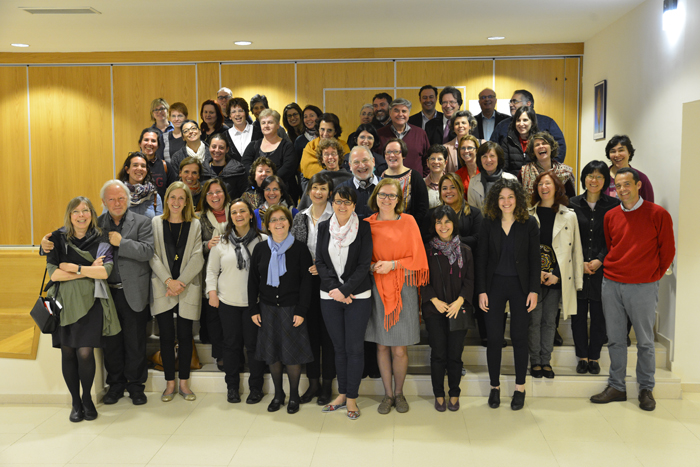 EdU (Education in Unity), an international and interdisciplinary pedagogic and educational study group got together in Spain (Luminosa Mariapolis Centre) for a seminar on inclusion, the central theme. The Educators from Brazil, Croatia, Italy, Kenya, Burundi, Slovenia, Korea, Poland, Portugal, and certainly Spain, worked on three great threads: relationships, communities, arts and sports. Thanks to live streaming on the network, the Seminar was followed by people in many parts of the world, like Benin, with talks from Argentina, Mexico and the USA. The interesting and stimulating discourses gave a framework to the experiences in really varied fields: the “love dice” put into practice in Burundi, the relationships established in the Raggio di Sole School (Croatia), and the Sevilla Autism Association (Spain)… or the effects of education in the community, and the education community. In Argentina, for example, we have the school for the aborigine community. The outcome: it is the school that revives the traditions of these century-old cultures that risk oblivion, through laboratories for goldsmiths, and the manufacture of canvases and musical instruments.
EdU (Education in Unity), an international and interdisciplinary pedagogic and educational study group got together in Spain (Luminosa Mariapolis Centre) for a seminar on inclusion, the central theme. The Educators from Brazil, Croatia, Italy, Kenya, Burundi, Slovenia, Korea, Poland, Portugal, and certainly Spain, worked on three great threads: relationships, communities, arts and sports. Thanks to live streaming on the network, the Seminar was followed by people in many parts of the world, like Benin, with talks from Argentina, Mexico and the USA. The interesting and stimulating discourses gave a framework to the experiences in really varied fields: the “love dice” put into practice in Burundi, the relationships established in the Raggio di Sole School (Croatia), and the Sevilla Autism Association (Spain)… or the effects of education in the community, and the education community. In Argentina, for example, we have the school for the aborigine community. The outcome: it is the school that revives the traditions of these century-old cultures that risk oblivion, through laboratories for goldsmiths, and the manufacture of canvases and musical instruments.  The variety of experiences presented was one of the strengths of a seminar conceived as a workshop: “here I see many people working together for the same objectives,” said one of the participants who no longer felt alone in her battles. In fact, a broader network was created, which knit the participants closer, in the certainty that “the real job has just begun.” It was also an occasion to get to know more about other international projects like Living Peace, Scholas Occurrentes and Sportmeet. As a contribution from the world of the art of education, the photographer and educator, Concha Casajús, exhibited some of her works in a video denouncing the sexual abuses perpetrated in Congo. At the end, the participants left with a greater conviction that inclusion is a lifestyle, a necessity in this complex and varied world of today, and particularly, that inclusive education is a priority in all sectors. The Seminar was preceded by a Symposium held in the Complutense University of Madrid on 22 April. Also dedicated to inclusion education, the opening speech was given by the Rector of the National University of Distance Education, Alejandro Tiana. Kishore Singh, Special Rapporteur of the United Nations on the Right to Education, contributed with a message of support to the event. The next EdU event is set for 3 and 4 June in Poland, during the International Interdisciplinary Conference on the occasion of the 20th anniversary of the h.c. “Jonh Paul II doctorate in Social Sciences” awarded to Chiara Lubich by the University of Lublin.
The variety of experiences presented was one of the strengths of a seminar conceived as a workshop: “here I see many people working together for the same objectives,” said one of the participants who no longer felt alone in her battles. In fact, a broader network was created, which knit the participants closer, in the certainty that “the real job has just begun.” It was also an occasion to get to know more about other international projects like Living Peace, Scholas Occurrentes and Sportmeet. As a contribution from the world of the art of education, the photographer and educator, Concha Casajús, exhibited some of her works in a video denouncing the sexual abuses perpetrated in Congo. At the end, the participants left with a greater conviction that inclusion is a lifestyle, a necessity in this complex and varied world of today, and particularly, that inclusive education is a priority in all sectors. The Seminar was preceded by a Symposium held in the Complutense University of Madrid on 22 April. Also dedicated to inclusion education, the opening speech was given by the Rector of the National University of Distance Education, Alejandro Tiana. Kishore Singh, Special Rapporteur of the United Nations on the Right to Education, contributed with a message of support to the event. The next EdU event is set for 3 and 4 June in Poland, during the International Interdisciplinary Conference on the occasion of the 20th anniversary of the h.c. “Jonh Paul II doctorate in Social Sciences” awarded to Chiara Lubich by the University of Lublin.
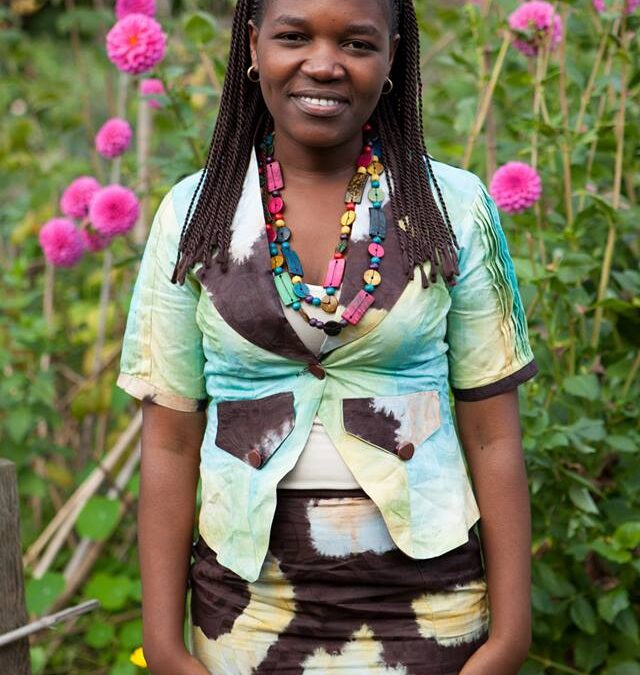
Apr 29, 2016 | Focolare Worldwide
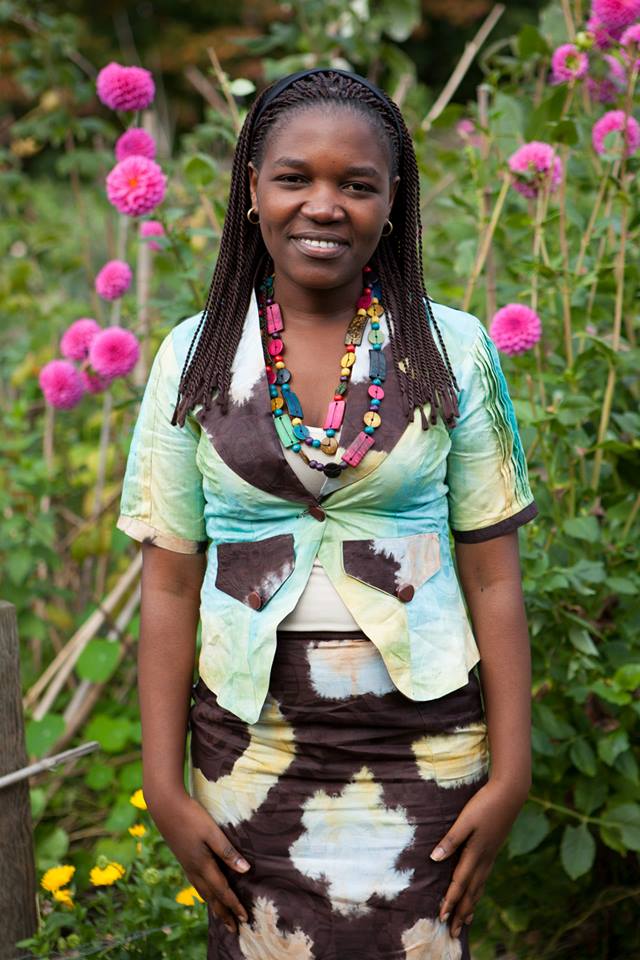
Micheline Mwendike
![Word of Life – May 2016]()
Apr 28, 2016 | Non categorizzato, Word of
 Listen to the Word of Life
Listen to the Word of Life
God has always wanted this: to dwell with us, his people. Already the first pages of the Bible show it as God comes down from heaven, walks in the garden and talks with Adam and Eve. Didn’t he create us for this? What does a lover want if not to be with the beloved? The Book of Revelation, which investigates God’s plan in history, gives us the certainty that God’s desire will be fully fulfilled. With the coming of Jesus, Emmanuel, ‘God with us’, he already started living in our midst. And now that Jesus is risen his presence is no longer limited to one place or one time, and he has spread it to the entire world. With Jesus has begun the building of a new and highly original community, a people made up of many peoples. God does not wish to dwell only in my soul, in my family, in my people, but among all peoples called to form one people. At the same time, the current experience of human mobility is changing the idea of what it is to be a people. In many nations, the people are made up of many ethnic groups. We are so different from one another in the colour of our skin, our culture, our religion. We often look at one another with distrust, suspicion or fear. We make war upon each other. And yet God is Father of all, and loves all and each of us. He does not want to live with one people (‘Ours, of course,’ would be our first thought) and leave the others behind. For him we are all his sons and daughters, a single family. Let’s make the effort, therefore, guided by the Word of Life this month, to appreciate diversity, respect the other, look at him or her as someone who belongs to me: I am the other, the other is me; the other lives in me, I live in the other. And let’s begin with those we share our life with every day. Like this we can make space for the presence of God among us. It will be he who constructs unity, who safeguards the identity of each people, who creates a new way of being society. In 1959 Chiara Lubich had already had this insight. She wrote a passage that is extremely up- to-date and an amazing prophecy: ‘If one day all people, not as individuals but as nations, would learn to put themselves aside… and if they would do this as the expression of the mutual love between states that God asks for, just as he asks for mutual love among individuals, that day would mark the beginning of a new era. For on that day…. Jesus will be alive and present among peoples … ‘Now is the time for every people to go beyond its own borders, to look farther. Now is the time to love the other countries as our own, to acquire a new purity of vision. To be Christians it is not enough to be detached from ourselves. The times we live in demand from the followers of Christ something more: the awareness of Christianity’s social dimension…. ‘And we hope that the Lord may have mercy on this divided and confused world, on peoples closed within their shells contemplating their own beauty – the only beauty that exists for them (though it is both limiting and unsatisfying). They strain to hold on to their treasures against all odds, the very treasures that could help other peoples who are dying of hunger. May the Lord cause all barriers to fall, and allow love to run uninterrupted through all lands, flooding them with spiritual and material goods. ‘Let us hope that the Lord brings about a new order in the world. Only he can make humanity a family and cultivate the unique characteristics of each people so that the splendour of each, placed at the service of others, may shine with the one light of life. This light of life in making beautiful each earthly country will make it the antechamber of the Eternal Country.’1
Fabio Cardi
1 Chiara Lubich, Essential Writings (New York and London, 2006), 231-2
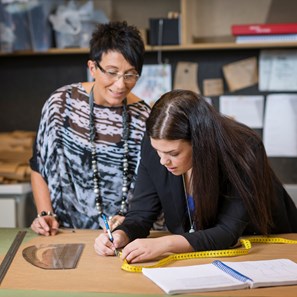
Apr 28, 2016 | Non categorizzato
I slept in company of the mice “All I cared about was money, designer clothing, women and fun. After experiencing jail for heroin trafficking, I went back to the same life as before, surrounded by violence, drugs and alcohol. Around three years ago, some drugs and money were stolen from me by a person whom I considered my friend. Fed up with God, myself and the world, I let myself go. I slept in an abandoned house amidst the refuse, in the company of the mice. One day, without even asking who I was, a stranger invited me to eat at his house and cared for me with the attention of a brother. I felt urged to follow him into the church he went to and, for the first time, I experienced a feeling of peace. Afterwards I continued to go the church alone. For hours in that deep silence I learnt how to pray. My life changed, even though there were relapses. Jesus gave me the strength to gradually take hold of myself again. Now, as a member of a rehab community I try to return the help I received, by serving the needy.” (Samuele – Italy)  The seamstress “Whenever she passed by our tailor shop she would give a sad glance at the clothing in the window. One day I invited her in. Her clothing was poor but in good taste. She returned other times, and I got to know her story. She had given up her job so that she could care for her parents. She was all alone and unable to practise her profession as a seamstress. I spoke with the owner of the shop and the woman was hired. Saying that she’s the best would be an understatement. I heard from several customers that they visit the shop more willingly when she’s there, because she makes them feel so welcome.” (J.B. – Argentina) Inculturating “There are many foreign children in my elementary school. It’s not easy to socialise with them, especially with one small group of gypsies. They interrupt class. They’re aggresive, and their parents are often in jail. One day, to give a hand to a colleague who was feeling desperate because she couldn’t manage to handle the situation, I took them into my classroom. Thinking of Jesus who was the model of meekness and patience, I prepare the best places for them in class, and I presented them to the students as tutors for the younger ones. Then, to make them the protagonists, I asked them to teach me something in the Rom language and we dedicated a portion of the lesson to it. Now they behave better and incultration is making some progress.” (E. – Italy)
The seamstress “Whenever she passed by our tailor shop she would give a sad glance at the clothing in the window. One day I invited her in. Her clothing was poor but in good taste. She returned other times, and I got to know her story. She had given up her job so that she could care for her parents. She was all alone and unable to practise her profession as a seamstress. I spoke with the owner of the shop and the woman was hired. Saying that she’s the best would be an understatement. I heard from several customers that they visit the shop more willingly when she’s there, because she makes them feel so welcome.” (J.B. – Argentina) Inculturating “There are many foreign children in my elementary school. It’s not easy to socialise with them, especially with one small group of gypsies. They interrupt class. They’re aggresive, and their parents are often in jail. One day, to give a hand to a colleague who was feeling desperate because she couldn’t manage to handle the situation, I took them into my classroom. Thinking of Jesus who was the model of meekness and patience, I prepare the best places for them in class, and I presented them to the students as tutors for the younger ones. Then, to make them the protagonists, I asked them to teach me something in the Rom language and we dedicated a portion of the lesson to it. Now they behave better and incultration is making some progress.” (E. – Italy)
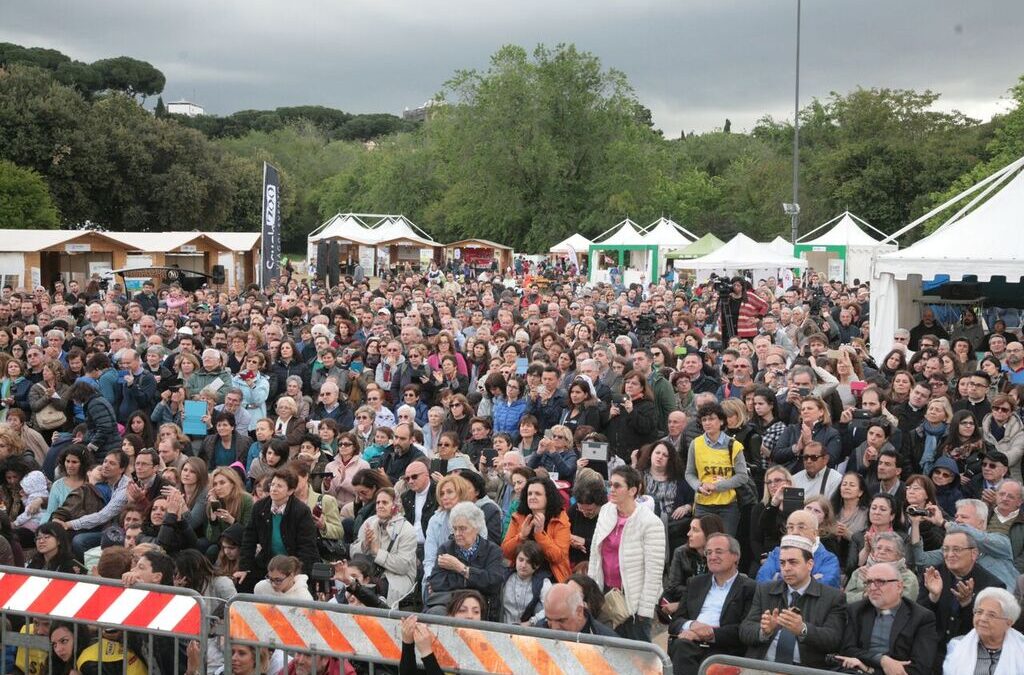
Apr 27, 2016 | Focolare Worldwide
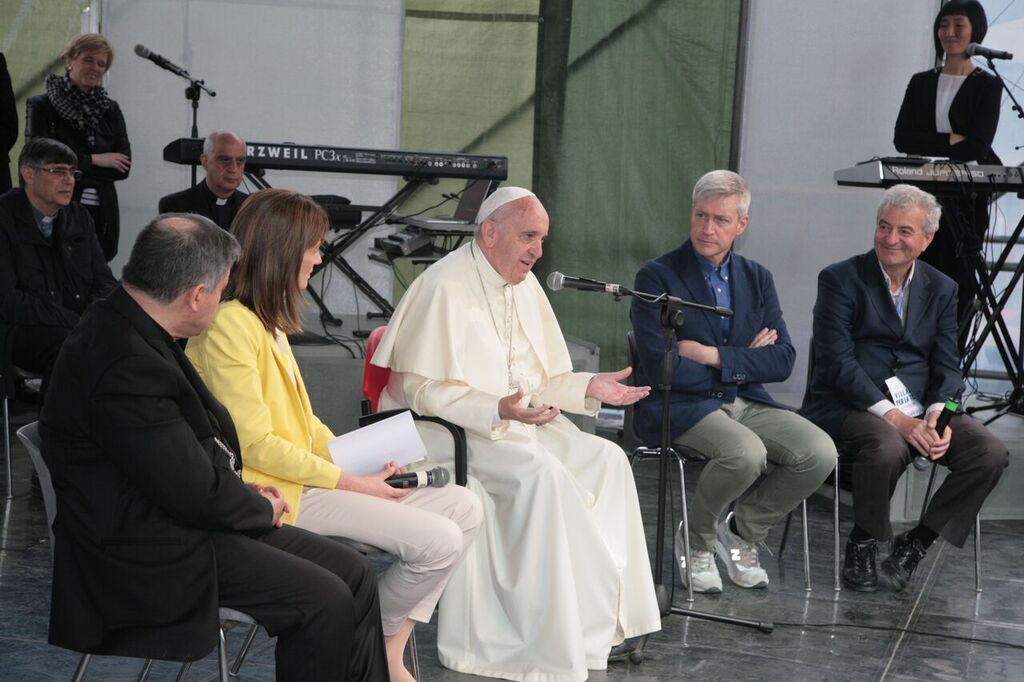
Photo: Lorenzo Russo
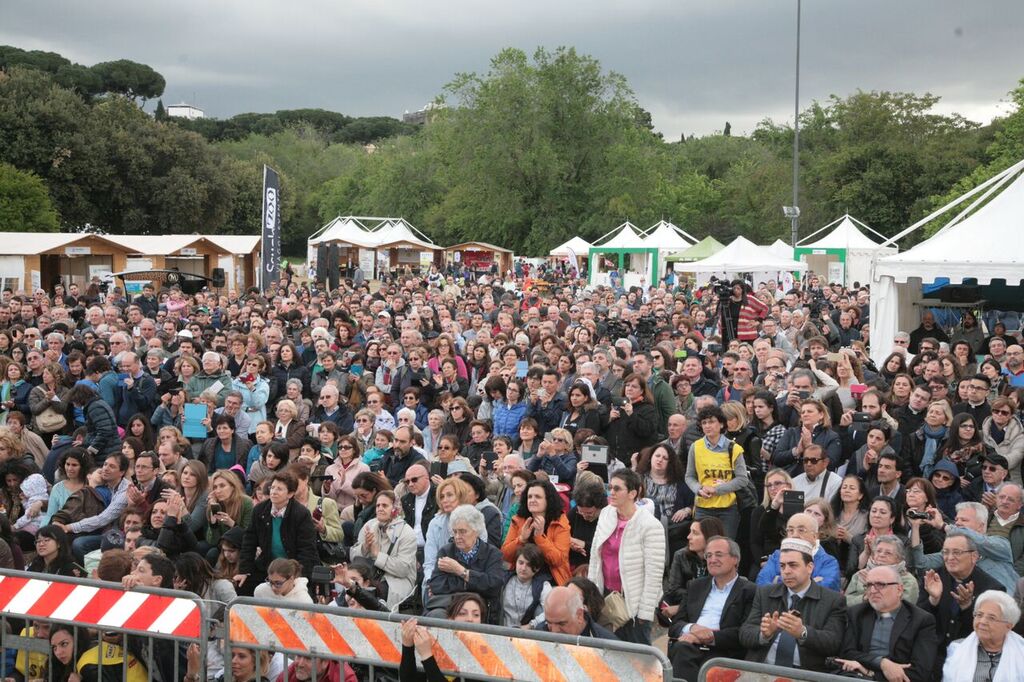
Photo: Lorenzo Russo
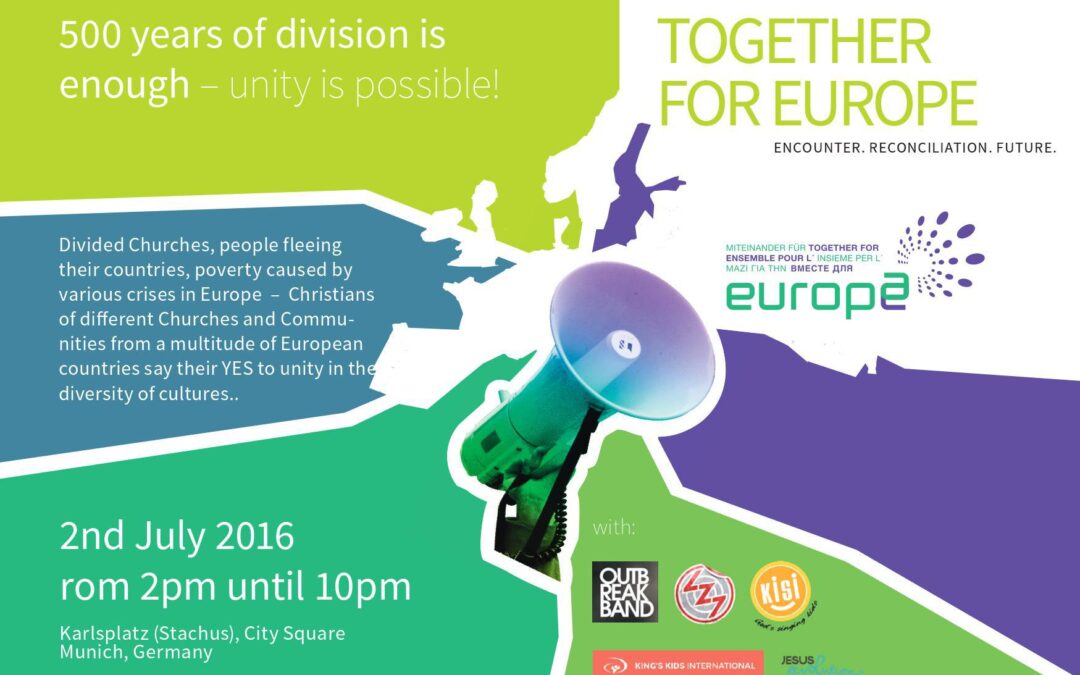
Apr 27, 2016 | Focolare Worldwide
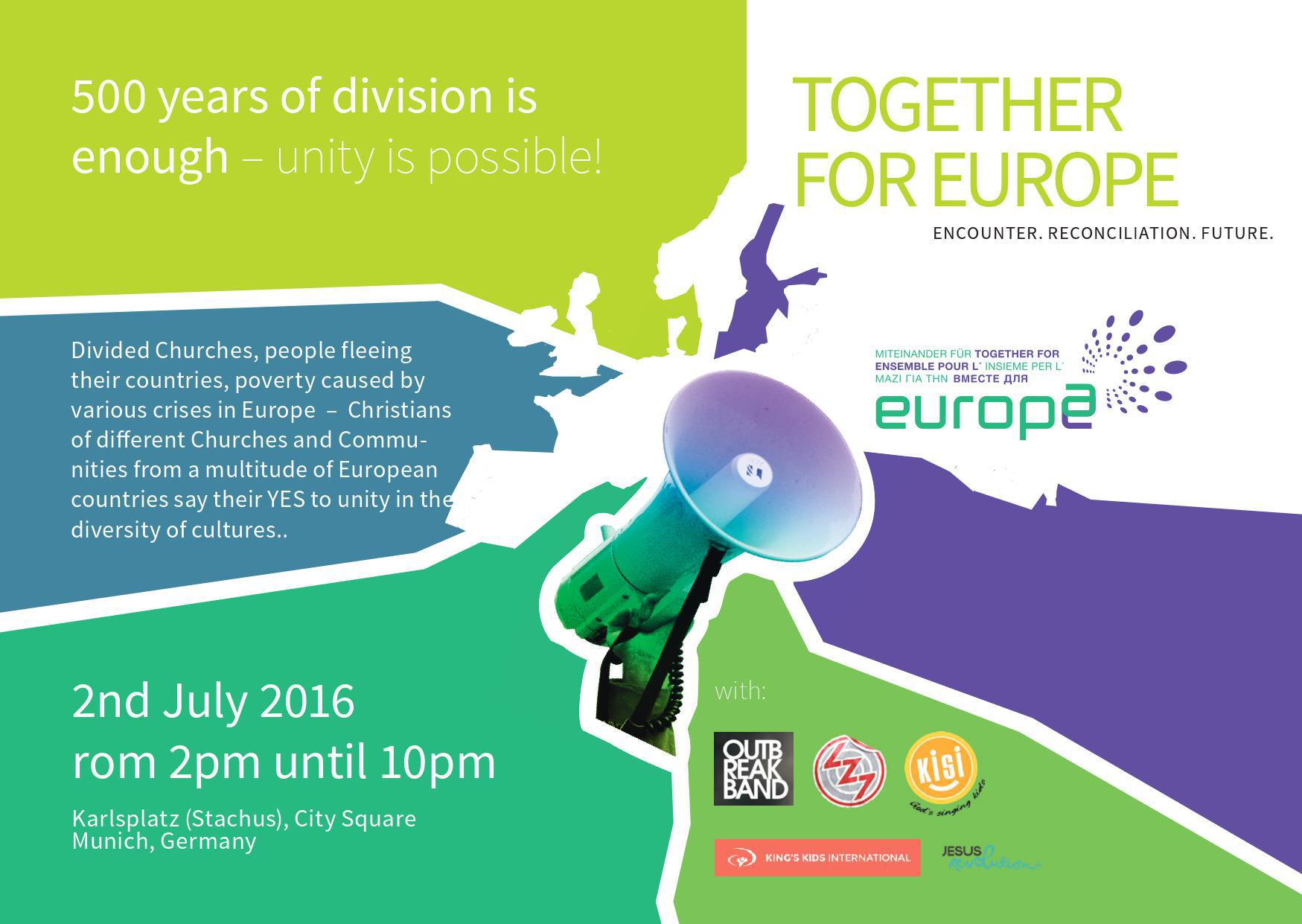 Encounter, Reconciliation, and Future, are three words that encompass the significance of the meeting in Munich at the Karlsplatz (Stachus),which was promoted by over 300 movements and communities of different Christian Churches. The objective is: to reflect together on the challenges that Europe faces, in the light of the testimonials of the network which is hidden at times, but very active and representing that part of society which commits itself to hospitality and solidarity for the most disadvantaged and weaker sections of society, so as to bridge the east and west, and overcome open or underlying conflicts. “What message does Europe have to give to the world?” When posed this question, the reply of the Focolare President, Maria Voce, concerned the objectives of the IPE: “The experience of these 2,000 years of Christianity brought about the maturation of ideas, culture, life, and actions that are necessary in the world today, and which unfortunately have not been evidenced. This is also because what is highlighted in Europe nowadays, are the difficulties, dramas, walls, and intolerance. Therefore, the good that exists is not manifested.“In the Evangelii Gaudium, Pope Francis speaks of the ‘invisible cities’ and the “connective network in which people share a common imagination, dreams about life, new human interactions that arise, and new cultures” (EG 74). «But right after this– Jesús Morán, Focolare Co-President explains – the Pope says that these invisible cities and territorial subcultures create a sort of ambivalence, and that subcultures practice segregation, violence and criminal activities. And so through fraternity inspired by love» which is the core of the message of the IPE, “We would like to show that in the good reigns in the invisible cities, and where there are virtuous practices, refugees are welcomed, and communion exists.” What are thus the expectations for this edition of the European meeting which is precisely on the eve of the 500th-year anniversary of the Reform, in a particular conjunction which sees the continent in a progressive crisis, also because of its incapacity to respond to the crisis of the migrants? We discussed it with Ilona Toth – from Hungary – and Diego Goller – an Italian, who on behalf of the Focolare Movement personally took part in the preparation for the Together for Europe event. «Recently the Orientation Committee of IEP met at the Roman headquarters of the Sant’Egidio Community, where the various movements leading this pathway converge. It was an opportunity to have another confrontation and trace an outline of our ideas. A year before the 500th anniversary of Luther’s Reform (1517-2017), we would like to show that a network of united Christians already exists, and is working among various movements and Churches», Diego Goller said. «We try to move ahead of the times and to show that in this Togetherness there is unity reached, not institutionally or theologically, but in its essence and substantial reconcilement: “500 years of division ” is, in fact, the title of one of the moments of the meeting. We are also guided by what Pope Francis and Patriarch Kirilli said in their joint declaration that the Christians of Eastern and Western Europe should unite to testify to the Gospel together.» «This is political action in the most noble sense of the term,» Ilona Toth affirmed. «The aim is to show all the good there is. Together for Europe’s prophecy lies in its name. Together is the gift of fraternity among us Christians, and on a broader range, with people of other religions and cultures. Then there comes the political side where Togetherness is achieved: charisms give concrete responses also to the political issues of cities.» And she concluded: «In Munich, we would like to show this stream of goodness which is already being put into action, and is also the fruit of the values of Christianity, developed throughout the centuries and brought to light today by the various charisms.» The event of 2 July will be preceded by a Congress of the Movements (30 June/1 July) at the Circus-Krone-Bau: 17 Forums and 19 Round Tables will involve exponents of the Churches, politics and civil society, who will discuss current issues. As a preparation for the Munich event, last 21 April in Genève at the Ecumenical Council of Churches, a round table was held, entitled “What are the identity and values of Europe?” Consult www.together4europe.org for further information. https://youtu.be/0CyLm0Nrkko Maria Chiara De Lorenzo
Encounter, Reconciliation, and Future, are three words that encompass the significance of the meeting in Munich at the Karlsplatz (Stachus),which was promoted by over 300 movements and communities of different Christian Churches. The objective is: to reflect together on the challenges that Europe faces, in the light of the testimonials of the network which is hidden at times, but very active and representing that part of society which commits itself to hospitality and solidarity for the most disadvantaged and weaker sections of society, so as to bridge the east and west, and overcome open or underlying conflicts. “What message does Europe have to give to the world?” When posed this question, the reply of the Focolare President, Maria Voce, concerned the objectives of the IPE: “The experience of these 2,000 years of Christianity brought about the maturation of ideas, culture, life, and actions that are necessary in the world today, and which unfortunately have not been evidenced. This is also because what is highlighted in Europe nowadays, are the difficulties, dramas, walls, and intolerance. Therefore, the good that exists is not manifested.“In the Evangelii Gaudium, Pope Francis speaks of the ‘invisible cities’ and the “connective network in which people share a common imagination, dreams about life, new human interactions that arise, and new cultures” (EG 74). «But right after this– Jesús Morán, Focolare Co-President explains – the Pope says that these invisible cities and territorial subcultures create a sort of ambivalence, and that subcultures practice segregation, violence and criminal activities. And so through fraternity inspired by love» which is the core of the message of the IPE, “We would like to show that in the good reigns in the invisible cities, and where there are virtuous practices, refugees are welcomed, and communion exists.” What are thus the expectations for this edition of the European meeting which is precisely on the eve of the 500th-year anniversary of the Reform, in a particular conjunction which sees the continent in a progressive crisis, also because of its incapacity to respond to the crisis of the migrants? We discussed it with Ilona Toth – from Hungary – and Diego Goller – an Italian, who on behalf of the Focolare Movement personally took part in the preparation for the Together for Europe event. «Recently the Orientation Committee of IEP met at the Roman headquarters of the Sant’Egidio Community, where the various movements leading this pathway converge. It was an opportunity to have another confrontation and trace an outline of our ideas. A year before the 500th anniversary of Luther’s Reform (1517-2017), we would like to show that a network of united Christians already exists, and is working among various movements and Churches», Diego Goller said. «We try to move ahead of the times and to show that in this Togetherness there is unity reached, not institutionally or theologically, but in its essence and substantial reconcilement: “500 years of division ” is, in fact, the title of one of the moments of the meeting. We are also guided by what Pope Francis and Patriarch Kirilli said in their joint declaration that the Christians of Eastern and Western Europe should unite to testify to the Gospel together.» «This is political action in the most noble sense of the term,» Ilona Toth affirmed. «The aim is to show all the good there is. Together for Europe’s prophecy lies in its name. Together is the gift of fraternity among us Christians, and on a broader range, with people of other religions and cultures. Then there comes the political side where Togetherness is achieved: charisms give concrete responses also to the political issues of cities.» And she concluded: «In Munich, we would like to show this stream of goodness which is already being put into action, and is also the fruit of the values of Christianity, developed throughout the centuries and brought to light today by the various charisms.» The event of 2 July will be preceded by a Congress of the Movements (30 June/1 July) at the Circus-Krone-Bau: 17 Forums and 19 Round Tables will involve exponents of the Churches, politics and civil society, who will discuss current issues. As a preparation for the Munich event, last 21 April in Genève at the Ecumenical Council of Churches, a round table was held, entitled “What are the identity and values of Europe?” Consult www.together4europe.org for further information. https://youtu.be/0CyLm0Nrkko Maria Chiara De Lorenzo
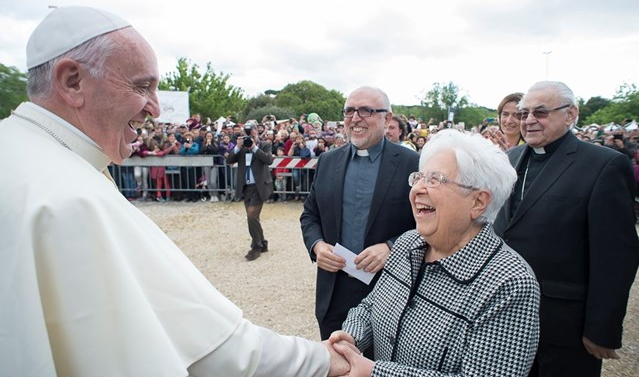
Apr 26, 2016 | Non categorizzato
 “It was the first time a Pope came to the Mariapolis and it reminded me of what I had heard Chiara Lubich say several times when describing the effect that the visits and the words of bishops had on her when they visited Mariapolises. She acknowledged them as “an anointing” different and weightier than those of others, whether they were theologians or saints. And she perceived that with the presence of a bishop the ‘city of Mary’ fulfils itself as the ‘city-Church’. This is what happened with the surprise visit of Pope Francis to the Earth Village event at Villa Borghese where, in collaboration with Earth Day Italy, the city of Rome was holding its Mariapolis. Now every Mariapolis in the world – and there are hundreds – will feel looked upon and loved in the same way. His off the cuff remarks seemed to say: you’ve taken me by the heart and I want to respond to what you’ve said to me. His clear and luminous words weren’t only an acknowledgement of the commitment and the deeds of the many people who spoke to him on stage; they also had the flavour of a programme for the future. His words kept returning to the same powerful image of the miracle of being able to transform the desert into forestland. I was struck by the way he acknowledged that what matters is to bring life, not make programmes and remain trapped inside them, but to go out and meet life as you find it, with its disorder and conflicts, without fear, facing the risks and welcoming the opportunities. You have to get close to it if you want to know the reality with your heart. Then the miracles happen: deserts, the most diverse sorts of deserts transform into forestland. Pope Francis possesses the power of the word. The images he uses are not easily erased from the heart or the mind. The Pope repeated several times that we do it together, with different people, groups and associations. He holds us to that and it gives him joy. The human spectacle at Villa Borghese was born from a question: Why not hold the Mariapolis right in the middle of Rome? Why not try to create a graft of fraternity with the city, a small but concrete ‘fraternity graft’ right on the streets of the city? We know that the city weeps because of many wounds and suffers from many weaknesses, but she also lives because of an unbelievable richness: the great good that is being done in her. When the Pope opened the Year of Mercy we thought of the many associations that are doing good in the city. Both religious and non-religious, they perform mercy. The encounter with Earth Day was almost by chance. Earth Day Italy works for the protection of Creation and for that integral ecology that is dear to Francis. It’s a process and exciting work that’s outside the normal scheme, on unimagined roads. Not without its difficulties, certainly, because we didn’t know one another and because we’re all different. But diversity is enriching, as the encounter with more than a hundred associations was. There was cooperation and bridges were built. Sometimes they’re very small things. One new friend told us: “Well, my association goes forward with the help of my pension. We don’t have logos or anything like that.” We wanted the Mariapolis this year to give witness to the good that that friend is also doing. Thus, the many virtuous underground cities contained in Rome emerged. The good is multiplying and a network is spreading that seems to concur with an intuition that Chiara Lubich put into writing in 1949. Encountering and loving Rome ‘many eyes would be illumined with His Light: tangible sign that He reigns there (. . .) reviving Christians and making this age that is so cold because it is atheist the Age of Fire, the Age of God (. . .) He’s not only a religious fact (. . .) And this separating Him from the entire life of men – a practical heresy of our time – subjugates man to something less than himself and relegates God who is Father to somewhere far from His children.”
“It was the first time a Pope came to the Mariapolis and it reminded me of what I had heard Chiara Lubich say several times when describing the effect that the visits and the words of bishops had on her when they visited Mariapolises. She acknowledged them as “an anointing” different and weightier than those of others, whether they were theologians or saints. And she perceived that with the presence of a bishop the ‘city of Mary’ fulfils itself as the ‘city-Church’. This is what happened with the surprise visit of Pope Francis to the Earth Village event at Villa Borghese where, in collaboration with Earth Day Italy, the city of Rome was holding its Mariapolis. Now every Mariapolis in the world – and there are hundreds – will feel looked upon and loved in the same way. His off the cuff remarks seemed to say: you’ve taken me by the heart and I want to respond to what you’ve said to me. His clear and luminous words weren’t only an acknowledgement of the commitment and the deeds of the many people who spoke to him on stage; they also had the flavour of a programme for the future. His words kept returning to the same powerful image of the miracle of being able to transform the desert into forestland. I was struck by the way he acknowledged that what matters is to bring life, not make programmes and remain trapped inside them, but to go out and meet life as you find it, with its disorder and conflicts, without fear, facing the risks and welcoming the opportunities. You have to get close to it if you want to know the reality with your heart. Then the miracles happen: deserts, the most diverse sorts of deserts transform into forestland. Pope Francis possesses the power of the word. The images he uses are not easily erased from the heart or the mind. The Pope repeated several times that we do it together, with different people, groups and associations. He holds us to that and it gives him joy. The human spectacle at Villa Borghese was born from a question: Why not hold the Mariapolis right in the middle of Rome? Why not try to create a graft of fraternity with the city, a small but concrete ‘fraternity graft’ right on the streets of the city? We know that the city weeps because of many wounds and suffers from many weaknesses, but she also lives because of an unbelievable richness: the great good that is being done in her. When the Pope opened the Year of Mercy we thought of the many associations that are doing good in the city. Both religious and non-religious, they perform mercy. The encounter with Earth Day was almost by chance. Earth Day Italy works for the protection of Creation and for that integral ecology that is dear to Francis. It’s a process and exciting work that’s outside the normal scheme, on unimagined roads. Not without its difficulties, certainly, because we didn’t know one another and because we’re all different. But diversity is enriching, as the encounter with more than a hundred associations was. There was cooperation and bridges were built. Sometimes they’re very small things. One new friend told us: “Well, my association goes forward with the help of my pension. We don’t have logos or anything like that.” We wanted the Mariapolis this year to give witness to the good that that friend is also doing. Thus, the many virtuous underground cities contained in Rome emerged. The good is multiplying and a network is spreading that seems to concur with an intuition that Chiara Lubich put into writing in 1949. Encountering and loving Rome ‘many eyes would be illumined with His Light: tangible sign that He reigns there (. . .) reviving Christians and making this age that is so cold because it is atheist the Age of Fire, the Age of God (. . .) He’s not only a religious fact (. . .) And this separating Him from the entire life of men – a practical heresy of our time – subjugates man to something less than himself and relegates God who is Father to somewhere far from His children.”
Maria Voce
President of the Focolare Movement
Source (Italian): Osservatore Romano, 25 aprile 2016 Centro televisivo vaticano (Italian)
Press releases – SIF – Focolare Information Service
Pope Francis’s words
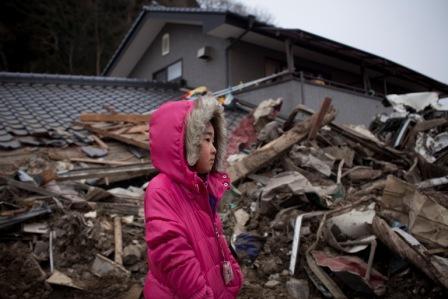
Apr 26, 2016 | Focolare Worldwide, Senza categoria
Isabel shares her state of mind following the earthquake that hit her country, Ecuador, on April 16. The physical structures that fell – bridges, buildings, houses – invite us to feel the earthquake in our own souls as well, and to ask ourselves whether we really are peace builders? I’ve realised that suffering helps to unite us. I’d like to challenge everyone during in these difficult days, to convert and become bearers of hope and optimism, that we help one another to keep faith alive.” There are 587 confirmed dead, and the wounded are more than 8 thousand, with 25 thousand displaced persons. The numbers continue to grow and it is estimated that reconstruction will cost the country billions of dollars. The Focolare Movement has begun a fundraiser for the Ecuador emergency, while they plan intervention on the ground.

Photo: United Nations
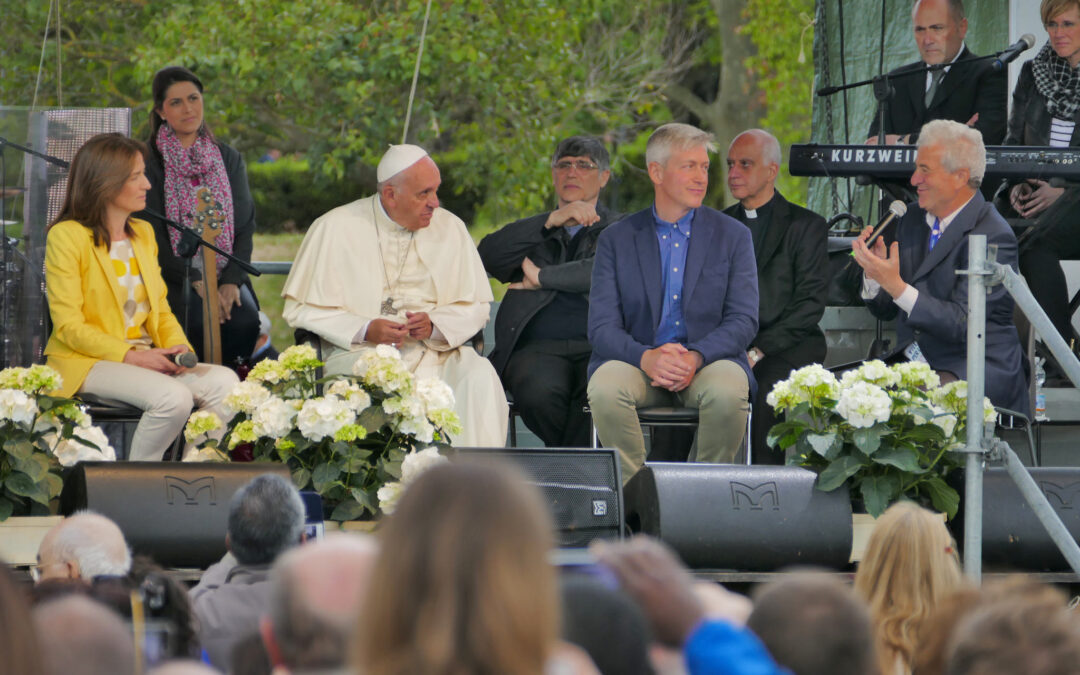
Apr 24, 2016 | Focolare Worldwide, Senza categoria

Photo: P. Gábor
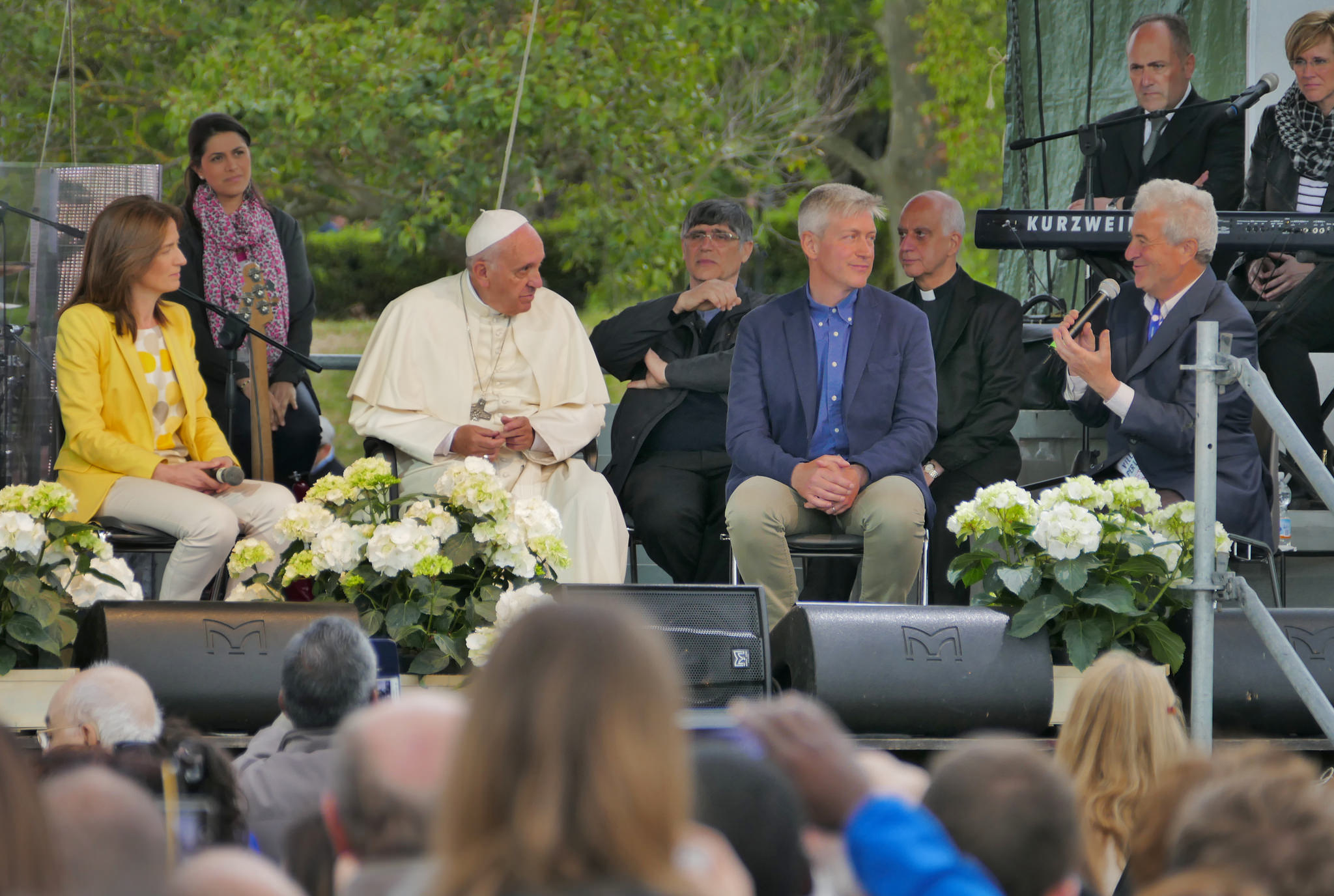
Photo: Thomas Klann
Pope Francis’s words
Press releases
https://vimeo.com/164030691 See Flickr photostream by Thomas Klann 
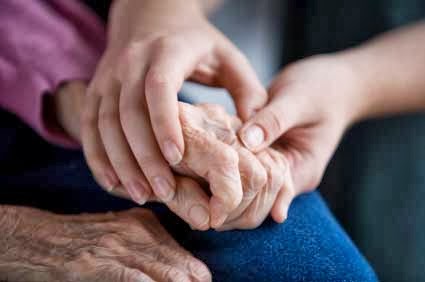
Apr 24, 2016 | Non categorizzato
 “We had said we wanted to see only Jesus in our neighbour, to deal with Jesus in our neighbor, to love Jesus in our neighbor, but now we recall that a neighbor has this or that defect, has this or that imperfection. Our eye becomes complicated and our being is no longer lit up. As a consequence, erring, we break unity. Perhaps that particular neighbor, like all of us, has made mistakes, but how does God view him or her? What really is that person’s condition, the truth of his or her state? If our neighbor is reconciled with God, then God no longer remembers anything, he has wiped out everything with his blood. So, why should we go on remembering? Who is in error at that moment? I who judge or my neighbour? I am. Therefore I must make myself see things from God’s viewpoint, in the truth, and treat my neighbor accordingly, so that if, by some mishap, he or she has not yet sorted things out with the Lord, the warmth of my love, which is Christ in me, will bring my neighbor to repentance, in the same way that the sun dries and heals over many wounds. Charity is preserved by truth, and truth is pure mercy with which we ought to be clothed from head to foot in order to be able to call ourselves Christians.”
“We had said we wanted to see only Jesus in our neighbour, to deal with Jesus in our neighbor, to love Jesus in our neighbor, but now we recall that a neighbor has this or that defect, has this or that imperfection. Our eye becomes complicated and our being is no longer lit up. As a consequence, erring, we break unity. Perhaps that particular neighbor, like all of us, has made mistakes, but how does God view him or her? What really is that person’s condition, the truth of his or her state? If our neighbor is reconciled with God, then God no longer remembers anything, he has wiped out everything with his blood. So, why should we go on remembering? Who is in error at that moment? I who judge or my neighbour? I am. Therefore I must make myself see things from God’s viewpoint, in the truth, and treat my neighbor accordingly, so that if, by some mishap, he or she has not yet sorted things out with the Lord, the warmth of my love, which is Christ in me, will bring my neighbor to repentance, in the same way that the sun dries and heals over many wounds. Charity is preserved by truth, and truth is pure mercy with which we ought to be clothed from head to foot in order to be able to call ourselves Christians.”
Source:Chiara Lubich, Essential Writings, New City Press, New York 2007, pp. 100-101
Apr 23, 2016 | Focolare Worldwide
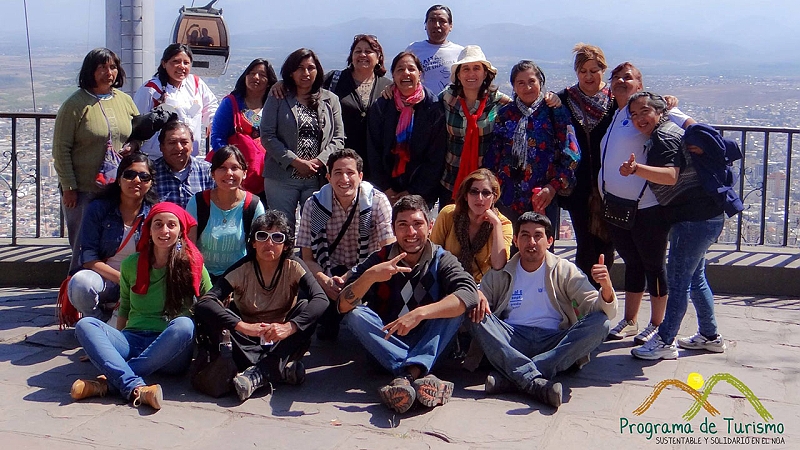
Apr 22, 2016 | Focolare Worldwide, Senza categoria
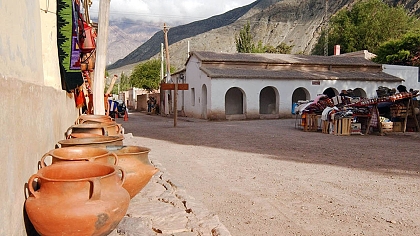 Salta: one of the more beautiful provinces of Argentina, with natural riches and ancient cultures that resisted the Spanish Conquest over 500 years ago. With the arrival of the new millennium it has been upgraded as a destination for tourists and the undisputed centre of the Northwest Region of Argentina. “The Sustainable Tourism Programme was begun in 2010 upon encouragement from the Bishops Commission for Migration and Tourism,” Paula González explains. “The Northwest of Argentina is mainly inhabited by descendants of indigenous peoples. Some live in communities and others are farmers. It demonstrates their connection to the land, both for produce and for artisanal crafts.” The important migrant waves, from Europe, the Middle East and Latin America – especially Bolivia – have created a ‘coexistence of cultures’, with a strong indigenous component that makes this a very unique region with cultural challenges.” The programme was begun in response to the lack of jobs. Only 39% of the economically active population had jobs. “We proposed working in the rural and more remote areas that were most affected,” explains the coordinator. The geography of the region contains wide valleys and rocky highlands (up to above 3000 metres). “We realized that the problem was due mainly to isolation,” continues Paula González, “which prevents them from selling their products, and in some communities there was a lack of water and energy. Those most affected were women and young people.” At that time Argentina was setting up a national tourism development plan that excluded rural communities. Then, the Catholic Church pointed to the need for more equitable and inclusive proposals. The goal was to create new tourist destinations based on agricultural and handicraft production, which are the basis of their livelihood.
Salta: one of the more beautiful provinces of Argentina, with natural riches and ancient cultures that resisted the Spanish Conquest over 500 years ago. With the arrival of the new millennium it has been upgraded as a destination for tourists and the undisputed centre of the Northwest Region of Argentina. “The Sustainable Tourism Programme was begun in 2010 upon encouragement from the Bishops Commission for Migration and Tourism,” Paula González explains. “The Northwest of Argentina is mainly inhabited by descendants of indigenous peoples. Some live in communities and others are farmers. It demonstrates their connection to the land, both for produce and for artisanal crafts.” The important migrant waves, from Europe, the Middle East and Latin America – especially Bolivia – have created a ‘coexistence of cultures’, with a strong indigenous component that makes this a very unique region with cultural challenges.” The programme was begun in response to the lack of jobs. Only 39% of the economically active population had jobs. “We proposed working in the rural and more remote areas that were most affected,” explains the coordinator. The geography of the region contains wide valleys and rocky highlands (up to above 3000 metres). “We realized that the problem was due mainly to isolation,” continues Paula González, “which prevents them from selling their products, and in some communities there was a lack of water and energy. Those most affected were women and young people.” At that time Argentina was setting up a national tourism development plan that excluded rural communities. Then, the Catholic Church pointed to the need for more equitable and inclusive proposals. The goal was to create new tourist destinations based on agricultural and handicraft production, which are the basis of their livelihood.  “The first year, we identified 30 communities and 7 key areas for development in 5 Provinces. Currently, almost 6 years later we are working in 5 areas. There are around fifty entrepreneurs linked to the ‘Network of Tourism Entrepreneurs (NOA)’. If we were to highlight anything it would be the network of organisations that have joined forces to work together in a structured way – national, provincial and local. They include universities, NGOs and businesses. They have also been closely connected to the Economy of Communion and the Movement for Unity in Politics that are key allies. Over these years,” Paula concludes, “what gave strength and effectiveness to the development of the project was the work done on the links in the chain of values and relationships that were formed between all the people involved.” We have already come a long way. There are local projects, new leaders capable of carrying things forward, and we can already foresee very satisfactory results: for example, interaction and mutual cooperation amongst different communities that are stepping out of their anonymity and becoming generators of their own history. For more information: Website Video
“The first year, we identified 30 communities and 7 key areas for development in 5 Provinces. Currently, almost 6 years later we are working in 5 areas. There are around fifty entrepreneurs linked to the ‘Network of Tourism Entrepreneurs (NOA)’. If we were to highlight anything it would be the network of organisations that have joined forces to work together in a structured way – national, provincial and local. They include universities, NGOs and businesses. They have also been closely connected to the Economy of Communion and the Movement for Unity in Politics that are key allies. Over these years,” Paula concludes, “what gave strength and effectiveness to the development of the project was the work done on the links in the chain of values and relationships that were formed between all the people involved.” We have already come a long way. There are local projects, new leaders capable of carrying things forward, and we can already foresee very satisfactory results: for example, interaction and mutual cooperation amongst different communities that are stepping out of their anonymity and becoming generators of their own history. For more information: Website Video
Apr 21, 2016 | Non categorizzato
Apr 20, 2016 | Non categorizzato
Promoted by the Youth for a United World, “High resolution – Rule of fire for Peace” will be a dedicated peace day. This event began in Portugal in 2002, and since then has been held on 1 May biannually. It has always involved thousands of Portuguese youths, and also those of various nationalities. In 2016, “high resolution” invites the youth to become protagonists of fraternity and builders of peace without compromises. Through music, choreographies, testimonials and Expo events, they will present the actions that have been launched, with the aim of furnishing concrete answers and giving suggestions on how to proceed in this direction. This year, the programme will also include various workshops that will discuss the theme of peace in various fields such as ecology, art, intercultural dialogue, economy, sports, communication, science and technology. This day is part of the international United World Project that targets universal brotherhood as the paradigm of human relationships, promoting the identification, preparation and dissemination of actions that have already started at global level, in favour of fraternity. Invitation for 1 May 2016
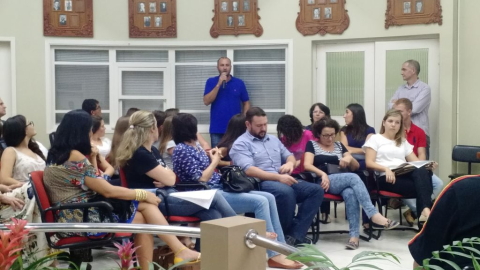
Apr 20, 2016 | Focolare Worldwide
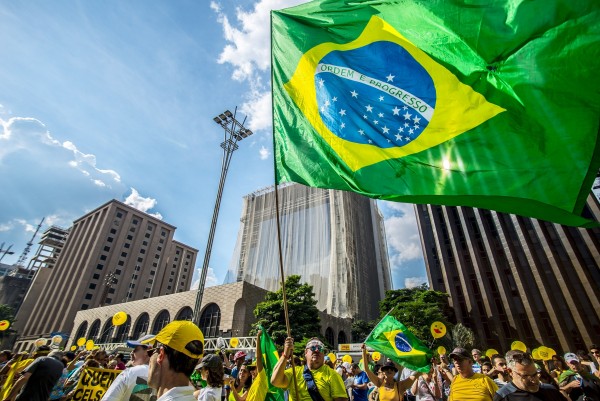 With 367 ayes and 137 nays, the Brazilian deputies approved the opening of the impeachment procedure against President Dilma Rousseff, while other 200 million greatly divided Brazilians, anxiously awaited the outcome of the voting session. It is now the Senate’s turn to confirm or not the implementation the indictment of the President. Should it be favourable, the vote of 11 May will suspend the President from her mandate for 6 months, while awaiting for the final verdict. The Brazilian constitution provides, in this case and for this length of time, that the Vice-President will assume the office. The Brazilian bishops in an official declaration dated 13 April, aired their opinions “in the face of the profound ethical, political, economic and institutional crisis” which is besetting the country with “unprecedented scandals of corruption,” involving businessmen, politicians, public officers in scheme which, besides being immoral and criminal, will be paid dearly”– the bishops said – especially by the poor. On focusing attention on the impeachment, they affirmed that they were “closely following this procedure” in the hope that everything would be done “in compliance with judicial system of the democratic rule of law. They furthermore underlined that “the good of the Nation demands that all parties overcome their personal interest, that of parties and groups” so that “the polarisation of ideological positions in a highly emotive atmosphere, would lead to the loss of the objectives and bring division and violence that menace social peace.” They asked the “Brazilian people to preserve the values of democratic co-existence, respect of one another, tolerance and healthy pluralism, and promote a peaceful political debate.” They concluded by affirming their belief “in dialogue, in the wisdom of the Brazilian people and the discernment of the authorities in seeking the strategies that can guarantee the solution to the actual crisis and the preservation of peace in our country.”
With 367 ayes and 137 nays, the Brazilian deputies approved the opening of the impeachment procedure against President Dilma Rousseff, while other 200 million greatly divided Brazilians, anxiously awaited the outcome of the voting session. It is now the Senate’s turn to confirm or not the implementation the indictment of the President. Should it be favourable, the vote of 11 May will suspend the President from her mandate for 6 months, while awaiting for the final verdict. The Brazilian constitution provides, in this case and for this length of time, that the Vice-President will assume the office. The Brazilian bishops in an official declaration dated 13 April, aired their opinions “in the face of the profound ethical, political, economic and institutional crisis” which is besetting the country with “unprecedented scandals of corruption,” involving businessmen, politicians, public officers in scheme which, besides being immoral and criminal, will be paid dearly”– the bishops said – especially by the poor. On focusing attention on the impeachment, they affirmed that they were “closely following this procedure” in the hope that everything would be done “in compliance with judicial system of the democratic rule of law. They furthermore underlined that “the good of the Nation demands that all parties overcome their personal interest, that of parties and groups” so that “the polarisation of ideological positions in a highly emotive atmosphere, would lead to the loss of the objectives and bring division and violence that menace social peace.” They asked the “Brazilian people to preserve the values of democratic co-existence, respect of one another, tolerance and healthy pluralism, and promote a peaceful political debate.” They concluded by affirming their belief “in dialogue, in the wisdom of the Brazilian people and the discernment of the authorities in seeking the strategies that can guarantee the solution to the actual crisis and the preservation of peace in our country.”  The Political Movement for the unity of Brazil (MPPU) – association for political confrontation which draws inspiration from the ideals of fraternity typical of the spirituality of the Focolare – affirmed through its President, Sergio Previdi “its conviction in the force of dialogue that is free from prejudices.” Previdi moreover invited the citizens to “call up inclusive dialogue” because “in exercising democracy together we can put into practice the necessary actions for the good of all.” “A lot can still be done – they said – if we put into practice the culture of fraternity, overcoming party politics positively in the daily political life of the country.” For the MMPU of Brazil the main concern in this delicate moment is that of not “scattering our forces and allowing ideological and party differences to divide us,” but of “acknowledging our differences so as to deepen dialogue.” And above all “making the effort to gather information from various sources, in order to get closer to the truth.” The numerous members of the Focolare Movement in Brazil, in line with the Brazilian Episcopal Conference, undertakes to offer what they consider “the main contribution we can give in this difficult moment: the declaration and testimony of fraternity lived – the core of the spirituality of unity that inspires us all. ”
The Political Movement for the unity of Brazil (MPPU) – association for political confrontation which draws inspiration from the ideals of fraternity typical of the spirituality of the Focolare – affirmed through its President, Sergio Previdi “its conviction in the force of dialogue that is free from prejudices.” Previdi moreover invited the citizens to “call up inclusive dialogue” because “in exercising democracy together we can put into practice the necessary actions for the good of all.” “A lot can still be done – they said – if we put into practice the culture of fraternity, overcoming party politics positively in the daily political life of the country.” For the MMPU of Brazil the main concern in this delicate moment is that of not “scattering our forces and allowing ideological and party differences to divide us,” but of “acknowledging our differences so as to deepen dialogue.” And above all “making the effort to gather information from various sources, in order to get closer to the truth.” The numerous members of the Focolare Movement in Brazil, in line with the Brazilian Episcopal Conference, undertakes to offer what they consider “the main contribution we can give in this difficult moment: the declaration and testimony of fraternity lived – the core of the spirituality of unity that inspires us all. ”
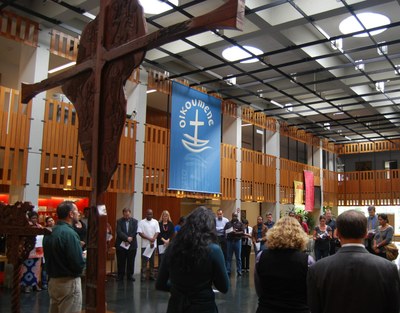
Apr 19, 2016 | Non categorizzato
 Without falling into the trap of ideological self-contained reminiscences, we shall be asking what has contributed to the idea of a “European identity”, whether it be conceived as an existing identity or as one still coming into existence, in what terms it can be described, and what has given rise to the ideal of European unity that can then be expressed in political form. Moving one step further, we shall attempt to draw, out of the historical experience of Europe, values and ideals that could enable us to surmount the present crisis and find a way forward into the future. Are there any examples and actual projects that are putting into action these values and ideals? Within a broad-minded vision of secularism, what could be a welcome contribution from churches and other religious communities? And, in this context, what is, or could be, the role of Switzerland?
Without falling into the trap of ideological self-contained reminiscences, we shall be asking what has contributed to the idea of a “European identity”, whether it be conceived as an existing identity or as one still coming into existence, in what terms it can be described, and what has given rise to the ideal of European unity that can then be expressed in political form. Moving one step further, we shall attempt to draw, out of the historical experience of Europe, values and ideals that could enable us to surmount the present crisis and find a way forward into the future. Are there any examples and actual projects that are putting into action these values and ideals? Within a broad-minded vision of secularism, what could be a welcome contribution from churches and other religious communities? And, in this context, what is, or could be, the role of Switzerland?
Programme
A panel discussion, with audience participation, with:
- Rev. Dr Olav Fykse Tveit, general secretary of the World Council of Churches
- Mr Eric Ackermann, a member of the Jewish community in Geneva
- Ms Gaelle Courtens, a journalist associated with the Federation of Protestant Churches in Italy and the ‘nev-notizie evangeliche’ Press Agency
- Mr Pasquale Ferrara, a diplomat, and professor at the LUISS University, Rome, and the Sophia University Institute, Loppiano
- Mr Andreas Gross, a former Swiss parliamentarian, and a former member of the Parliamentary Assembly of the Council of Europe
- In the chair: Ms Marguerite Contat, former head of delegations at the International Committee of the Red Cross, and joint president of the Genevan Constituent Assembly, 2008-12
Simultaneous interpretation in English and French will be available. The event will be live streamed online.
Apr 19, 2016 | Focolare Worldwide
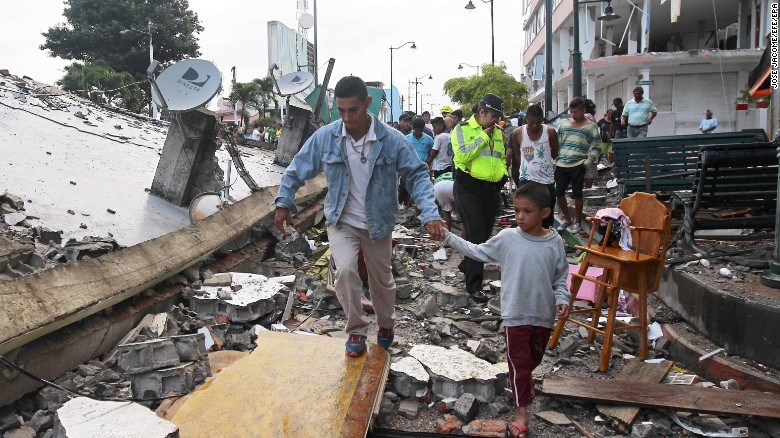
Apr 18, 2016 | Focolare Worldwide
 “Our country’s coastal region was hit by a severe earthquake with a magnitude of 7.8 on the Richter scale. It was felt throughout Ecuador, and also in several regions of Colombia and northern Peru,” write Fabian and Ardita from the Focolare community in Quito. “The situation is critical especially in several devastated cities.” “The solidarity of the people was prompt and concrete: people risking their own lives to help others; testimonies of the many people who lost loved ones; but in the midst of all the suffering there is also the strong-felt faith of the people. It’s quite moving and inspires us to believe in His love.” In response to the emergency in Ecuador the Focolare Movement has launched a fundraiser while a study is underway to see what can be done locally on the ground. News has also arrived from Focolare communities in Nagasaki and Tokyo (Japan): “For two days the country has been immersed in an atmosphere of ‘suspense’ because of the earthquake on Kyushu Island, in the regions of Kumamoto and Oita. The situation has activated an immediate solidarity effort and prayer in both religious and civil sectors.” Local authorities have already made arrangements to welcome the nearly 184,000 displaced persons. How you can help: Donations sent to the accounts below will be managed jointly by the Associations Action for a United World (AMU) and Action for New Families (AFN). In many countries of the European Union and in other countries of the world tax benefits are available for making such donations according to local regulations. How you can help: CAUSE: Ecuador Earthquake Emergency
“Our country’s coastal region was hit by a severe earthquake with a magnitude of 7.8 on the Richter scale. It was felt throughout Ecuador, and also in several regions of Colombia and northern Peru,” write Fabian and Ardita from the Focolare community in Quito. “The situation is critical especially in several devastated cities.” “The solidarity of the people was prompt and concrete: people risking their own lives to help others; testimonies of the many people who lost loved ones; but in the midst of all the suffering there is also the strong-felt faith of the people. It’s quite moving and inspires us to believe in His love.” In response to the emergency in Ecuador the Focolare Movement has launched a fundraiser while a study is underway to see what can be done locally on the ground. News has also arrived from Focolare communities in Nagasaki and Tokyo (Japan): “For two days the country has been immersed in an atmosphere of ‘suspense’ because of the earthquake on Kyushu Island, in the regions of Kumamoto and Oita. The situation has activated an immediate solidarity effort and prayer in both religious and civil sectors.” Local authorities have already made arrangements to welcome the nearly 184,000 displaced persons. How you can help: Donations sent to the accounts below will be managed jointly by the Associations Action for a United World (AMU) and Action for New Families (AFN). In many countries of the European Union and in other countries of the world tax benefits are available for making such donations according to local regulations. How you can help: CAUSE: Ecuador Earthquake Emergency
| Azione per un Mondo Unito ONLUS (AMU) |
Azione per Famiglie Nuove ONLUS (AFN) |
| IBAN: IT16 G050 1803 2000 0000 0120 434 at Banca Popolare Etica |
IBAN: IT55 K033 5901 6001 0000 0001 060 at Banca Prossima |
| SWIFT CODE/BIC: CCRTIT2184D |
SWIFT CODE/BIC: BCITITMX |

Apr 18, 2016 | Non categorizzato

Tommaso Sorgi (left) with Igino Giordani in 1969
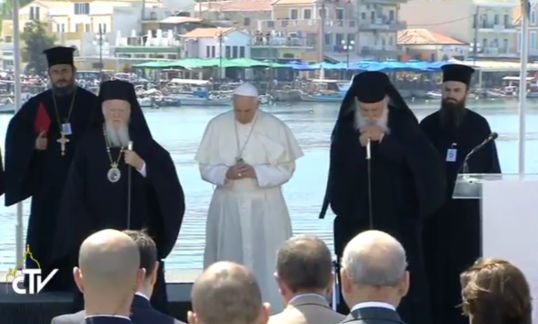
Apr 17, 2016 | Focolare Worldwide
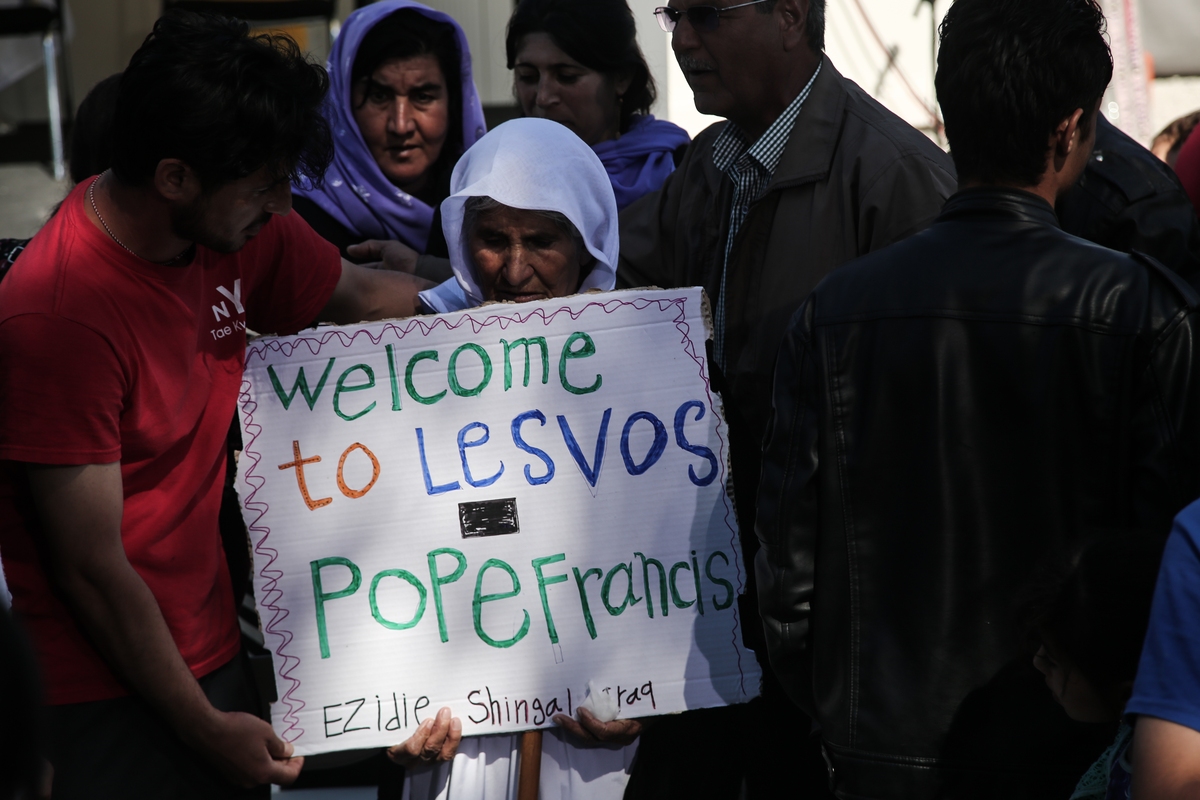
Pope Francis visits the Refugee Camp of Moria, in Mytilene, Lesbos, on April 16, 2016
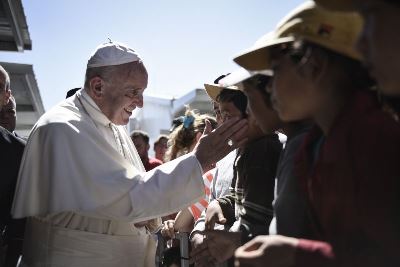 There was nothing but gratitude for the Greek people, expressed in different ways by the three religious leaders: In a moment of great difficulty caused by the serious economic crisis, the people still find the way and the heart to embrace those who flee to a better future. They expressed equal gratitude towards the many volunteers who showed up from all parts of Europe and around the world. Originally from South Africa, Pauline, from the Focolare Movement, has been living for many years between Athens and Lesbo. She repeatedly witnessed the landings of the refugees and helped to rescue them: “The Pope has also sent a political message at the border openings. I wonder why he didn’t go to Idomeni. Perhaps it would have been too political.” Chiara, from Pope John XXIII Association: “He said what I’ve felt for some time: Just stop classifying these people as ‘refugees’, as numbers. It’s time for personal contact, for knowing their stories, their backgrounds;” Eugenio, from the Italian Ambulance Corps at the Order of Malta, said: “I was very moved when he spoke of the children that die on the sea, because I have seen such scenes myself. I managed to shake hands with him and was strengthened for my work.” Cristina is Catholic and her grandparents are refugees that fled from Turkey to Lesvos: “It was an historic event, unimagineable on this island. It seems like a dream”. Father Maurice is coordinator of the Jesuit Refugee Service (JRS) in Greece. He remarked: “All of it was important: the words, the gestures, the silences. All of it spoke. The most powerful moment in the ‘jail’ was the personal contact the Pope had with each person” “A common message was sent to the refugees,” the Jesuit went on to say. They are mainly Muslims discovering a land of Christian origins. Therefore it matters that they see the unity of the Christian leaders and the closeness that these leaders wish to give a witness of.” “Moving. And very important from the ecumenical and political point of view, because of the meeting with Prime Minister, Alexis Tsipras,” said Vasileios Meichanetsidis from Apostles (an NGO from the Greek Orthodox Church). “The Pope recognised how much the Greeks had done, and the Greeks gladly welcomed him.”
There was nothing but gratitude for the Greek people, expressed in different ways by the three religious leaders: In a moment of great difficulty caused by the serious economic crisis, the people still find the way and the heart to embrace those who flee to a better future. They expressed equal gratitude towards the many volunteers who showed up from all parts of Europe and around the world. Originally from South Africa, Pauline, from the Focolare Movement, has been living for many years between Athens and Lesbo. She repeatedly witnessed the landings of the refugees and helped to rescue them: “The Pope has also sent a political message at the border openings. I wonder why he didn’t go to Idomeni. Perhaps it would have been too political.” Chiara, from Pope John XXIII Association: “He said what I’ve felt for some time: Just stop classifying these people as ‘refugees’, as numbers. It’s time for personal contact, for knowing their stories, their backgrounds;” Eugenio, from the Italian Ambulance Corps at the Order of Malta, said: “I was very moved when he spoke of the children that die on the sea, because I have seen such scenes myself. I managed to shake hands with him and was strengthened for my work.” Cristina is Catholic and her grandparents are refugees that fled from Turkey to Lesvos: “It was an historic event, unimagineable on this island. It seems like a dream”. Father Maurice is coordinator of the Jesuit Refugee Service (JRS) in Greece. He remarked: “All of it was important: the words, the gestures, the silences. All of it spoke. The most powerful moment in the ‘jail’ was the personal contact the Pope had with each person” “A common message was sent to the refugees,” the Jesuit went on to say. They are mainly Muslims discovering a land of Christian origins. Therefore it matters that they see the unity of the Christian leaders and the closeness that these leaders wish to give a witness of.” “Moving. And very important from the ecumenical and political point of view, because of the meeting with Prime Minister, Alexis Tsipras,” said Vasileios Meichanetsidis from Apostles (an NGO from the Greek Orthodox Church). “The Pope recognised how much the Greeks had done, and the Greeks gladly welcomed him.”  “We’re all migrants,” the Pope went on to say during the prayer at the port of Lesbo where, as at Lampedusa in 2013, he left a wreath of flowers on the surface of the sea. What is being expected of the political world? “It would be a matter of further stronger appeals especially toward Europe to consider the matter of the migrants and of the refugees not only in terms of internal politics or emergency, but as a new front on which the future of the continent comes into play along with its credibility in terms of its claims of principles and concrete politics,” said pasquale Ferrara, author of the recent book, Il mondo di Francesco. Bergoglio e la politica internazionale. Ferrara is a member of the Abba School for the field of political science and was the Italian Consul to Athens. “The Pope didn’t go there on a humanitarian mission, but wished to underscore this profound dimension,” Ferrara continued. “And the fact that he did it in an ecumenical manner was an even more powerful sign; almost like saying the politics isn’t managing to solve this issue, so we join the game, not as substitutes, but to underscore that this must be a point of priority on the world’s political agenda. The fact that the refugees brought to the Vatican were all Muslims underscores that ISIS is not only exterminating Christians. It is not a problem of religion, but of ending a war, all wars.” Joint Statement Maria Chiara De Lorenzo
“We’re all migrants,” the Pope went on to say during the prayer at the port of Lesbo where, as at Lampedusa in 2013, he left a wreath of flowers on the surface of the sea. What is being expected of the political world? “It would be a matter of further stronger appeals especially toward Europe to consider the matter of the migrants and of the refugees not only in terms of internal politics or emergency, but as a new front on which the future of the continent comes into play along with its credibility in terms of its claims of principles and concrete politics,” said pasquale Ferrara, author of the recent book, Il mondo di Francesco. Bergoglio e la politica internazionale. Ferrara is a member of the Abba School for the field of political science and was the Italian Consul to Athens. “The Pope didn’t go there on a humanitarian mission, but wished to underscore this profound dimension,” Ferrara continued. “And the fact that he did it in an ecumenical manner was an even more powerful sign; almost like saying the politics isn’t managing to solve this issue, so we join the game, not as substitutes, but to underscore that this must be a point of priority on the world’s political agenda. The fact that the refugees brought to the Vatican were all Muslims underscores that ISIS is not only exterminating Christians. It is not a problem of religion, but of ending a war, all wars.” Joint Statement Maria Chiara De Lorenzo
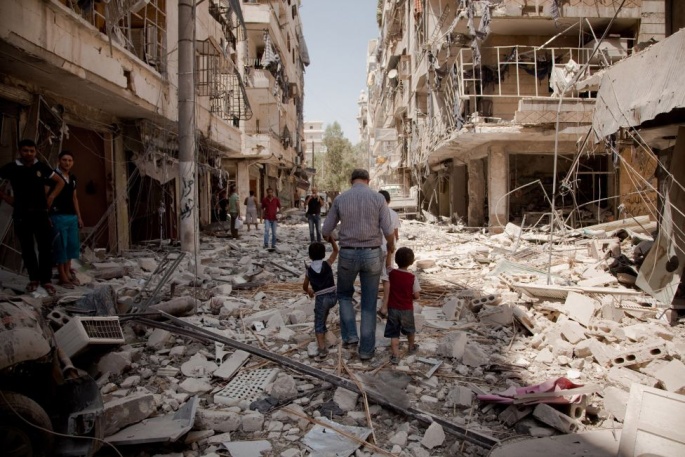
Apr 16, 2016 | Non categorizzato
 “When the conflict in Syria began, seeing that the future didn’t promise anything good, I thought it would be more prudent to leave the country. This idea was strengthened by a job offer in Lebanon. So I secured tickets and began to ready my family for the journey. But many doubts began to crop up inside me. Was it right to go and seek a better future for the family, or was it be better to remain in the country that I loved, to help my people? Talking it over with my wife, I realized that she was more inclined to stay, but she left it up to me. The only thing that mattered to her was that we keep the family together. I felt confused and upset until, one day – I was at church – I clearly felt that our place was here in Aleppo sharing the fate of our people. We are a diverse population made of many ethnic groups, different religions and confessions, but we’ve always lived together in harmony. We’re generous enough to accommodate Palestinians, Lebanese and Iraqis in recent decades, despite the embargo, offering them equal rights and job opportunities. We decided to stay. I worked on my own and earned good money. But after the bloody events that began to devastate the country, my shop was robbed and then destroyed. Nevertheless, there have still been many occasions give assistance through the Centre for the Deaf which my wife and I started to take care of. Later we also began collaboration with other humanitarian organisations to provide – with the help of Providence that has always reached out to us with miraculous assistance – basic necessities to more than 1,500 families. In these five years of war, due to the random bombings in our neighbourhoods, we saw so many families lose their loved ones and so many people left permanently disabled. One day, the driver at the Centre for the Deaf lost his wife and daughter when they were hit by mortar while walking down the street with the family. He was also seriously injured and taken to hospital in a state of shock. I was able to talk about his serious situation with a priest and when the bishop heard of it, he offered to take charge of the funeral for his wife and daughter. For my part, I began to look for money to pay for the Dad’s surgery. Seeing so many people taking an interest him the hospital lowered the costs and some doctors refused to accept payment for their service. So, not only were we able to cover all the expenses, but we had enough money left over to pay for the follow-up treatments that the driver would need. Another time I received a telephone call from a Muslim who works in the church we attend. He was asking me to help him find a house he could live in. He had seen armed rebels entering his district and was worried about his three daughters. After many attempts we finally managed to find a home for them. Once he moved into the new house, he realised he needed a gas cylinder, but could not find one. Then he called me: ‘I ask for this help from you,’ he remarked, ‘because you’re my brother, aren’t you?’ And I answered: “Of course, we are brothers.” Since the recent ceasefire we have experienced a period of apparent calm, although you hear rumblings from time to time that keep us awake at night. Regarding my activities, it’s impossible to even think about beginning them again until the weapons are silenced. The Focolare community is there to support us in the midst of our dangerous situation, along with God’s love that never abandons us. In front of every problem we never feel alone. We continue to experience peace in giving to others, a peace that remains a challenge because it is a gift that must be reconquered each day.”
“When the conflict in Syria began, seeing that the future didn’t promise anything good, I thought it would be more prudent to leave the country. This idea was strengthened by a job offer in Lebanon. So I secured tickets and began to ready my family for the journey. But many doubts began to crop up inside me. Was it right to go and seek a better future for the family, or was it be better to remain in the country that I loved, to help my people? Talking it over with my wife, I realized that she was more inclined to stay, but she left it up to me. The only thing that mattered to her was that we keep the family together. I felt confused and upset until, one day – I was at church – I clearly felt that our place was here in Aleppo sharing the fate of our people. We are a diverse population made of many ethnic groups, different religions and confessions, but we’ve always lived together in harmony. We’re generous enough to accommodate Palestinians, Lebanese and Iraqis in recent decades, despite the embargo, offering them equal rights and job opportunities. We decided to stay. I worked on my own and earned good money. But after the bloody events that began to devastate the country, my shop was robbed and then destroyed. Nevertheless, there have still been many occasions give assistance through the Centre for the Deaf which my wife and I started to take care of. Later we also began collaboration with other humanitarian organisations to provide – with the help of Providence that has always reached out to us with miraculous assistance – basic necessities to more than 1,500 families. In these five years of war, due to the random bombings in our neighbourhoods, we saw so many families lose their loved ones and so many people left permanently disabled. One day, the driver at the Centre for the Deaf lost his wife and daughter when they were hit by mortar while walking down the street with the family. He was also seriously injured and taken to hospital in a state of shock. I was able to talk about his serious situation with a priest and when the bishop heard of it, he offered to take charge of the funeral for his wife and daughter. For my part, I began to look for money to pay for the Dad’s surgery. Seeing so many people taking an interest him the hospital lowered the costs and some doctors refused to accept payment for their service. So, not only were we able to cover all the expenses, but we had enough money left over to pay for the follow-up treatments that the driver would need. Another time I received a telephone call from a Muslim who works in the church we attend. He was asking me to help him find a house he could live in. He had seen armed rebels entering his district and was worried about his three daughters. After many attempts we finally managed to find a home for them. Once he moved into the new house, he realised he needed a gas cylinder, but could not find one. Then he called me: ‘I ask for this help from you,’ he remarked, ‘because you’re my brother, aren’t you?’ And I answered: “Of course, we are brothers.” Since the recent ceasefire we have experienced a period of apparent calm, although you hear rumblings from time to time that keep us awake at night. Regarding my activities, it’s impossible to even think about beginning them again until the weapons are silenced. The Focolare community is there to support us in the midst of our dangerous situation, along with God’s love that never abandons us. In front of every problem we never feel alone. We continue to experience peace in giving to others, a peace that remains a challenge because it is a gift that must be reconquered each day.”
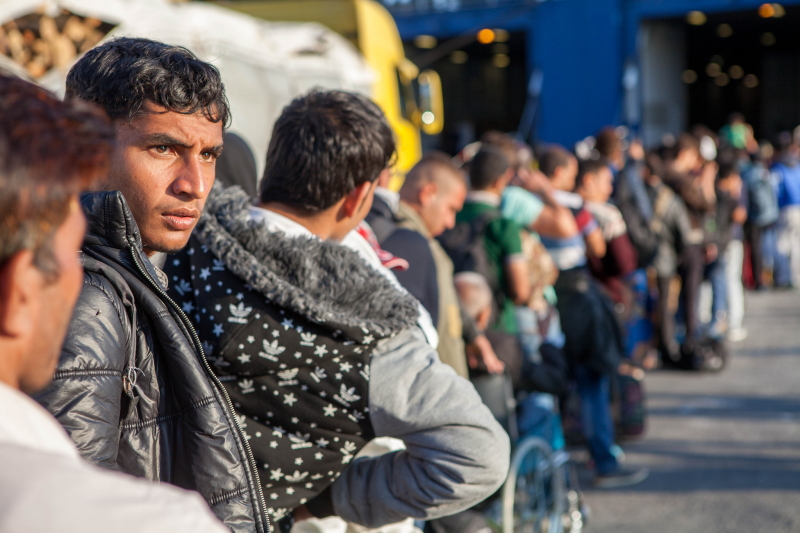
Apr 15, 2016 | Focolare Worldwide

Photo: CAFOD Photo Library
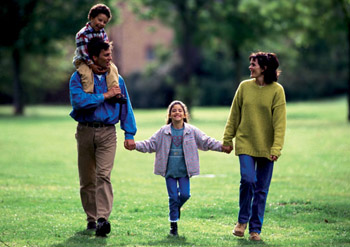
Apr 14, 2016 | Non categorizzato
 After the two Synods on the family, Amoris Laetitia finally announces the ideas of the Pope, this Pope. He is the Pope of mercy, who gathers the approval of those who declare to have “closed” their relations with the Church, or who do not profess any faith. The recent exhortation, set out in over 100 pages, really responds to the expectations of those who hoped in change – very evident on the pastoral level. The doctrinal one has remained unchanged – also for those most bound to tradition. It is a reaching out to all, also to those who find themselves in a so-called “irregular” position. For Pope Francis “no family is a perfect reality and packaged once and for always, but requires a gradual growth of its own capacity to love” (AL 325), as if it aims to remove the tendency to distinguish between ”regulars” and “irregulars” and wants to underline that nobody is condemned and excluded beyond repair. The most significant opening of Amoris Laetitia is certainly intended for the divorced who have remarried, which provides a path of growth in the capacity for discernment, accompanied by pastors or as also cited, by “lay persons who live in the service of the Lord” (AL 312) aware that they are called to “form consciences, and not replace them” (AL 37). It is a path which in certain cases, as stated in the 351st note of the exhortation, could lead also to access to the sacraments, since, the Pope underpins that the Eucharist “is not an award for the perfect, but a generous balm and a nutriment for the weak.” But if the media’s attention is caught precisely by these ‘openings’ to the remarried, it is 4 and 5 (on the beauty of the family that draws inspiration from the Trinitarian design and nurtures on that charity St. Paul spoke about in Cor 1,13) that its merit goes beyond. The centrality of the life of the couples is presented here as never before: “It is the direct encounter face to face with a “thou” who reflects God’s love and is man’s best possession, or as the spouse of the Canticle of Canticles exclaims in a stupendous profession of love in reciprocity: ‘My beloved is mine and I am his. I am my beloved’s and my beloved is mine.” (AL 12-13). «…we often present marriage in such a way that its unitive meaning, call to grow in love and ideal of mutual assistance are overshadowed by an almost exclusive insistence on the duty of procreation.» (AL 36). We need a healthy dose of self-criticism, in our attempt to valorize the eros imbued in creatures, showing marriage in its concrete reality as a “mixture of joys and struggles, tensions and repose, suffering and liberations, satisfactions and longings, and annoyances and pleasures. » (Al 126). Every moment of daily life is highlighted, overcoming the contrast between sacred and profane, and between solemn and unimportant events, since nothing is secondary in the eyes of love and faith. The Pope also takes into account the longer life spans and the initial decision of the spouses that has to be daily renewed» (AL 163), in a continual regeneration and change as each progresses along the path of personal growth and development: «There is no guarantee that we will feel the same way all through life. Yet if a couple can come up with a shared and lasting project, they can love one another and live as one until death do them part, enjoying an enriching intimacy.» (AL 163). Thank you Pope Francis! We really needed the loving care of the Church which continues to present to spouses the high ideal and model of the Trinitarian harmony which has never been reached, and also for the fraternal hand of the Church which stands by all of us, without rejecting anyone.
After the two Synods on the family, Amoris Laetitia finally announces the ideas of the Pope, this Pope. He is the Pope of mercy, who gathers the approval of those who declare to have “closed” their relations with the Church, or who do not profess any faith. The recent exhortation, set out in over 100 pages, really responds to the expectations of those who hoped in change – very evident on the pastoral level. The doctrinal one has remained unchanged – also for those most bound to tradition. It is a reaching out to all, also to those who find themselves in a so-called “irregular” position. For Pope Francis “no family is a perfect reality and packaged once and for always, but requires a gradual growth of its own capacity to love” (AL 325), as if it aims to remove the tendency to distinguish between ”regulars” and “irregulars” and wants to underline that nobody is condemned and excluded beyond repair. The most significant opening of Amoris Laetitia is certainly intended for the divorced who have remarried, which provides a path of growth in the capacity for discernment, accompanied by pastors or as also cited, by “lay persons who live in the service of the Lord” (AL 312) aware that they are called to “form consciences, and not replace them” (AL 37). It is a path which in certain cases, as stated in the 351st note of the exhortation, could lead also to access to the sacraments, since, the Pope underpins that the Eucharist “is not an award for the perfect, but a generous balm and a nutriment for the weak.” But if the media’s attention is caught precisely by these ‘openings’ to the remarried, it is 4 and 5 (on the beauty of the family that draws inspiration from the Trinitarian design and nurtures on that charity St. Paul spoke about in Cor 1,13) that its merit goes beyond. The centrality of the life of the couples is presented here as never before: “It is the direct encounter face to face with a “thou” who reflects God’s love and is man’s best possession, or as the spouse of the Canticle of Canticles exclaims in a stupendous profession of love in reciprocity: ‘My beloved is mine and I am his. I am my beloved’s and my beloved is mine.” (AL 12-13). «…we often present marriage in such a way that its unitive meaning, call to grow in love and ideal of mutual assistance are overshadowed by an almost exclusive insistence on the duty of procreation.» (AL 36). We need a healthy dose of self-criticism, in our attempt to valorize the eros imbued in creatures, showing marriage in its concrete reality as a “mixture of joys and struggles, tensions and repose, suffering and liberations, satisfactions and longings, and annoyances and pleasures. » (Al 126). Every moment of daily life is highlighted, overcoming the contrast between sacred and profane, and between solemn and unimportant events, since nothing is secondary in the eyes of love and faith. The Pope also takes into account the longer life spans and the initial decision of the spouses that has to be daily renewed» (AL 163), in a continual regeneration and change as each progresses along the path of personal growth and development: «There is no guarantee that we will feel the same way all through life. Yet if a couple can come up with a shared and lasting project, they can love one another and live as one until death do them part, enjoying an enriching intimacy.» (AL 163). Thank you Pope Francis! We really needed the loving care of the Church which continues to present to spouses the high ideal and model of the Trinitarian harmony which has never been reached, and also for the fraternal hand of the Church which stands by all of us, without rejecting anyone.
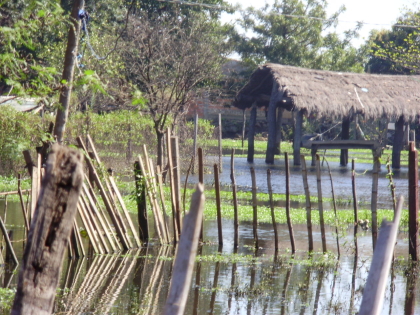
Apr 13, 2016 | Focolare Worldwide, Senza categoria
 “Scholars estimate that from 3000 BC, populations from the Southeast Asian continent arrived here. Among them were also the Guaranì people, composed of many ethnic groups that through the centuries spread to the Caribbean up to the southernmost tip of the continent,” explained Diana Durán, a Paraguayan sociologist and scholar of the aborigines of America. The meeting with a small community of the Avà Guaranì and Mbya ethnic groups came about two years ago, when a big flood of the Paraguay river forced the indigenous group of 33 families (115 members) to abandon the unsteady settlement on the banks of the river where they used to live by gathering wastes from the dumpsite nearby. “At the start we tried to help them with clothing, food, medicine, and healthcare, like the hospitalisation of a diabetic patient, intervening with one of them who had gunshot wounds, renting mobile toilettes when they were sent away to a desert area, or when, after a storm we collected tents and drinking water… and yet we saw that these actions were still insufficient. They needed a piece of land, that could give them shelter and security.“ After a long search, a suitable lot was found: 5.5 hectares at 4.5 km from the city of Ita, with a school and medical dispensary close by. All was surrounded by greens and above all, with the possibility to cultivate a community orchard for their self-support and the space to build a facility for educational courses. The challenge now is to find the finances to buy the land. “We knocked on many doors – Diana recounts. A qualified person helped us to obtain the juridical status as an Indigenous Community, so they would be entitled ownership of the property. Furthermore, a friend of the Mennonite Community offered to advance the payment of the land, which seemed impossible for us to do. We undertook, with our Avà friends, to pay back the money by instalment.” “God has looked on us with special love», the head of the community, Bernardo Benítez, said. It was a God who they regard as the “First and Foremost God,” whose main command is mutual love. He is present in the daily acts and gave this land, a sacred place to protect and where we can build fraternal relationships. “Standing by the Yary Mirì community also means suffering – Dian affirmed – due to the discrimination they suffer because of ancestral prejudices, and the misery they live in. But it is a joy to acknowledge and share the community and solidarity values they have conserved through the centuries, besides the love and trust that has been established between us and them. Today we are not alone but have the support of many friends, two associations linked to the Focolare (Unipar and Yvy Porà) that support the development of the community orchard), two bishops, some officers from financial institutions, two Mennonite Christians and the Indigeneous Pastoral. We obtained four scholarships in Educational Sciences for their leader and three youths. They themselves chose that faculty ‘because our people need education,’ they said.” “I am now writing a book on the history of their community – Diana Durán concluded – not only as a denunciation and to give a voice to those who have no say, but as an obligation to them for what they have suffered and what we owe to them. I consider it a step towards universal brotherhood, our Ideal.”
“Scholars estimate that from 3000 BC, populations from the Southeast Asian continent arrived here. Among them were also the Guaranì people, composed of many ethnic groups that through the centuries spread to the Caribbean up to the southernmost tip of the continent,” explained Diana Durán, a Paraguayan sociologist and scholar of the aborigines of America. The meeting with a small community of the Avà Guaranì and Mbya ethnic groups came about two years ago, when a big flood of the Paraguay river forced the indigenous group of 33 families (115 members) to abandon the unsteady settlement on the banks of the river where they used to live by gathering wastes from the dumpsite nearby. “At the start we tried to help them with clothing, food, medicine, and healthcare, like the hospitalisation of a diabetic patient, intervening with one of them who had gunshot wounds, renting mobile toilettes when they were sent away to a desert area, or when, after a storm we collected tents and drinking water… and yet we saw that these actions were still insufficient. They needed a piece of land, that could give them shelter and security.“ After a long search, a suitable lot was found: 5.5 hectares at 4.5 km from the city of Ita, with a school and medical dispensary close by. All was surrounded by greens and above all, with the possibility to cultivate a community orchard for their self-support and the space to build a facility for educational courses. The challenge now is to find the finances to buy the land. “We knocked on many doors – Diana recounts. A qualified person helped us to obtain the juridical status as an Indigenous Community, so they would be entitled ownership of the property. Furthermore, a friend of the Mennonite Community offered to advance the payment of the land, which seemed impossible for us to do. We undertook, with our Avà friends, to pay back the money by instalment.” “God has looked on us with special love», the head of the community, Bernardo Benítez, said. It was a God who they regard as the “First and Foremost God,” whose main command is mutual love. He is present in the daily acts and gave this land, a sacred place to protect and where we can build fraternal relationships. “Standing by the Yary Mirì community also means suffering – Dian affirmed – due to the discrimination they suffer because of ancestral prejudices, and the misery they live in. But it is a joy to acknowledge and share the community and solidarity values they have conserved through the centuries, besides the love and trust that has been established between us and them. Today we are not alone but have the support of many friends, two associations linked to the Focolare (Unipar and Yvy Porà) that support the development of the community orchard), two bishops, some officers from financial institutions, two Mennonite Christians and the Indigeneous Pastoral. We obtained four scholarships in Educational Sciences for their leader and three youths. They themselves chose that faculty ‘because our people need education,’ they said.” “I am now writing a book on the history of their community – Diana Durán concluded – not only as a denunciation and to give a voice to those who have no say, but as an obligation to them for what they have suffered and what we owe to them. I consider it a step towards universal brotherhood, our Ideal.”
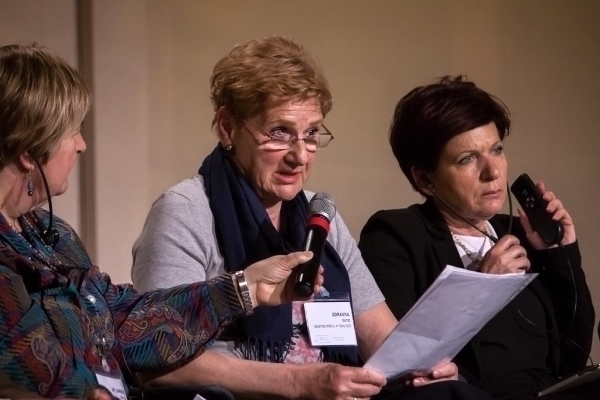
Apr 12, 2016 | Focolare Worldwide
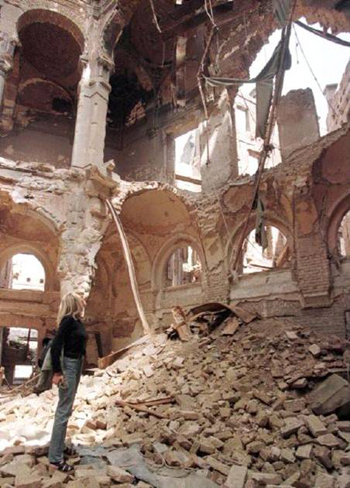 “I come from Sarajevo, Bosnia and Erzegovina, where for centuries, Bosnian Muslims, Croatian Catholics, Orthodox Serbs, Jews, Romani ethnic groups and others have lived alongside one another. The war of the 1990s that wanted to convince us that it is impossible to live together, only wrought thousands of victims, a million refugees, and devastation of cities, religious buildings and historical monuments. In our condominium there were Croatians, Serbs, and Bosnian Muslims, but we shared everything we had with one another, up to the last cigarette, the little oil, flour, coffee and also the pain of death. My husband who was working as an amateur radio technician in the State institutions, had installed a radio station to connect the people who, for months, due to the interruption of telephone lines, knew nothing about their loved ones. When the conflict ended, I started to get involved in politics, in the Social Democratic Party and became a candidate for the post of municipal councilor. The consequences of the war were terrible. In that period, a mayor from Sarayevo received an invitation to participate in the meeting “Together for Europe” in Stuttgart, and delegated me since he couldn’t go. It was then that I was introduced to the Focolare Movement, the people who live to bring unity to humanity. You may well imagine what this meant for me, coming from a war experience. On returning home I felt a great urge to live and fight to diffuse the ideals I had just met. Now, after 20 years, in our city we are still mourning our dead, and rebuilding what was destroyed, but we are also building bridges between people. We do this together, without hatred. And precisely in these days Sarajevo is celebrating the 20th anniversary of the end of the siege of the city, which lasted 1,425 days during which 12,000 civilians were killed, out of which 1,500 were children. The city’s wounds have now healed and it has regained its long lost spirit. The bells ring and prayer arising from the minarets of the mosques echo in the squares. Since I am an agnostic, I found myself involved in the dialogue started by Chiara Lubich with people who have no religious beliefs. I try to weave this network of communion and mutual comprehension in my city, with the Muslim cities nearby, and with the Catholics – for example, during the visit of Pope Francis, and with the people of various beliefs. Today in Sarajevo there is a group of young people, also of different faiths and cultures, who are also trying to diffuse the culture of dialogue.
“I come from Sarajevo, Bosnia and Erzegovina, where for centuries, Bosnian Muslims, Croatian Catholics, Orthodox Serbs, Jews, Romani ethnic groups and others have lived alongside one another. The war of the 1990s that wanted to convince us that it is impossible to live together, only wrought thousands of victims, a million refugees, and devastation of cities, religious buildings and historical monuments. In our condominium there were Croatians, Serbs, and Bosnian Muslims, but we shared everything we had with one another, up to the last cigarette, the little oil, flour, coffee and also the pain of death. My husband who was working as an amateur radio technician in the State institutions, had installed a radio station to connect the people who, for months, due to the interruption of telephone lines, knew nothing about their loved ones. When the conflict ended, I started to get involved in politics, in the Social Democratic Party and became a candidate for the post of municipal councilor. The consequences of the war were terrible. In that period, a mayor from Sarayevo received an invitation to participate in the meeting “Together for Europe” in Stuttgart, and delegated me since he couldn’t go. It was then that I was introduced to the Focolare Movement, the people who live to bring unity to humanity. You may well imagine what this meant for me, coming from a war experience. On returning home I felt a great urge to live and fight to diffuse the ideals I had just met. Now, after 20 years, in our city we are still mourning our dead, and rebuilding what was destroyed, but we are also building bridges between people. We do this together, without hatred. And precisely in these days Sarajevo is celebrating the 20th anniversary of the end of the siege of the city, which lasted 1,425 days during which 12,000 civilians were killed, out of which 1,500 were children. The city’s wounds have now healed and it has regained its long lost spirit. The bells ring and prayer arising from the minarets of the mosques echo in the squares. Since I am an agnostic, I found myself involved in the dialogue started by Chiara Lubich with people who have no religious beliefs. I try to weave this network of communion and mutual comprehension in my city, with the Muslim cities nearby, and with the Catholics – for example, during the visit of Pope Francis, and with the people of various beliefs. Today in Sarajevo there is a group of young people, also of different faiths and cultures, who are also trying to diffuse the culture of dialogue.

Zdravka Gutic sharing her testimony at the convention in April 2016.
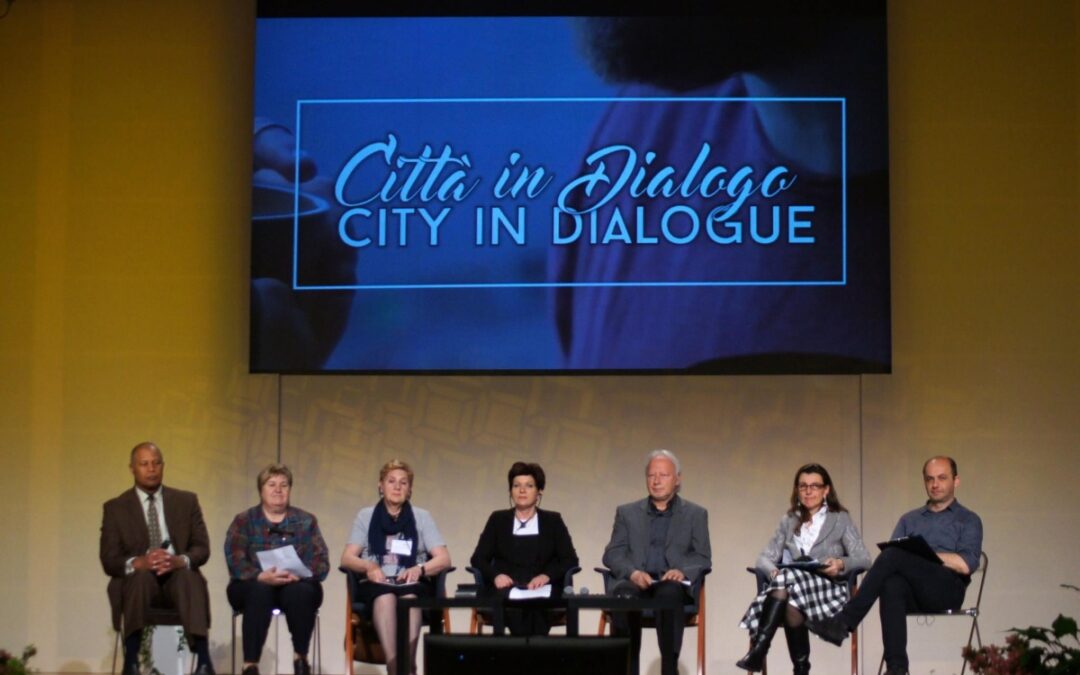
Apr 12, 2016 | Focolare Worldwide
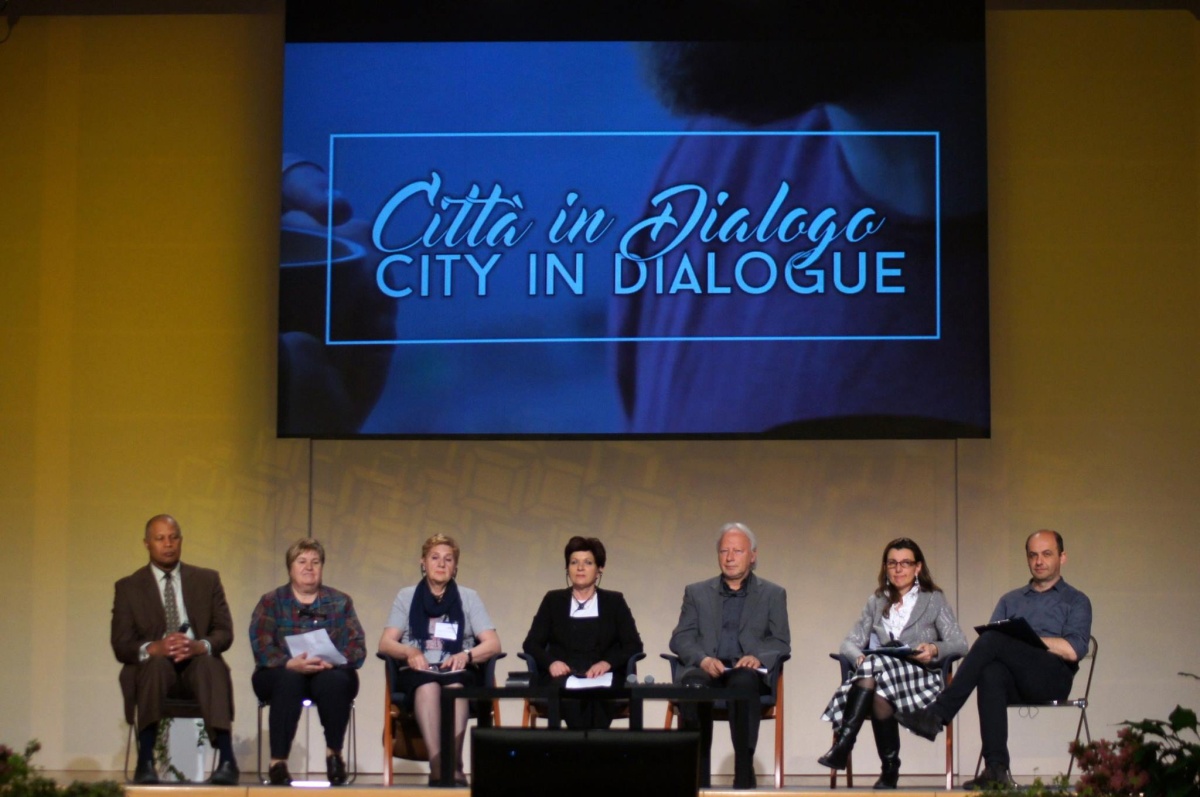 The line is long and quite boring. People of all ages from many parts of the world are patiently waiting for lunch as they share their thoughts and opinions about the morning. The first session of the OnCity – Networks of lights to inhabit the planet Conference has just concluded. The conference took place on April 1-3, 2016 and really showed the many lights that have been lit up in our cities. “Rather than dwelling on an analysis of the darkness,” says Lucia Fronza Crepaz who is the moderator, “we’ve decided to turn our attention to the dawn, to the rising sun.” OnCity is organised by the New Humanity Movement, Youth For a United World, and the United World Project which are Focolare agencies actively engaged in building a more united and fraternal world at the social level, amongst young and old and through support and development projects. Certainly the current news stories constantly cry out to us : bombings, terrorism, new forms of marginalisation and poverty, piecemeal wars. Our cities are experiencing problems and contradictions in front of our very eyes. But there are also very positive and well-established experiences which confirm that it is possible to work, to hope, to believe in a more supportive and fraternal city that would be more liveable for everyone. With this awareness the organisers set out to create a three-day event in which the nearly 900 participants would be given the opportunity to experience a new kind of city life with one another, that could be taken back to their home environments. It was an opportunity to examine the topics of solidarity and fraternity in order to be be able to interpret the changes we see taking place in the cities where we live, and to learn a lifestyle based on dialogue. OnCity played out in three plenary sessions, thematic seminars and a good 32 work groups which were useful for coming to an understanding of their ability to be active, creative and responsible citizens. Forty six presentations were squeezed into those days with the purpose of valuing and appreciating the networks that already exist and encouraging new ones where needed: starting up “cells of brotherhood” wherever we are. Source: Città Nuova online
The line is long and quite boring. People of all ages from many parts of the world are patiently waiting for lunch as they share their thoughts and opinions about the morning. The first session of the OnCity – Networks of lights to inhabit the planet Conference has just concluded. The conference took place on April 1-3, 2016 and really showed the many lights that have been lit up in our cities. “Rather than dwelling on an analysis of the darkness,” says Lucia Fronza Crepaz who is the moderator, “we’ve decided to turn our attention to the dawn, to the rising sun.” OnCity is organised by the New Humanity Movement, Youth For a United World, and the United World Project which are Focolare agencies actively engaged in building a more united and fraternal world at the social level, amongst young and old and through support and development projects. Certainly the current news stories constantly cry out to us : bombings, terrorism, new forms of marginalisation and poverty, piecemeal wars. Our cities are experiencing problems and contradictions in front of our very eyes. But there are also very positive and well-established experiences which confirm that it is possible to work, to hope, to believe in a more supportive and fraternal city that would be more liveable for everyone. With this awareness the organisers set out to create a three-day event in which the nearly 900 participants would be given the opportunity to experience a new kind of city life with one another, that could be taken back to their home environments. It was an opportunity to examine the topics of solidarity and fraternity in order to be be able to interpret the changes we see taking place in the cities where we live, and to learn a lifestyle based on dialogue. OnCity played out in three plenary sessions, thematic seminars and a good 32 work groups which were useful for coming to an understanding of their ability to be active, creative and responsible citizens. Forty six presentations were squeezed into those days with the purpose of valuing and appreciating the networks that already exist and encouraging new ones where needed: starting up “cells of brotherhood” wherever we are. Source: Città Nuova online
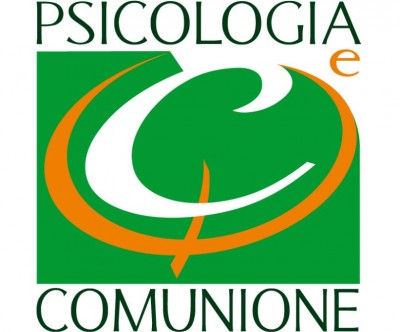
Apr 11, 2016 | Non categorizzato
 Organised by: Psychology and Communion Topic: “Psychology’s contribution to dialogue” Participants: 50-60 young psychologists from Brazil, Argentina, Chile and Europe. (Scholarships available for young students) Info: info@psy-com.org www.psy-com.org
Organised by: Psychology and Communion Topic: “Psychology’s contribution to dialogue” Participants: 50-60 young psychologists from Brazil, Argentina, Chile and Europe. (Scholarships available for young students) Info: info@psy-com.org www.psy-com.org
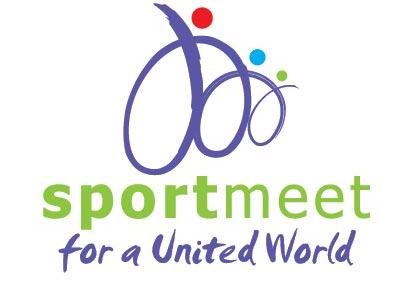
Apr 11, 2016 | Non categorizzato
 Organised by: Sportmeet and the Krizevci Kinesiology Association (a local association of physical education teachers from Croatia and Serbia). Participants: 50 teachers, young students and other professionals (Scholarships available for young students) Info: info@sportmeet.org www.sportmeet.org
Organised by: Sportmeet and the Krizevci Kinesiology Association (a local association of physical education teachers from Croatia and Serbia). Participants: 50 teachers, young students and other professionals (Scholarships available for young students) Info: info@sportmeet.org www.sportmeet.org

Apr 11, 2016 | Non categorizzato
 Organised by: Communion and Law The summer school dedicated mainly to law students and young professionals between the ages of 20 and 35, will provide an opportunity to be in direct contact with Sicily’s natural environment and the wave of refugees. The summer school is part of an ongoing process involving a group of young people and is meant to be a follow-up to the 2015 “Environment and Rights” conference held in Castel Gandolfo, Italy, in November 2015. Programme Info: info@comunionediritto.org www.comunionediritto.org
Organised by: Communion and Law The summer school dedicated mainly to law students and young professionals between the ages of 20 and 35, will provide an opportunity to be in direct contact with Sicily’s natural environment and the wave of refugees. The summer school is part of an ongoing process involving a group of young people and is meant to be a follow-up to the 2015 “Environment and Rights” conference held in Castel Gandolfo, Italy, in November 2015. Programme Info: info@comunionediritto.org www.comunionediritto.org
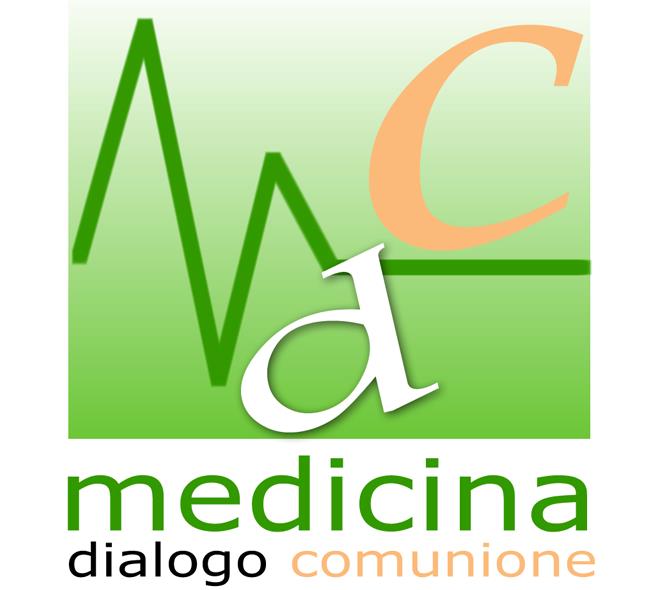
Apr 11, 2016 | Non categorizzato
 Organised by: Medicine, Dialogue, Communion Participants: bio-medical students and young professionals (Scholarships available for young students) Info: segr.med@focolare.org www.mdc-net.org
Organised by: Medicine, Dialogue, Communion Participants: bio-medical students and young professionals (Scholarships available for young students) Info: segr.med@focolare.org www.mdc-net.org
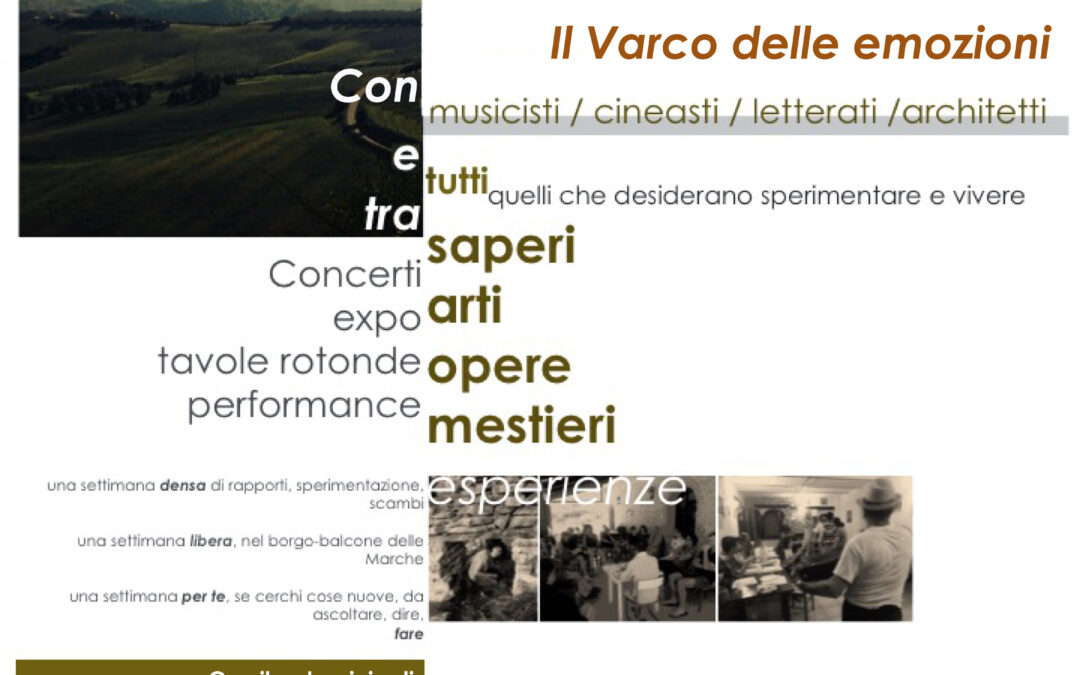
Apr 11, 2016 | Non categorizzato
Organised by: VARCO Cultural Association with support from Clarté and Dialogues in Architecture Participants: 20-30 adults and 30 young people (Scholarships available for young students) Info: segr.architettura@focolare.org segr.arte@focolare.org www.clarte.org www.dialoghinarchitettura.org 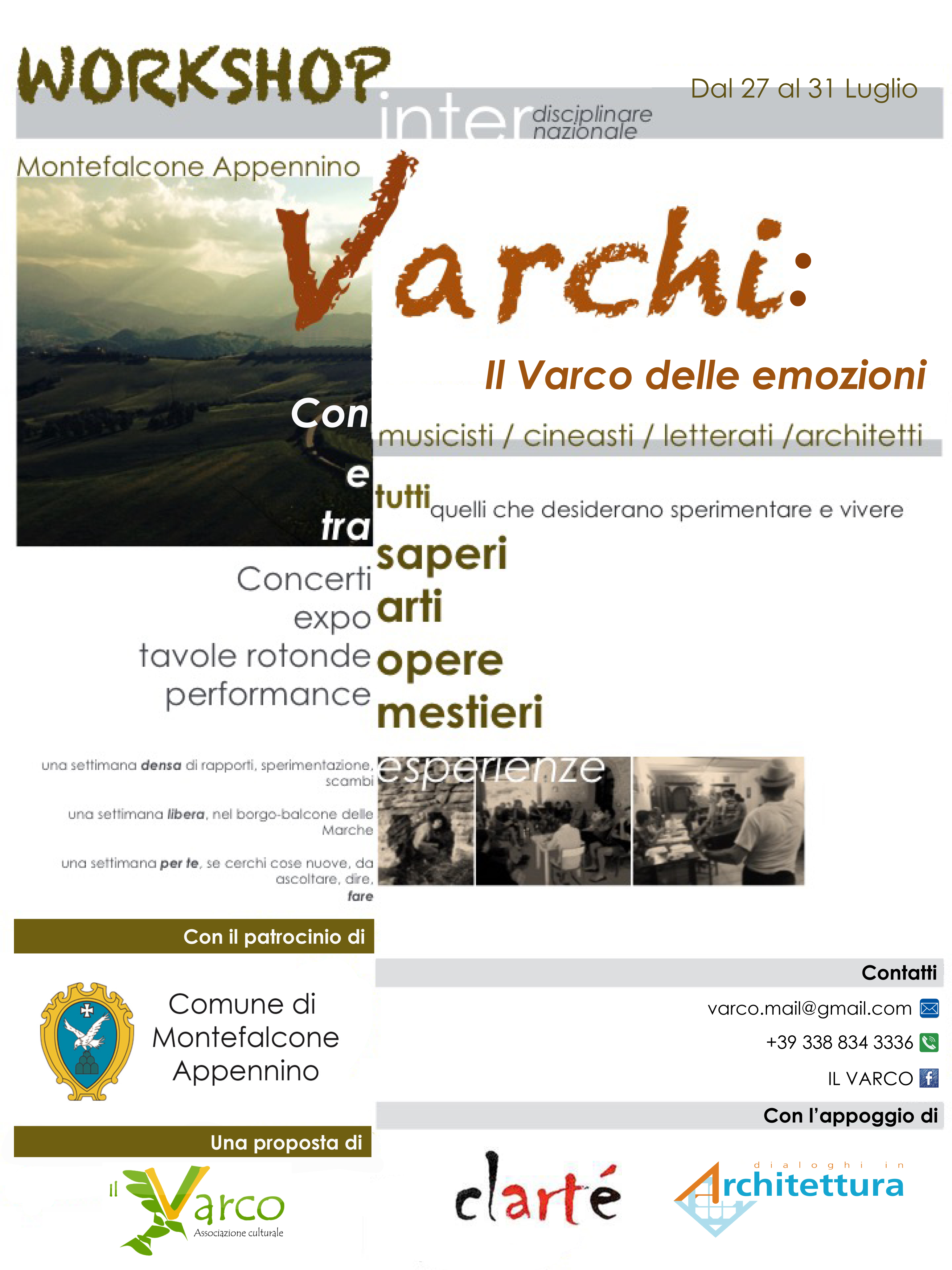
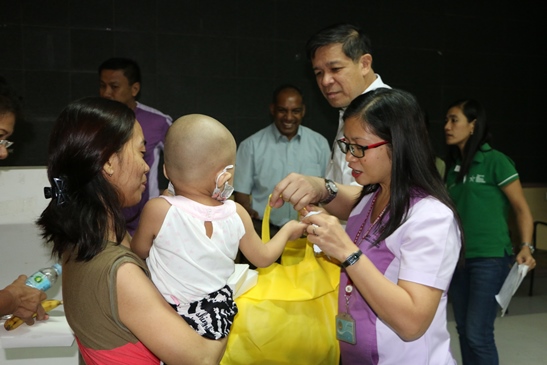
Apr 11, 2016 | Focolare Worldwide
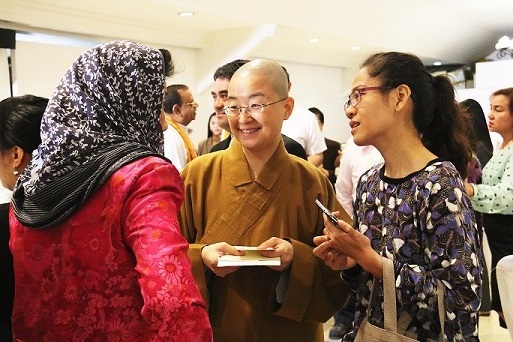
Breakfast Dialogue with Cardinal Tagle opens 2016 World Interfaith Harmony Week. Photo: Roman Catholic Archdiocese of Manila
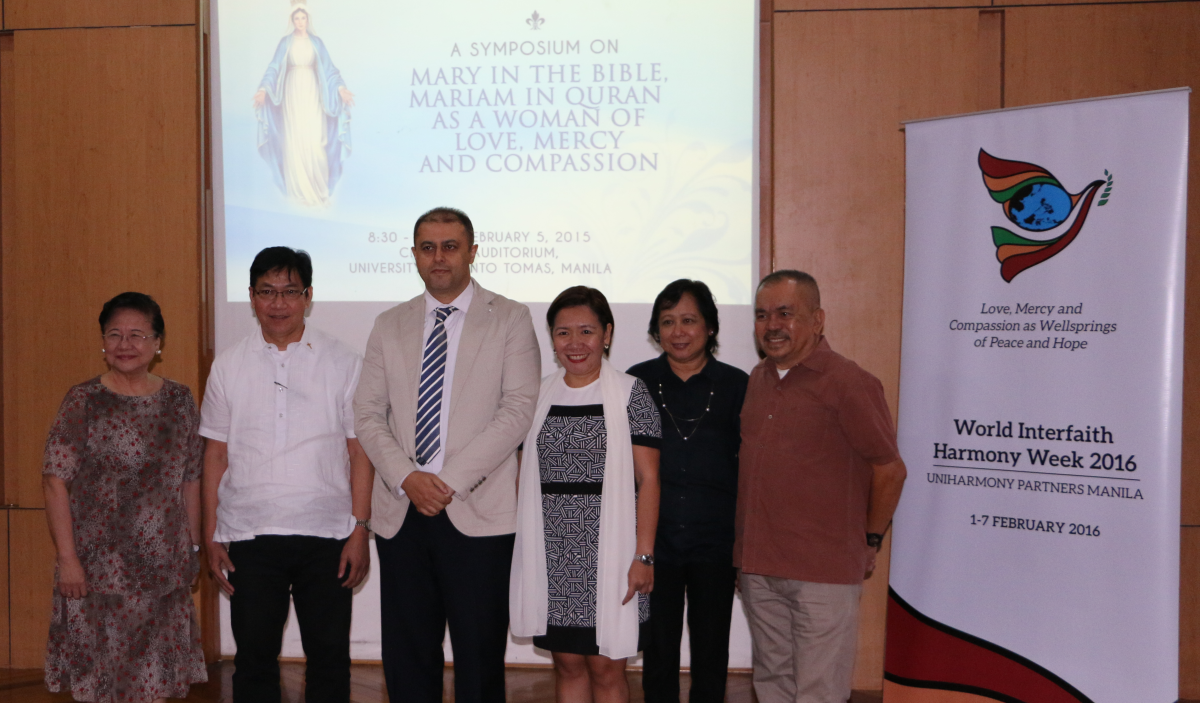 A joint symposium on Mary in the Bible and Mariam in Quran also proved to be quite interesting. The unanimous conclusion: Mary, woman of love, mercy and compassion, is a mother for all Christians and Muslims. Another significant event saw the attendance of 80 cancer patients and survivors. The opening remarks were based on the spirituality of Chiara Lubich. At the Fo Guang Shan Mabuhay Buddhist Temple the awards ceremony of a digital poster-making contest took place. It was organized with the Buddhist International Association – Manila, on the theme “Creating Peace and Hope through Acts of Goodness”.
A joint symposium on Mary in the Bible and Mariam in Quran also proved to be quite interesting. The unanimous conclusion: Mary, woman of love, mercy and compassion, is a mother for all Christians and Muslims. Another significant event saw the attendance of 80 cancer patients and survivors. The opening remarks were based on the spirituality of Chiara Lubich. At the Fo Guang Shan Mabuhay Buddhist Temple the awards ceremony of a digital poster-making contest took place. It was organized with the Buddhist International Association – Manila, on the theme “Creating Peace and Hope through Acts of Goodness”. 
At Sulyap ng Pag-asa Housing Project
https://www.youtube.com/watch?v=teamVMfAoKw
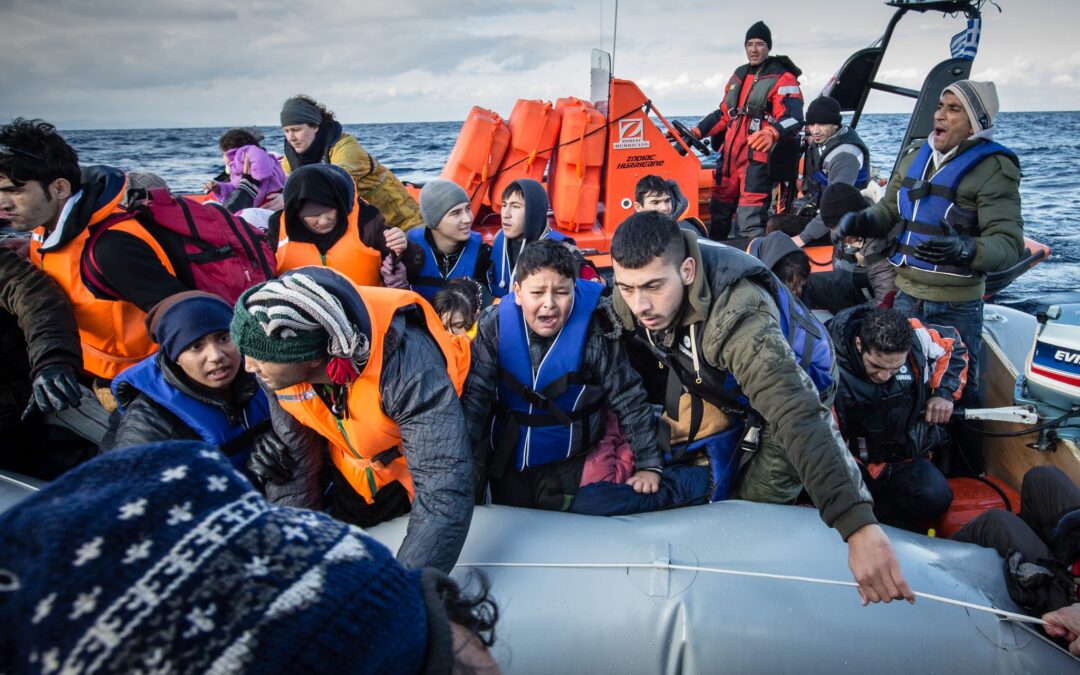
Apr 10, 2016 | Non categorizzato
 “While realizing that the foundation of the Gospel is charity… we did not immediately understand how to live it, nor with whom, nor to what degree we were to put it into practice. At the beginning, due mainly to the distressing circumstances of the war, we directed our love toward the poor. We were convinced that in those gaunt and, at times, repulsive faces, we could make out the face of the Lord. It was a real training. We were not accustomed to loving supernaturally. At most, we cared about our relatives or our friends in a spirit of warm respect or in a purely natural and healthy friendship. Now, under the impulse of grace, trusting in God and in his Providence which cares for the birds of the air and the flowers of the field, we addressed our attention to all the poor of the city. We invited them to our houses, to eat at our table… (…) When we could not receive them in our home, we arranged to meet them somewhere, and we gave them whatever we had managed to put together. We visited them in their dismal shacks and we comforted them and offered them medicines. The poor were truly the object of our love because for them and through them we could love Jesus. They became the concern also of those who had been attracted by our common ideal. As the community grew around the initial nucleus of the focolarine, the possibilities of helping, of assisting whoever suffered grew. And it was quite a sight to see tons of food, clothing and medicine arrive; it was an unusual abundance which, considering that we were in the last years of the war, clearly made the special intervention of divine Providence obvious to anyone. (…) These are small events which happen to whoever, being a follower of Jesus, experiences ‘Ask and it will be given to you’ (Mt 7:7). Nevertheless, they never ceased to amaze us. At the same time, we were encouraged by other extraordinary events experienced by our great brothers and sisters who had preceded us and who also knew—at a time when they were not yet saints—the difficulties encountered in the ascent to God, in the process of thawing the hardened human personality by the fire of Divine Love. Hadn’t Saint Catherine, in her love for the poor, given to one her mantle and to another the cross on her rosary? And hadn’t Jesus appeared to her in a vision the following nights to thank her for the gifts she had given to him in the poor? And didn’t St. Francis give away his cloak to the poor some thirty times? Surely, then, it was no great sacrifice for us to take off our gloves in the winter and offer them to somebody who needed to beg for hours out in the cold just to survive (…) Yet, in spite of everyone’s great generosity (…) it became clear that perhaps this was not the immediate goal for which the Lord had urged us to love in a concrete way. It was only later that we seemed to understand the Lord had urged us in this direction also for an intention of his own: it is in love and through the practice of love that one can better comprehend the things of heaven, and that God can more easily enlighten our souls. It was probably because of this concrete love that later on we understood that we didn’t have to turn only towards the poor but towards everyone indiscriminately. No doubt there were people who needed to be fed, to be given drink, to be clothed, but also those who needed to be educated, advised, put up with, or who were in need of our prayers…. The corporal and spiritual works of mercy opened up before us. Furthermore, they were the precise questions that the Judge of our lives would ask in order to decide our eternity. This thought immersed us in adoration considering the infinite love of Jesus who had revealed them to us when he came on earth so as to make it easier for us to get into heaven. (…) God was not asking us only to love the poor, but each and every neighbour, whoever they were, as we love ourselves. So if we came across someone who was weeping, we tried to weep with him and their cross was lightened. If someone rejoiced we rejoiced with them, and the joy was all the greater. ‘Rejoice with those who rejoice, weep with those who weep’ (Rom 12:15).” Chiara Lubich, May they all be one, New City Press, NY, 1984, pp.44-48.
“While realizing that the foundation of the Gospel is charity… we did not immediately understand how to live it, nor with whom, nor to what degree we were to put it into practice. At the beginning, due mainly to the distressing circumstances of the war, we directed our love toward the poor. We were convinced that in those gaunt and, at times, repulsive faces, we could make out the face of the Lord. It was a real training. We were not accustomed to loving supernaturally. At most, we cared about our relatives or our friends in a spirit of warm respect or in a purely natural and healthy friendship. Now, under the impulse of grace, trusting in God and in his Providence which cares for the birds of the air and the flowers of the field, we addressed our attention to all the poor of the city. We invited them to our houses, to eat at our table… (…) When we could not receive them in our home, we arranged to meet them somewhere, and we gave them whatever we had managed to put together. We visited them in their dismal shacks and we comforted them and offered them medicines. The poor were truly the object of our love because for them and through them we could love Jesus. They became the concern also of those who had been attracted by our common ideal. As the community grew around the initial nucleus of the focolarine, the possibilities of helping, of assisting whoever suffered grew. And it was quite a sight to see tons of food, clothing and medicine arrive; it was an unusual abundance which, considering that we were in the last years of the war, clearly made the special intervention of divine Providence obvious to anyone. (…) These are small events which happen to whoever, being a follower of Jesus, experiences ‘Ask and it will be given to you’ (Mt 7:7). Nevertheless, they never ceased to amaze us. At the same time, we were encouraged by other extraordinary events experienced by our great brothers and sisters who had preceded us and who also knew—at a time when they were not yet saints—the difficulties encountered in the ascent to God, in the process of thawing the hardened human personality by the fire of Divine Love. Hadn’t Saint Catherine, in her love for the poor, given to one her mantle and to another the cross on her rosary? And hadn’t Jesus appeared to her in a vision the following nights to thank her for the gifts she had given to him in the poor? And didn’t St. Francis give away his cloak to the poor some thirty times? Surely, then, it was no great sacrifice for us to take off our gloves in the winter and offer them to somebody who needed to beg for hours out in the cold just to survive (…) Yet, in spite of everyone’s great generosity (…) it became clear that perhaps this was not the immediate goal for which the Lord had urged us to love in a concrete way. It was only later that we seemed to understand the Lord had urged us in this direction also for an intention of his own: it is in love and through the practice of love that one can better comprehend the things of heaven, and that God can more easily enlighten our souls. It was probably because of this concrete love that later on we understood that we didn’t have to turn only towards the poor but towards everyone indiscriminately. No doubt there were people who needed to be fed, to be given drink, to be clothed, but also those who needed to be educated, advised, put up with, or who were in need of our prayers…. The corporal and spiritual works of mercy opened up before us. Furthermore, they were the precise questions that the Judge of our lives would ask in order to decide our eternity. This thought immersed us in adoration considering the infinite love of Jesus who had revealed them to us when he came on earth so as to make it easier for us to get into heaven. (…) God was not asking us only to love the poor, but each and every neighbour, whoever they were, as we love ourselves. So if we came across someone who was weeping, we tried to weep with him and their cross was lightened. If someone rejoiced we rejoiced with them, and the joy was all the greater. ‘Rejoice with those who rejoice, weep with those who weep’ (Rom 12:15).” Chiara Lubich, May they all be one, New City Press, NY, 1984, pp.44-48.
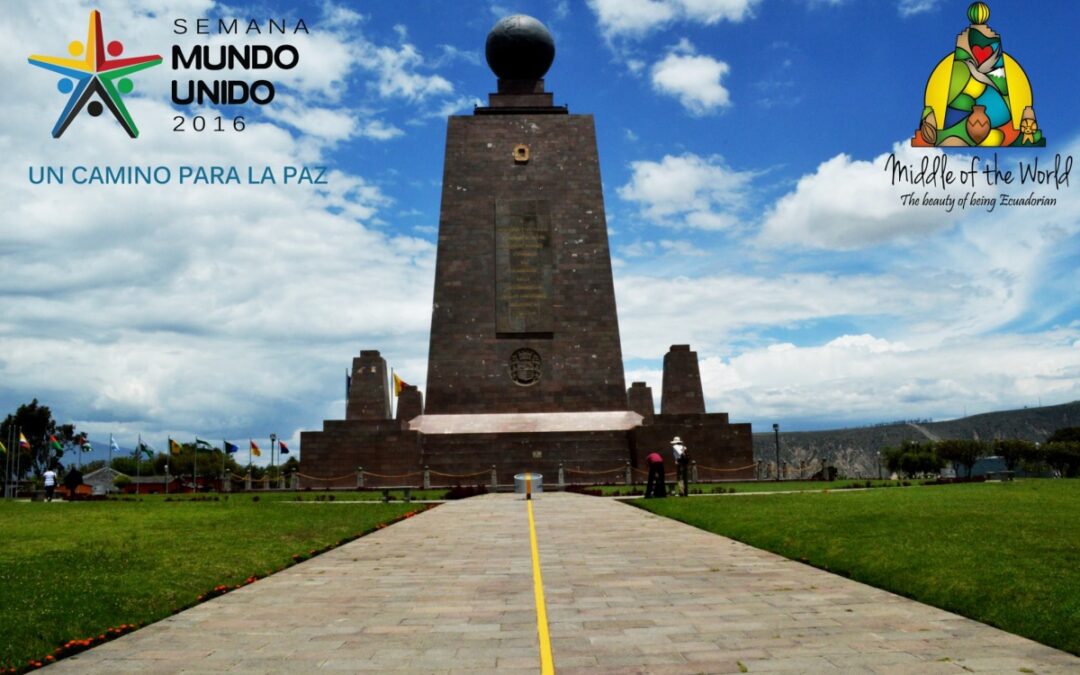
Apr 9, 2016 | Focolare Worldwide
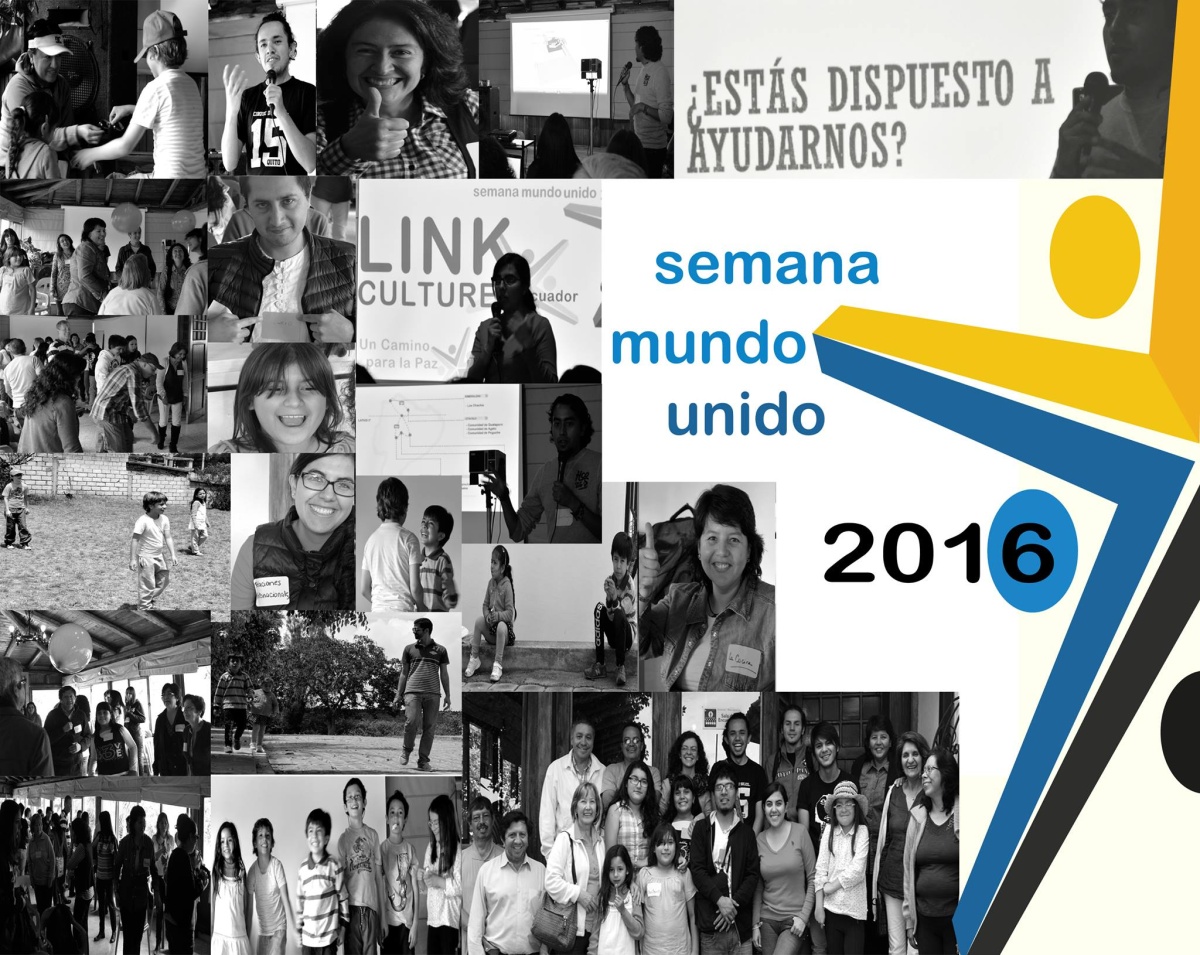 The centre of the 2016 United World Week will be Ecuador where interculturalism, peace and unity in diversity will be celebrated. Events will include opportunities to know and be enriched by the diversity of ethnic cultures in the country. The title of the event is: “LINK CULTURES – Un Camino para la Paz (A Path For Peace), and the overriding theme will be interculturalism that translates into dialogue with different ethnic cultures and recognises their dignity which makes us equals. The event will involve young people from many South American and European countries. Ecuador is strategically situated in the middle of the world. It has a population of some 15 million people and is divided into four main regions: the coastal lowlands, La Sierra, the East and the Galapagos Islands. The country is internationally known for the huge biodiversity, as well as for the multiculturalism of the population. Since 2008 the Ecuadoran Constitution has included interculturalism and multi-nationality and the defence of these characteristic features of the country, as well as the defence and promotion of “Sumak kawsay” (in the indigenous kichwa language, ‘good living’ in harmony with nature) and the rights of nature. UWW 2016 will have two parts. It will begin with a “traveling school” (May 1 – May 6) during which young people will visit several regions of Ecuador to have a living experience of interculturalism in the midst of different communities of the country. They will live and work amongst the local people, becoming more deeply acquainted with life in the South American land. The young people will choose between: Costa-La Sierra and Oriente-La Sierra. The former includes the provinces of Esmeraldas and Imbabura where the young people will have direct contact with the Gualapuro, Agato and Peguche communities. The latter includes the provinces of Pastaza, Tungurahua and Bolicar where they will meet the Shiwacocha, Kisapincha, Salasaka and Bolivar communities. Each stop is meant to be an opportunity to build relationships at different levels: with nature, with others and with themselves. Thus, the young people and the local people will be protagonists of real, true laboratories of community living in which they will be able to share, to learn, to experience and to become living witnesses to an exchange of gifts amongst different cultures.
The centre of the 2016 United World Week will be Ecuador where interculturalism, peace and unity in diversity will be celebrated. Events will include opportunities to know and be enriched by the diversity of ethnic cultures in the country. The title of the event is: “LINK CULTURES – Un Camino para la Paz (A Path For Peace), and the overriding theme will be interculturalism that translates into dialogue with different ethnic cultures and recognises their dignity which makes us equals. The event will involve young people from many South American and European countries. Ecuador is strategically situated in the middle of the world. It has a population of some 15 million people and is divided into four main regions: the coastal lowlands, La Sierra, the East and the Galapagos Islands. The country is internationally known for the huge biodiversity, as well as for the multiculturalism of the population. Since 2008 the Ecuadoran Constitution has included interculturalism and multi-nationality and the defence of these characteristic features of the country, as well as the defence and promotion of “Sumak kawsay” (in the indigenous kichwa language, ‘good living’ in harmony with nature) and the rights of nature. UWW 2016 will have two parts. It will begin with a “traveling school” (May 1 – May 6) during which young people will visit several regions of Ecuador to have a living experience of interculturalism in the midst of different communities of the country. They will live and work amongst the local people, becoming more deeply acquainted with life in the South American land. The young people will choose between: Costa-La Sierra and Oriente-La Sierra. The former includes the provinces of Esmeraldas and Imbabura where the young people will have direct contact with the Gualapuro, Agato and Peguche communities. The latter includes the provinces of Pastaza, Tungurahua and Bolicar where they will meet the Shiwacocha, Kisapincha, Salasaka and Bolivar communities. Each stop is meant to be an opportunity to build relationships at different levels: with nature, with others and with themselves. Thus, the young people and the local people will be protagonists of real, true laboratories of community living in which they will be able to share, to learn, to experience and to become living witnesses to an exchange of gifts amongst different cultures. 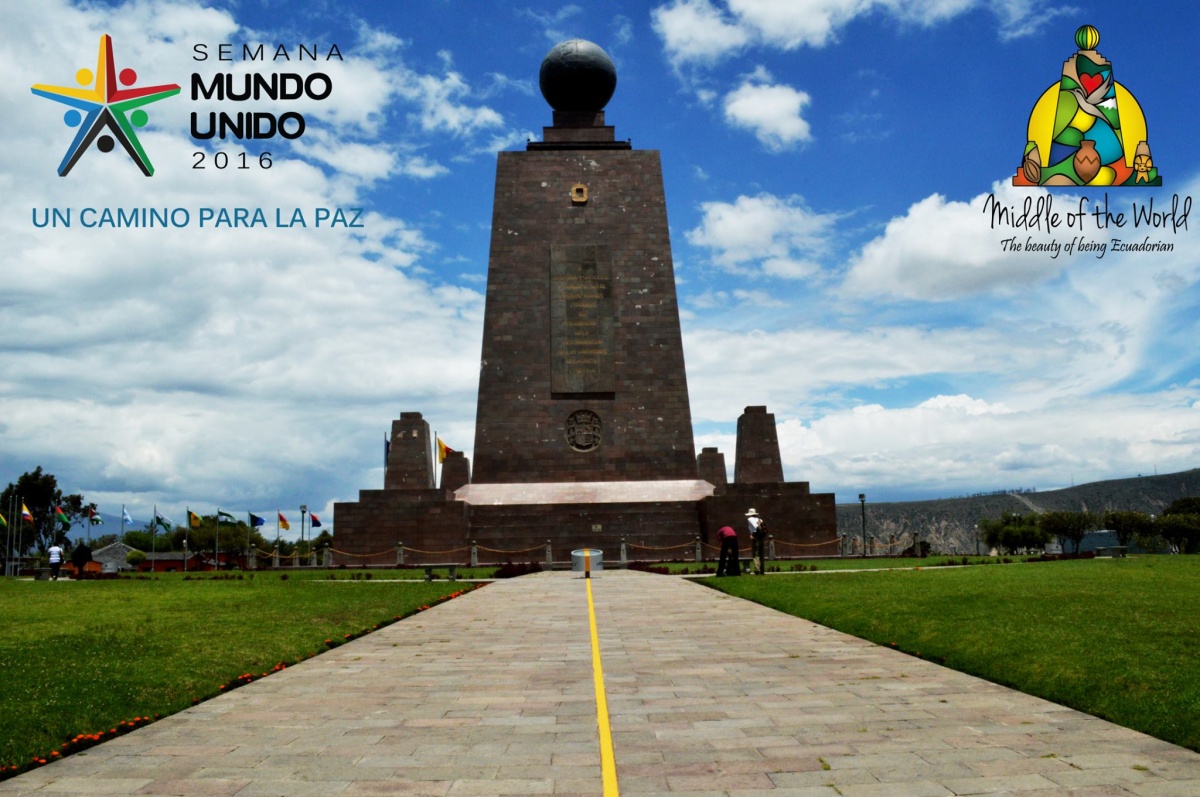 The second part (May 7) will be a Festival For Peace in the tourist region known as The Middle of the World, an Ecuadoran icon that is internationally famous. It will be a large event that will engage young people from many cultures, faiths and walks of life. The goal is to highlight fraternity in an intercultural context and to commit to living peace and unity in respect for differences, through the practice of the Golden Rule that invites us to “Do to others as you would have them do to you.” The Young For Unity in Ecuador is also promoting two contests, one for music and another for photography. They have high dreams of beginning a permanent Peace School. Simultaneous events will take place in other cities of the world during United World Week 2016, which will be led by the young peacemakers. Information: info@mundounido2016.com Official website: www.mundounido2016.com
The second part (May 7) will be a Festival For Peace in the tourist region known as The Middle of the World, an Ecuadoran icon that is internationally famous. It will be a large event that will engage young people from many cultures, faiths and walks of life. The goal is to highlight fraternity in an intercultural context and to commit to living peace and unity in respect for differences, through the practice of the Golden Rule that invites us to “Do to others as you would have them do to you.” The Young For Unity in Ecuador is also promoting two contests, one for music and another for photography. They have high dreams of beginning a permanent Peace School. Simultaneous events will take place in other cities of the world during United World Week 2016, which will be led by the young peacemakers. Information: info@mundounido2016.com Official website: www.mundounido2016.com
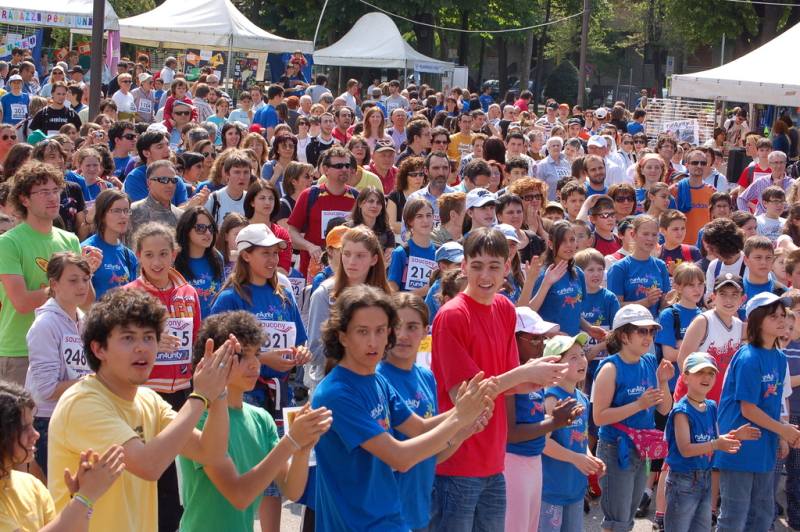
Apr 8, 2016 | Focolare Worldwide, Senza categoria
https://www.youtube.com/watch?v=fmnzghp0ghg&feature=youtu.be This year, the annual event promoted by the youth of the Focolare, which aims to involve the greatest number of people and institutions in the journey towards peace, will be centered in Quito, Ecuador. Intercultural dialogue will be the theme of the youth meeting to be held at the so-called “Other end of the world,” where one foot can be set on the aurora borealis hemisphere and the other on the austral hemisphere. Days of dialogue will ensue among youth of different cultures, along with working and sharing groups, and community tourism surrounded by verdant nature. All the information on the Ecuador programme can be found on www.mundounido2016.com. “Link Cultures – un camino para la paz” is the title that all the fraternal initiatives will have in common, to be held simultaneously throughout the world, uniting generations and cultures in a sole workshop, and can be traced through the hashtag #4peace. 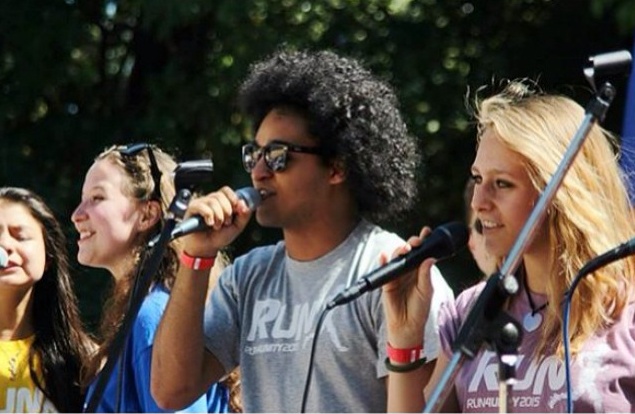 Some historical data. May ’95, the Genfest – a big world event of the Youth for a United World – ended with the launching of the United World Week (UWW): to contribute to the building of peaceful relationships of coexistence among different cultures and peoples, while respecting the identity of each community. A proposal to the public or private, national and international institutions, to highlight and uphold the initiatives that promote unity at every level, the UWW is an integral part of the United World Project. Twenty years after that historic event: a multitude of initiatives of the youth, adolescents and adults, were launched in these editions of the UWW that progressively became known to the general public, the mass media, and institutions worldwide. At all points of the planet, people were strongly attracted to the aim of convincing the world that “this is the time for brotherhood.” In 2010, a global link-up from Hungary paved the way to the UWW. In the 2011 edition the global streaming instead started from the small town of Sassello (Italy), hometown of Chiara Luce Badano, a young member of the Focolare who died in 1990 and was beatified in 2010. The UWW of 2012 preceded the Genfest held in Budapest (12,000 youth in the Sports Arena and 500,000 in a live streaming through the social networks). In 2013 the event was broadcasted from Jerusalem: 120 youth of 25 countries, Muslims, Christians and Jews, lived a strong experience of fraternity, which became a lifelong action plan for the country’s future. The “focus” of the United World Week 2014 was Nairobi, with the reciprocity construction site, “Sharing with Africa,” and the UWW 2015 entitled “Fabric, Flavour, Festival – discovering fraternity” that developed the theme of dialogue at all latitudes. The central event was enlivened by the Youth for a United World of Mumbay, India with the youth of the Hindu Shanti Ashram movement, an ulterior sign of how these events unite different peoples and religions.
Some historical data. May ’95, the Genfest – a big world event of the Youth for a United World – ended with the launching of the United World Week (UWW): to contribute to the building of peaceful relationships of coexistence among different cultures and peoples, while respecting the identity of each community. A proposal to the public or private, national and international institutions, to highlight and uphold the initiatives that promote unity at every level, the UWW is an integral part of the United World Project. Twenty years after that historic event: a multitude of initiatives of the youth, adolescents and adults, were launched in these editions of the UWW that progressively became known to the general public, the mass media, and institutions worldwide. At all points of the planet, people were strongly attracted to the aim of convincing the world that “this is the time for brotherhood.” In 2010, a global link-up from Hungary paved the way to the UWW. In the 2011 edition the global streaming instead started from the small town of Sassello (Italy), hometown of Chiara Luce Badano, a young member of the Focolare who died in 1990 and was beatified in 2010. The UWW of 2012 preceded the Genfest held in Budapest (12,000 youth in the Sports Arena and 500,000 in a live streaming through the social networks). In 2013 the event was broadcasted from Jerusalem: 120 youth of 25 countries, Muslims, Christians and Jews, lived a strong experience of fraternity, which became a lifelong action plan for the country’s future. The “focus” of the United World Week 2014 was Nairobi, with the reciprocity construction site, “Sharing with Africa,” and the UWW 2015 entitled “Fabric, Flavour, Festival – discovering fraternity” that developed the theme of dialogue at all latitudes. The central event was enlivened by the Youth for a United World of Mumbay, India with the youth of the Hindu Shanti Ashram movement, an ulterior sign of how these events unite different peoples and religions.  Run4Unity – Another novelty for this year is the involvement of the children: the world sports event Run4Unity, a relay race for peace which in the previous editions saw the participation of thousands of adolescents, from now on will be held annually as part of the United World Week. Run4Unity 2016 will take place on 8 May. The Youth for a United World hope that this international and travelling expo, now on its 20th year, will be recognised by the UN. The initiatives to be carried out throughout the year, and on which the United World Week will spotlight, are contained in the United World Project platform.
Run4Unity – Another novelty for this year is the involvement of the children: the world sports event Run4Unity, a relay race for peace which in the previous editions saw the participation of thousands of adolescents, from now on will be held annually as part of the United World Week. Run4Unity 2016 will take place on 8 May. The Youth for a United World hope that this international and travelling expo, now on its 20th year, will be recognised by the UN. The initiatives to be carried out throughout the year, and on which the United World Week will spotlight, are contained in the United World Project platform.
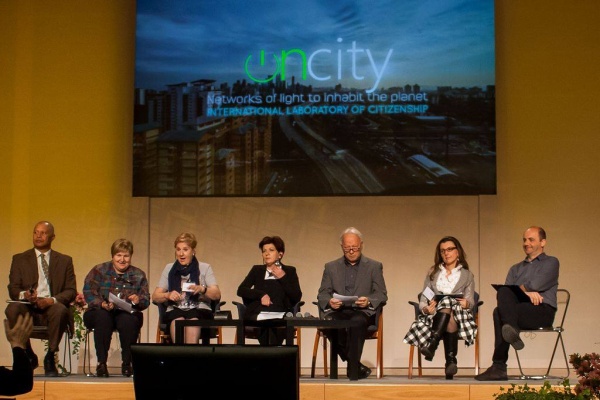
Apr 7, 2016 | Focolare Worldwide
 Nasri studied in Milan (Italy), to then specialise in Urban Sciences in Venice. Upon returning to his homeland 20 years ago, he was introduced to the Focolare Movement. According to him, this meeting changed his life. He now has three daughters who are 17, 15 and 13 years old. We met him on the occasion of the international OnCity, on public heritage assets (Castel Gandolfo 1-3 April). What challenges do you have to face daily in your homeland? “I work in the constructions sector. For political reasons we have a hard time renewing the 1970 town planning schemes. To open a new road or modify a route, we need permits, but the Israeli military authorities refuse to issue them.” Is it really possible to “love your enemy?” “It is not easy to be a real Christian in Palestine. In this sector the real enemy is the Israeli military authority, not the Jews! I respect the Jewish religion because we are all brothers, sons of God. But how can I love an Israeli soldier who kills me? And destroys our cities? Who occupies our territory? How can I live Christianity? I tried to discuss this with other Christians. I understood that if we are unable to love, we can at least try not to hate, and slowly, love will come. I stuck the words “do not hate” in my mind and heart and started to live them in my world. They have often been of help, for example, in smiling at a soldier, especially at the check point, since unfortunately, we Palestinians cannot move around freely. We are surrounded, like in a prison. Once, a captain asked me why I had smiled at him, though I was a Palestinian Arab. I answered: Jesus said “we have to love everyone,” and I love you. He was impressed, and did not know what to say. He let me pass without checking me too much! Love exists, also in the heart of the Israeli occupiers as in the heart of every human being on earth. I do not blame them, because they are soldiers and have to obey orders. We leave the conflicts to the governments, and we as peoples can live together. But the youth find this difficult to accept, especially today where through the internet they see how the world is outside Palestine.” How do you manage with the Focolare Movement in the Holy Land? “I am a volunteer and active in the New Families. We promote activities in the various churches with the Christian Community in Bethlehem. I am a Greek-Orthodox and my wife is Catholic. We go to those in need: the elderly, abandoned children or the mentally ill who need to be loved. We try to do our best…” Are there Jews among those who are in contact with the Movement? “Many Jewish families are friends of ours. We hold meetings together. One of my daughters plays soccer. Through the Peres Center for Peace her team, along with the Israeli team, was invited by the Real Madrid. This was her first contact with Jewish peers, and it was a new experience. When she returned she said: «All the Jewish players are my friends.» We keep in touch also with many Muslim families: in Palestine, 99% are Muslim, and 1% is Christian. As members of the Focolare Movement, we have a very good relationship with the Muslims and also the Jews. This proves that it is possible to live together.” If you could give a m”ssage to the world, what do you desire most for your land? «Please remember us. There are Christian Palestinians who are suffering. We once formed 10% of the population, but the emigration of Christian Families has increased a lot. I fear that one day, there will not even be a Christian. Help us to solve this Palestinian problem. If peace is created in the Middle East, there will be peace for the whole world. We know what God’s will is, but we also need the will of human beings. It is a strategic point, rich in spirituality. We only need unity. If unity exists among these three religions, the Middle East would be in peace and be a model. This is the only message I want to give: let us live the words of Jesus to create peace and love, because we really need it.” Maria Chiara De Lorenzo
Nasri studied in Milan (Italy), to then specialise in Urban Sciences in Venice. Upon returning to his homeland 20 years ago, he was introduced to the Focolare Movement. According to him, this meeting changed his life. He now has three daughters who are 17, 15 and 13 years old. We met him on the occasion of the international OnCity, on public heritage assets (Castel Gandolfo 1-3 April). What challenges do you have to face daily in your homeland? “I work in the constructions sector. For political reasons we have a hard time renewing the 1970 town planning schemes. To open a new road or modify a route, we need permits, but the Israeli military authorities refuse to issue them.” Is it really possible to “love your enemy?” “It is not easy to be a real Christian in Palestine. In this sector the real enemy is the Israeli military authority, not the Jews! I respect the Jewish religion because we are all brothers, sons of God. But how can I love an Israeli soldier who kills me? And destroys our cities? Who occupies our territory? How can I live Christianity? I tried to discuss this with other Christians. I understood that if we are unable to love, we can at least try not to hate, and slowly, love will come. I stuck the words “do not hate” in my mind and heart and started to live them in my world. They have often been of help, for example, in smiling at a soldier, especially at the check point, since unfortunately, we Palestinians cannot move around freely. We are surrounded, like in a prison. Once, a captain asked me why I had smiled at him, though I was a Palestinian Arab. I answered: Jesus said “we have to love everyone,” and I love you. He was impressed, and did not know what to say. He let me pass without checking me too much! Love exists, also in the heart of the Israeli occupiers as in the heart of every human being on earth. I do not blame them, because they are soldiers and have to obey orders. We leave the conflicts to the governments, and we as peoples can live together. But the youth find this difficult to accept, especially today where through the internet they see how the world is outside Palestine.” How do you manage with the Focolare Movement in the Holy Land? “I am a volunteer and active in the New Families. We promote activities in the various churches with the Christian Community in Bethlehem. I am a Greek-Orthodox and my wife is Catholic. We go to those in need: the elderly, abandoned children or the mentally ill who need to be loved. We try to do our best…” Are there Jews among those who are in contact with the Movement? “Many Jewish families are friends of ours. We hold meetings together. One of my daughters plays soccer. Through the Peres Center for Peace her team, along with the Israeli team, was invited by the Real Madrid. This was her first contact with Jewish peers, and it was a new experience. When she returned she said: «All the Jewish players are my friends.» We keep in touch also with many Muslim families: in Palestine, 99% are Muslim, and 1% is Christian. As members of the Focolare Movement, we have a very good relationship with the Muslims and also the Jews. This proves that it is possible to live together.” If you could give a m”ssage to the world, what do you desire most for your land? «Please remember us. There are Christian Palestinians who are suffering. We once formed 10% of the population, but the emigration of Christian Families has increased a lot. I fear that one day, there will not even be a Christian. Help us to solve this Palestinian problem. If peace is created in the Middle East, there will be peace for the whole world. We know what God’s will is, but we also need the will of human beings. It is a strategic point, rich in spirituality. We only need unity. If unity exists among these three religions, the Middle East would be in peace and be a model. This is the only message I want to give: let us live the words of Jesus to create peace and love, because we really need it.” Maria Chiara De Lorenzo
Apr 6, 2016 | Focolare Worldwide
It will begin with a “Traveling school” (May 1 – May 6) during which young people will visit several regions of Ecuador to have a living experience of interculturalism in the midst of different communities of the country. They will live and work amongst the local people, becoming more deeply acquainted with life in the South American land. The young people will choose between: Costa-La Sierra and Oriente-La Sierra. The former includes the provinces of Esmeraldas and Imbabura where the young people will have direct contact with the Gualapuro, Agato and Peguche communities. The latter includes the provinces of Pastaza, Tungurahua and Bolicar where they will meet the Shiwacocha, Kisapincha, Salasaka and Bolivar communities. Each stop is meant to be an opportunity to build relationships at different levels: with nature, with others and with themselves. Thus, the young people and the local people will be protagonists of real, true laboratories of community living in which they will be able to share, to learn, to experience and to become living witnesses to an exchange of gifts amongst different cultures. The second part (May 7) will be a Festival For Peace in the tourist region known as The Middle of the World, an Ecuadoran icon that is internationally famous. It will be a large event that will engage young people from many cultures, faiths and walks of life. The goal is to highlight fraternity in an intercultural context and to commit to living peace and unity in respect for differences, through the practice of the Golden Rule that invites us to “Do to others as you would have them do to you.” The Young For Unity in Ecuador is also promoting two contests, one for music and another for photography. They have high dreams of beginning a permanent Peace School. Information: info@mundounido2016.com Official website: www.mundounido2016.com
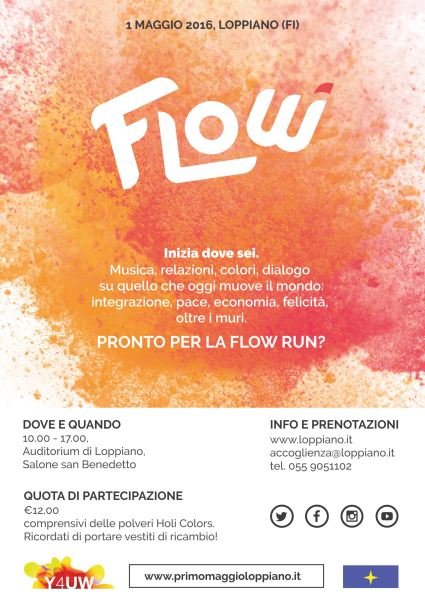
Apr 6, 2016 | Non categorizzato
 Info:www.primomaggio.it Live streaming from Loppiano
Info:www.primomaggio.it Live streaming from Loppiano
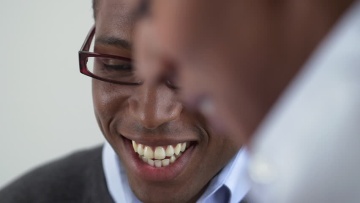
Apr 6, 2016 | Focolare Worldwide

Photo: Shutterstock

Apr 5, 2016 | Focolare Worldwide
 “March 22cnd will be forever marked by the cowardly attacks in the airport and in the metro in Brussels. They were actions of people who were not able to see love of neighbour as a priority in life, precisely during the days of Easter, a feast that proclaims: Love conquers all. It’s been a week in which feelings of deep hatred and a sense that God is requiring us to love every neighbour. That’s certainly not easy in moments like these. It’s in our nature to find perptrator. That’s what’s happening here in Belgium. We wonder where we went wrong and who was responsible for the radicalisation of that human being. It was also a week filled with novel questions for me. It’s been like constantly writing little letters to God and running every day to the mailbox to see if He’s answered them yet. It’s even worse when my own friends wonder why I still defend Muslims: ‘It’s all because of them,’ they say. ‘We should send them home. Why give to the refugees, and then they do away with us?’ I came to realize that I had to keep on doing the same exercise over and over again: to put myself in the skin of my friends who perhaps have not had the good fortune of experiencing God so near to them. Perhaps they haven’t realised that He is the only one that can give the answer: an answer of Love. They feel the fear that pushes them to prefer security and their own future. My effort was to show them the other side of the story: ‘Those people (the terrorists) aren’t Muslims. Islam embodies values that spread love. But when you try to do that, you are always met with resisitence. The wound is still fresh. I was hoping that I’d be able to bring enough healing to the wounds, but a complete cure will take time. This Good Friday I returned to my house weary and fed up with caring for “the wounds”. I can well imagine that it must have been a very hard week for the people who were on the front lines, caring for the wounded in body and in spirit. It is said that the young people of today don’t dare to express their faith. We no longer dare to talk about the things we believe in for fear of being cast from society. We no longer dare to do what we believe should be done. Perhaps it’s not fear of expressing ourselves, but tiredness because believing in Christian ideals is a tiring venture. The faith of Belgium is so exceptional and should muster up the strength to uphold its values. The young people choose to stop believing in order to avoid criticism. And this made me understand once more the strength of the ideal of peace and unity that Chiara Lubich taught us. It’s a sort of “cafe” for our weariness. It helps us to smile when we’re presented with cynical questions from our friends. These become opportunities for sharing our message . . . that’s the reason I follow Jesus! I’d like to ask God for more fire than I had before, a fire that lights candles in the hearts of young people. Candles that will enable us to look at one another in a positive light instead of criticising each other, so that the downward spiral will become an upward spiral and the faith will become a celebration rather than a preoccupation. A place where each of us can find the key to build a world in which attacks like those of March 22nd never happen again.”
“March 22cnd will be forever marked by the cowardly attacks in the airport and in the metro in Brussels. They were actions of people who were not able to see love of neighbour as a priority in life, precisely during the days of Easter, a feast that proclaims: Love conquers all. It’s been a week in which feelings of deep hatred and a sense that God is requiring us to love every neighbour. That’s certainly not easy in moments like these. It’s in our nature to find perptrator. That’s what’s happening here in Belgium. We wonder where we went wrong and who was responsible for the radicalisation of that human being. It was also a week filled with novel questions for me. It’s been like constantly writing little letters to God and running every day to the mailbox to see if He’s answered them yet. It’s even worse when my own friends wonder why I still defend Muslims: ‘It’s all because of them,’ they say. ‘We should send them home. Why give to the refugees, and then they do away with us?’ I came to realize that I had to keep on doing the same exercise over and over again: to put myself in the skin of my friends who perhaps have not had the good fortune of experiencing God so near to them. Perhaps they haven’t realised that He is the only one that can give the answer: an answer of Love. They feel the fear that pushes them to prefer security and their own future. My effort was to show them the other side of the story: ‘Those people (the terrorists) aren’t Muslims. Islam embodies values that spread love. But when you try to do that, you are always met with resisitence. The wound is still fresh. I was hoping that I’d be able to bring enough healing to the wounds, but a complete cure will take time. This Good Friday I returned to my house weary and fed up with caring for “the wounds”. I can well imagine that it must have been a very hard week for the people who were on the front lines, caring for the wounded in body and in spirit. It is said that the young people of today don’t dare to express their faith. We no longer dare to talk about the things we believe in for fear of being cast from society. We no longer dare to do what we believe should be done. Perhaps it’s not fear of expressing ourselves, but tiredness because believing in Christian ideals is a tiring venture. The faith of Belgium is so exceptional and should muster up the strength to uphold its values. The young people choose to stop believing in order to avoid criticism. And this made me understand once more the strength of the ideal of peace and unity that Chiara Lubich taught us. It’s a sort of “cafe” for our weariness. It helps us to smile when we’re presented with cynical questions from our friends. These become opportunities for sharing our message . . . that’s the reason I follow Jesus! I’d like to ask God for more fire than I had before, a fire that lights candles in the hearts of young people. Candles that will enable us to look at one another in a positive light instead of criticising each other, so that the downward spiral will become an upward spiral and the faith will become a celebration rather than a preoccupation. A place where each of us can find the key to build a world in which attacks like those of March 22nd never happen again.”
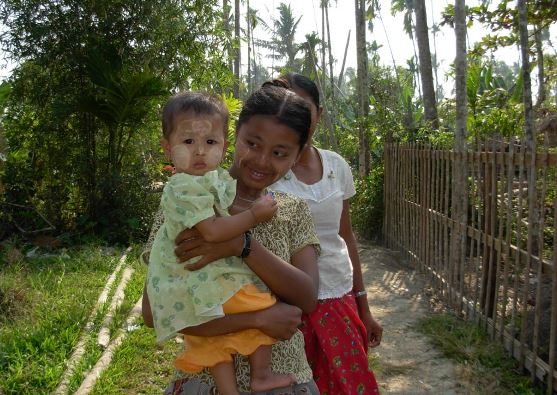
Apr 4, 2016 | Focolare Worldwide
 During the last visit to Taungoo, one of the regions where the Long Distance Support Project in Myanmar was launched, “we came to realise how many kids on Long Distance Support are now walking on their own,” writes the representative of AfnOnlus in Myanmar, Myanmar Vivienne Arpon. The visit by the local staff of Long Distance Support to the families of the children being supported was an opportunity to bring some concrete love and to better understand the difficulties they were facing. Marta had been abandoned by her husband when the children, Justin and Joseph, were small. Through the project she found the strength she needed to raise her family. When he finished school Justin won a scholarship in culinary arts at an Institute in Yangon, and Joseph became personnel assistant at a fabrics company. Philip and Anna’s family had been living in a slum in poor hygienic conditions. Long Distance Support has enabled them to live in a decent house and have a more dignified life. Although Philip is still studying, his parents have generously committed to support those who are worse off than they. “What gives us joy,” says Vienne, “is to notice how the improvement in the physical living conditions of these families has led to human and spiritual growth.” Since 2006 the project has expanded in response to requests for help from Eric, the Burmese coordinator. Thanks to the intervention of other NGOs it was possible to build a new school in Yenanchaung, the Magway region and find teachers and qualified personnel. The school children have been orphaned by HIV/AIDS or abandonment. Many of these teenagers have been able to find good jobs now, so that in addition to being financially independent they can even contribute something to their families. “We’re pretty confident,” Vivienne writes speaking to supporters, “that the future of these children is assured, not only because they can study, but because they felt the love from your side, which assures them. For all this, thank you very much for the sacrifices you have made. In fact, it is not always easy to live solidarity, but when you take into consideration those who are living in worse conditions than yours it can redimension your own needs and wants and can lead to a more sober lifestyle, perhaps even a freer life for yourself. One family from Messina, Italy writes of how their experience with long distance support with AFNonlus is enrichment for them that has opened them to the whole world. The boy they were supporting has grown up and, thanks to the support he received through the programme, is now working. Nevertheless, there are many other children living in conditions of need and the Sicilian family, in spite of the financial problems that everyone is going through, didn’t turn their backs on them. They decided to continue contributing their support: “With four children it isn’t easy to make ends meet. In spite of the uncertainty, we believe in this project and are very happy to offer some concrete help to people who are worse off than we are . . . in this case, little Vincenzo from Myanmar.” The Myanmar project extends through a territory which, due to environmental conditions and historic reasons was never developed adequately. Many families and children are victims of malnutrition and illness, such as malaria, tuberculosis and AIDS. With the support from contributors, the project is giving hope to people, offering a different future to the new generations and contributing to the human development of the population. For more information: The Focolare has been in the Asian world since 1966. Recent cultural and interreligious events have remembered those years: 50 anni di storia.
During the last visit to Taungoo, one of the regions where the Long Distance Support Project in Myanmar was launched, “we came to realise how many kids on Long Distance Support are now walking on their own,” writes the representative of AfnOnlus in Myanmar, Myanmar Vivienne Arpon. The visit by the local staff of Long Distance Support to the families of the children being supported was an opportunity to bring some concrete love and to better understand the difficulties they were facing. Marta had been abandoned by her husband when the children, Justin and Joseph, were small. Through the project she found the strength she needed to raise her family. When he finished school Justin won a scholarship in culinary arts at an Institute in Yangon, and Joseph became personnel assistant at a fabrics company. Philip and Anna’s family had been living in a slum in poor hygienic conditions. Long Distance Support has enabled them to live in a decent house and have a more dignified life. Although Philip is still studying, his parents have generously committed to support those who are worse off than they. “What gives us joy,” says Vienne, “is to notice how the improvement in the physical living conditions of these families has led to human and spiritual growth.” Since 2006 the project has expanded in response to requests for help from Eric, the Burmese coordinator. Thanks to the intervention of other NGOs it was possible to build a new school in Yenanchaung, the Magway region and find teachers and qualified personnel. The school children have been orphaned by HIV/AIDS or abandonment. Many of these teenagers have been able to find good jobs now, so that in addition to being financially independent they can even contribute something to their families. “We’re pretty confident,” Vivienne writes speaking to supporters, “that the future of these children is assured, not only because they can study, but because they felt the love from your side, which assures them. For all this, thank you very much for the sacrifices you have made. In fact, it is not always easy to live solidarity, but when you take into consideration those who are living in worse conditions than yours it can redimension your own needs and wants and can lead to a more sober lifestyle, perhaps even a freer life for yourself. One family from Messina, Italy writes of how their experience with long distance support with AFNonlus is enrichment for them that has opened them to the whole world. The boy they were supporting has grown up and, thanks to the support he received through the programme, is now working. Nevertheless, there are many other children living in conditions of need and the Sicilian family, in spite of the financial problems that everyone is going through, didn’t turn their backs on them. They decided to continue contributing their support: “With four children it isn’t easy to make ends meet. In spite of the uncertainty, we believe in this project and are very happy to offer some concrete help to people who are worse off than we are . . . in this case, little Vincenzo from Myanmar.” The Myanmar project extends through a territory which, due to environmental conditions and historic reasons was never developed adequately. Many families and children are victims of malnutrition and illness, such as malaria, tuberculosis and AIDS. With the support from contributors, the project is giving hope to people, offering a different future to the new generations and contributing to the human development of the population. For more information: The Focolare has been in the Asian world since 1966. Recent cultural and interreligious events have remembered those years: 50 anni di storia.

 “Where was I?” was the refrain of the song inspired by the migration tragedy, and sung by the Gen Verde on the stage of the May 1 event of Loppiano (Florence). The question resounded strongly among the 1,200 participants of the feast day, but it also pertained to commitment to suffering humanity, for example in Aleppo, with the escalation of bombs and deaths which have beset the city for the last 10 days, and likewise for the populations devastated by the earthquake in Ecuador, who asked to live and return to their normal lives. It is a commitment also of the multitude of associations and initiatives operating on the front of integration in Italy. “The aim of this day – explained the Youth for a United World – is to highlight the flow of initiatives undertaken throughout Italy, in the name of reception, lawfulness, politics lived as a service, and care for the environment, which in one word means: fraternity.” “Ever since the bombings started again, a chain of solidarity has begun among the people – Tarek of Aleppo, Syria, recounted. This reveals the quality of my people, who do not give up, but whose dignity is wounded. We say, stop the war, and ask with faith for the gift of peace.» Lubna instead explains: «In Jordan there are three million refugees, half of which are Syrians. They arrive with despair in their eyes, and the absence of hope. We try to share the life of fear they have faced, by giving them love and a sense of family.» Wa’el Suleiman, Director of Caritas in Jordan, addressed the people with a heartfelt appeal in a video shoot: «Work with us to stop the war, come to the Middle East and help us rebuild our countries, so that the people do not have to escape, and emigrate. We want to live in our lands.” Nahomy and Maria are both Ecuadorians, They recounted the extraordinary strength of their people: “The pain of those who had lost all their belongings, became the suffering of all. The inmates of a prison started to build wooden coffins, people of different political ideologies teamed up together, the cooks became heroes by preparing a warm meal for everyone, and the poor shared the little they had.” A festive atmosphere and lots of music accompanied the stories of the youth who have decided to actively take part in the building of a different world. “«I am weary of clashes, and diatribes in politics and also in daily life – a boy wrote on the great “wall” on which each could leave behind that part of himself that hinders the flow of fraternity – the only things I take interest in and for which I want to live are those things that unite and not those that divide us.”
“Where was I?” was the refrain of the song inspired by the migration tragedy, and sung by the Gen Verde on the stage of the May 1 event of Loppiano (Florence). The question resounded strongly among the 1,200 participants of the feast day, but it also pertained to commitment to suffering humanity, for example in Aleppo, with the escalation of bombs and deaths which have beset the city for the last 10 days, and likewise for the populations devastated by the earthquake in Ecuador, who asked to live and return to their normal lives. It is a commitment also of the multitude of associations and initiatives operating on the front of integration in Italy. “The aim of this day – explained the Youth for a United World – is to highlight the flow of initiatives undertaken throughout Italy, in the name of reception, lawfulness, politics lived as a service, and care for the environment, which in one word means: fraternity.” “Ever since the bombings started again, a chain of solidarity has begun among the people – Tarek of Aleppo, Syria, recounted. This reveals the quality of my people, who do not give up, but whose dignity is wounded. We say, stop the war, and ask with faith for the gift of peace.» Lubna instead explains: «In Jordan there are three million refugees, half of which are Syrians. They arrive with despair in their eyes, and the absence of hope. We try to share the life of fear they have faced, by giving them love and a sense of family.» Wa’el Suleiman, Director of Caritas in Jordan, addressed the people with a heartfelt appeal in a video shoot: «Work with us to stop the war, come to the Middle East and help us rebuild our countries, so that the people do not have to escape, and emigrate. We want to live in our lands.” Nahomy and Maria are both Ecuadorians, They recounted the extraordinary strength of their people: “The pain of those who had lost all their belongings, became the suffering of all. The inmates of a prison started to build wooden coffins, people of different political ideologies teamed up together, the cooks became heroes by preparing a warm meal for everyone, and the poor shared the little they had.” A festive atmosphere and lots of music accompanied the stories of the youth who have decided to actively take part in the building of a different world. “«I am weary of clashes, and diatribes in politics and also in daily life – a boy wrote on the great “wall” on which each could leave behind that part of himself that hinders the flow of fraternity – the only things I take interest in and for which I want to live are those things that unite and not those that divide us.”  Cristina Guarda, 25, a councilor of the Venice Region, talked about the reasons that drove her to ‘go out there’: “I have always been convinced that politics is what we build when we place ourselves at the service of others. I felt that it was time to get involved.” A phrase of Chiara Lubich introduced the round table that ended the morning. “If you want to transform a city, start by uniting with those who share your ideals. Together, look for the poor, the abandoned, orphans, prisoners, those who are marginalized, and give, always give: a comforting word, a smile, your time, your goods….”. Then came an overview of a variety of ideas-projects of the Youth for a United World in Italy: in Turin, in a small dormitory; in Florence, with a group of prisoners in the Gozzini Jail; in Syracuse, with the Summer Campus that will take place next summer, and which foresees support and recreational activities with problematic children and adolescents; in Naples and Caserta, the project, “Fraternity Workshops,” which has involved hundreds of kids from the peripheries at risk. The afternoon program proceeded with the Expo of the United World Project on disarmaments, the environment, economy of communion, art, culture with the Sophia University Institute, Slotmob, against gambling, intercultural and interreligious dialogue, etc. The day ended with the “FlowRun”: a run in several stages which culminates in an explosion of joy, music and colours, as if to demonstrate that enthusiasm and joy are essential for anyone who wants to attract others in the adventure of a world that is “for” and not “against” something. Source: Focolare-Loppiano nformation Service Photos on Flickr:
Cristina Guarda, 25, a councilor of the Venice Region, talked about the reasons that drove her to ‘go out there’: “I have always been convinced that politics is what we build when we place ourselves at the service of others. I felt that it was time to get involved.” A phrase of Chiara Lubich introduced the round table that ended the morning. “If you want to transform a city, start by uniting with those who share your ideals. Together, look for the poor, the abandoned, orphans, prisoners, those who are marginalized, and give, always give: a comforting word, a smile, your time, your goods….”. Then came an overview of a variety of ideas-projects of the Youth for a United World in Italy: in Turin, in a small dormitory; in Florence, with a group of prisoners in the Gozzini Jail; in Syracuse, with the Summer Campus that will take place next summer, and which foresees support and recreational activities with problematic children and adolescents; in Naples and Caserta, the project, “Fraternity Workshops,” which has involved hundreds of kids from the peripheries at risk. The afternoon program proceeded with the Expo of the United World Project on disarmaments, the environment, economy of communion, art, culture with the Sophia University Institute, Slotmob, against gambling, intercultural and interreligious dialogue, etc. The day ended with the “FlowRun”: a run in several stages which culminates in an explosion of joy, music and colours, as if to demonstrate that enthusiasm and joy are essential for anyone who wants to attract others in the adventure of a world that is “for” and not “against” something. Source: Focolare-Loppiano nformation Service Photos on Flickr: 






























 Salta: one of the more beautiful provinces of
Salta: one of the more beautiful provinces of 
 With 367 ayes and 137 nays, the Brazilian deputies approved the opening of the impeachment procedure against President Dilma Rousseff, while other 200 million greatly divided Brazilians, anxiously awaited the outcome of the voting session. It is now the Senate’s turn to confirm or not the implementation the indictment of the President. Should it be favourable, the vote of 11 May will suspend the President from her mandate for 6 months, while awaiting for the final verdict. The Brazilian constitution provides, in this case and for this length of time, that the Vice-President will assume the office. The Brazilian bishops in an
With 367 ayes and 137 nays, the Brazilian deputies approved the opening of the impeachment procedure against President Dilma Rousseff, while other 200 million greatly divided Brazilians, anxiously awaited the outcome of the voting session. It is now the Senate’s turn to confirm or not the implementation the indictment of the President. Should it be favourable, the vote of 11 May will suspend the President from her mandate for 6 months, while awaiting for the final verdict. The Brazilian constitution provides, in this case and for this length of time, that the Vice-President will assume the office. The Brazilian bishops in an 























 “While realizing that the foundation of the Gospel is charity… we did not immediately understand how to live it, nor with whom, nor to what degree we were to put it into practice. At the beginning, due mainly to the distressing circumstances of the war, we directed our love toward the poor. We were convinced that in those gaunt and, at times, repulsive faces, we could make out the face of the Lord. It was a real training. We were not accustomed to loving supernaturally. At most, we cared about our relatives or our friends in a spirit of warm respect or in a purely natural and healthy friendship. Now, under the impulse of grace, trusting in God and in his Providence which cares for the birds of the air and the flowers of the field, we addressed our attention to all the poor of the city. We invited them to our houses, to eat at our table… (…) When we could not receive them in our home, we arranged to meet them somewhere, and we gave them whatever we had managed to put together. We visited them in their dismal shacks and we comforted them and offered them medicines. The poor were truly the object of our love because for them and through them we could love Jesus. They became the concern also of those who had been attracted by our common ideal. As the community grew around the initial nucleus of the focolarine, the possibilities of helping, of assisting whoever suffered grew. And it was quite a sight to see tons of food, clothing and medicine arrive; it was an unusual abundance which, considering that we were in the last years of the war, clearly made the special intervention of divine Providence obvious to anyone. (…) These are small events which happen to whoever, being a follower of Jesus, experiences ‘Ask and it will be given to you’ (Mt 7:7). Nevertheless, they never ceased to amaze us. At the same time, we were encouraged by other extraordinary events experienced by our great brothers and sisters who had preceded us and who also knew—at a time when they were not yet saints—the difficulties encountered in the ascent to God, in the process of thawing the hardened human personality by the fire of Divine Love. Hadn’t Saint Catherine, in her love for the poor, given to one her mantle and to another the cross on her rosary? And hadn’t Jesus appeared to her in a vision the following nights to thank her for the gifts she had given to him in the poor? And didn’t St. Francis give away his cloak to the poor some thirty times? Surely, then, it was no great sacrifice for us to take off our gloves in the winter and offer them to somebody who needed to beg for hours out in the cold just to survive (…) Yet, in spite of everyone’s great generosity (…) it became clear that perhaps this was not the immediate goal for which the Lord had urged us to love in a concrete way. It was only later that we seemed to understand the Lord had urged us in this direction also for an intention of his own: it is in love and through the practice of love that one can better comprehend the things of heaven, and that God can more easily enlighten our souls. It was probably because of this concrete love that later on we understood that we didn’t have to turn only towards the poor but towards everyone indiscriminately. No doubt there were people who needed to be fed, to be given drink, to be clothed, but also those who needed to be educated, advised, put up with, or who were in need of our prayers…. The corporal and spiritual works of mercy opened up before us. Furthermore, they were the precise questions that the Judge of our lives would ask in order to decide our eternity. This thought immersed us in adoration considering the infinite love of Jesus who had revealed them to us when he came on earth so as to make it easier for us to get into heaven. (…) God was not asking us only to love the poor, but each and every neighbour, whoever they were, as we love ourselves. So if we came across someone who was weeping, we tried to weep with him and their cross was lightened. If someone rejoiced we rejoiced with them, and the joy was all the greater. ‘Rejoice with those who rejoice, weep with those who weep’ (Rom 12:15).”
“While realizing that the foundation of the Gospel is charity… we did not immediately understand how to live it, nor with whom, nor to what degree we were to put it into practice. At the beginning, due mainly to the distressing circumstances of the war, we directed our love toward the poor. We were convinced that in those gaunt and, at times, repulsive faces, we could make out the face of the Lord. It was a real training. We were not accustomed to loving supernaturally. At most, we cared about our relatives or our friends in a spirit of warm respect or in a purely natural and healthy friendship. Now, under the impulse of grace, trusting in God and in his Providence which cares for the birds of the air and the flowers of the field, we addressed our attention to all the poor of the city. We invited them to our houses, to eat at our table… (…) When we could not receive them in our home, we arranged to meet them somewhere, and we gave them whatever we had managed to put together. We visited them in their dismal shacks and we comforted them and offered them medicines. The poor were truly the object of our love because for them and through them we could love Jesus. They became the concern also of those who had been attracted by our common ideal. As the community grew around the initial nucleus of the focolarine, the possibilities of helping, of assisting whoever suffered grew. And it was quite a sight to see tons of food, clothing and medicine arrive; it was an unusual abundance which, considering that we were in the last years of the war, clearly made the special intervention of divine Providence obvious to anyone. (…) These are small events which happen to whoever, being a follower of Jesus, experiences ‘Ask and it will be given to you’ (Mt 7:7). Nevertheless, they never ceased to amaze us. At the same time, we were encouraged by other extraordinary events experienced by our great brothers and sisters who had preceded us and who also knew—at a time when they were not yet saints—the difficulties encountered in the ascent to God, in the process of thawing the hardened human personality by the fire of Divine Love. Hadn’t Saint Catherine, in her love for the poor, given to one her mantle and to another the cross on her rosary? And hadn’t Jesus appeared to her in a vision the following nights to thank her for the gifts she had given to him in the poor? And didn’t St. Francis give away his cloak to the poor some thirty times? Surely, then, it was no great sacrifice for us to take off our gloves in the winter and offer them to somebody who needed to beg for hours out in the cold just to survive (…) Yet, in spite of everyone’s great generosity (…) it became clear that perhaps this was not the immediate goal for which the Lord had urged us to love in a concrete way. It was only later that we seemed to understand the Lord had urged us in this direction also for an intention of his own: it is in love and through the practice of love that one can better comprehend the things of heaven, and that God can more easily enlighten our souls. It was probably because of this concrete love that later on we understood that we didn’t have to turn only towards the poor but towards everyone indiscriminately. No doubt there were people who needed to be fed, to be given drink, to be clothed, but also those who needed to be educated, advised, put up with, or who were in need of our prayers…. The corporal and spiritual works of mercy opened up before us. Furthermore, they were the precise questions that the Judge of our lives would ask in order to decide our eternity. This thought immersed us in adoration considering the infinite love of Jesus who had revealed them to us when he came on earth so as to make it easier for us to get into heaven. (…) God was not asking us only to love the poor, but each and every neighbour, whoever they were, as we love ourselves. So if we came across someone who was weeping, we tried to weep with him and their cross was lightened. If someone rejoiced we rejoiced with them, and the joy was all the greater. ‘Rejoice with those who rejoice, weep with those who weep’ (Rom 12:15).” 








